SUSTAINABILITY REPORT 2023
SUSTAINABILITY REPORT 2023
2023 Sustainability Report
LETTER TO THE STAKEHOLDERS 4 HIGHLIGHTS 6 1 THE OTB GROUP 9 1.1 BE BRAVE: MISSION AND VALUES 16 1.2 THE OTB GROUP VALUE CHAIN 18 1.3 MARKET PRESENCE 20 1.4 FINANCIAL INFORMATION 21 1.5 FISCAL RESPONSIBILITY 26 2 BE RESPONSIBLE. BE BRAVE. 29 2.1 THE OTB SUSTAINABILITY VISION 30 2.2 THE MATERIALITY ANALYSIS PROCESS 34 2.3 STAKEHOLDER ENGAGEMENT 36 2.4 COLLABORATIONS AND MEMBERSHIPS 38 3 GOVERNANCE AND RISK MANAGEMENT 43 3.1 OTB GOVERNANCE 44 3.2 SUSTAINABILITY GOVERNANCE 46 3.3 ETHICAL COMMITMENT AND TRANSPARENCY 48 3.4 RISK MANAGEMENT SYSTEM 53 4 THE NEW FASHION SYSTEM 57 4.1 SUSTAINABLE PRODUCT DESIGN AND CIRCULARITY 58 4.2 PRODUCT QUALITY AND SAFETY 74 4.3 THE SUPPLY CHAIN 75 4.4 RESPONSIBLE SOURCING AND TRACEABILITY 77 4.5 FAIR WAGES AND WELL-BEING ALONG THE VALUE CHAIN 79 5 CUSTOMER EXPERIENCE, AUTHENTICITY AND TRANSPARENT COMMUNICATION 83 5.1 CUSTOMER EXPERIENCE 84 5.2 CUSTOMER RELATIONSHIP AND TRANSPARENT COMMUNICATION 88 5.3 ANTI-COUNTERFEITING 92 6 PROTECTING OUR PLANET 97 6.1 ACTING ON CLIMATE CHANGE 98 6.2 OTB LOGISTICS SYSTEM 107 6.3 PROTECTION OF THE OCEANS AND WASTE MANAGEMENT 109 6.4 WATER STEWARDSHIP AND CHEMICALS MANAGEMENT 112 6.5 PROTECTING BIODIVERSITY 114
TABLE OF CONTENTS
2023 Sustainability Report 7 BRAVE TOGETHER 117 7.1 BRAVE ENGAGEMENT & RESOURCE DEVELOPMENT 119 7.2 BRAVE LEADERS & TALENTS 126 7.3 PEOPLE CARE 132 7.4 EMPLOYEES HEALTH AND SAFETY 134 8 OTB FOUNDATION 139 8.1 CHILDREN AND YOUNG PEOPLE 143 8.2 WOMEN 144 8.3 INTEGRATION 146 8.4 EMERGENCIES 147 9 APPENDIX 151 9.1 METHODOLOGICAL NOTE 152 9.2 PERFORMANCE DATA AND INDICATORS 154 9.3 LETTER FROM THE AUDITORS 160 9.4 GRI CONTENT INDEX 164
LETTER TO THE STAKEHOLDERS
Sustainability must be, first and foremost, a state of mind. This is the vision I believe in, and it stems from the values passed on by my family, which I share every day with the 7,000 people who work with me at the OTB Group. Together we have embarked on a path that reflects our solid commitment, included in the Be Responsible. Be Brave. strategy, which involves all the Group brands and companies and guides us towards the same goal.
Each Group company, with its own distinctive characteristics, contributes to the achievement of concrete results, in which I take great pride and which you can read about in this third Sustainability Report. Our achievements drive us towards ever more ambitious goals, to make an active contribution to the transition to a more responsible industry.
On the environmental front, in 2023 we obtained an additional decrease in the Group’s emissions from direct operations and increased the share of energy procured from renewable sources in internal operations to 56% globally, rising to over 99% within Europe. In addition, purchases of low-impact materials by all Group brands rose to more than 17% in 2023, and we have already mapped out a strategic path for further growth in the coming years.
We continued close cooperation with our supply chain, which is crucial for the development of an increasingly responsible and inclusive fashion industry. Ever since it was established, the Group has invested in building trust-based relationships with its suppliers, sharing its sustainability values and moving along a common path. We give our partners concrete support, both from a financial point of view, thanks to the C.A.S.H. project, now in its tenth year, which provides our suppliers with access to subsidised credit conditions, and in terms of visibility, through the M.A.D.E. campaign set up to showcase the craftsmanship of our supply chain and help promote Made in Italy.
We believe that only through collaboration with the entire industry and the other players in the fashion business we will be able to achieve results faster and more effectively. This is why OTB is part of The Fashion Pact, and one of the founding members of the AURA Blockchain Consortium, which uses blockchain technology to promote socially responsible business practices, and of the Re.Crea Consortium, an initiative set up under the Italian National Chamber of Fashion to manage the end-of-life of textile products and encourage research into innovative recycling solutions. None of this would be possible without the dedicated commitment of the people who work in the Group and contribute to our continuous improvement. This is why OTB optimises the talent, uniqueness and diversity of all its employees through initiatives to support the work-life balance. In 2023, OTB and Diesel obtained National Gender Equality Certification, an important recognition that encourages us to make further progress in this area.
I am also very proud of what, through the OTB Foundation, we continue to do on a daily basis for people experiencing difficult times, such as women who are victims of violence, children, people with financial problems or involved in humanitarian emergencies and wars around the world. I believe in a circular business model, where a company that makes a profit has a duty to give back some of that value to the community, which is why we have been trying to make a difference with our Foundation since 2006. In the last 18 years we have helped over 350,000 people through more than 350 social projects, but we know there is still a lot more to do. We will never tire of working in this area.
Sustainability is a state of mind, but it is also a path. And ours has solid roots and a well thought-out roadmap for the future.
Be Responsible. Be Brave.
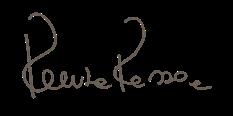
2023 Sustainability Report 4
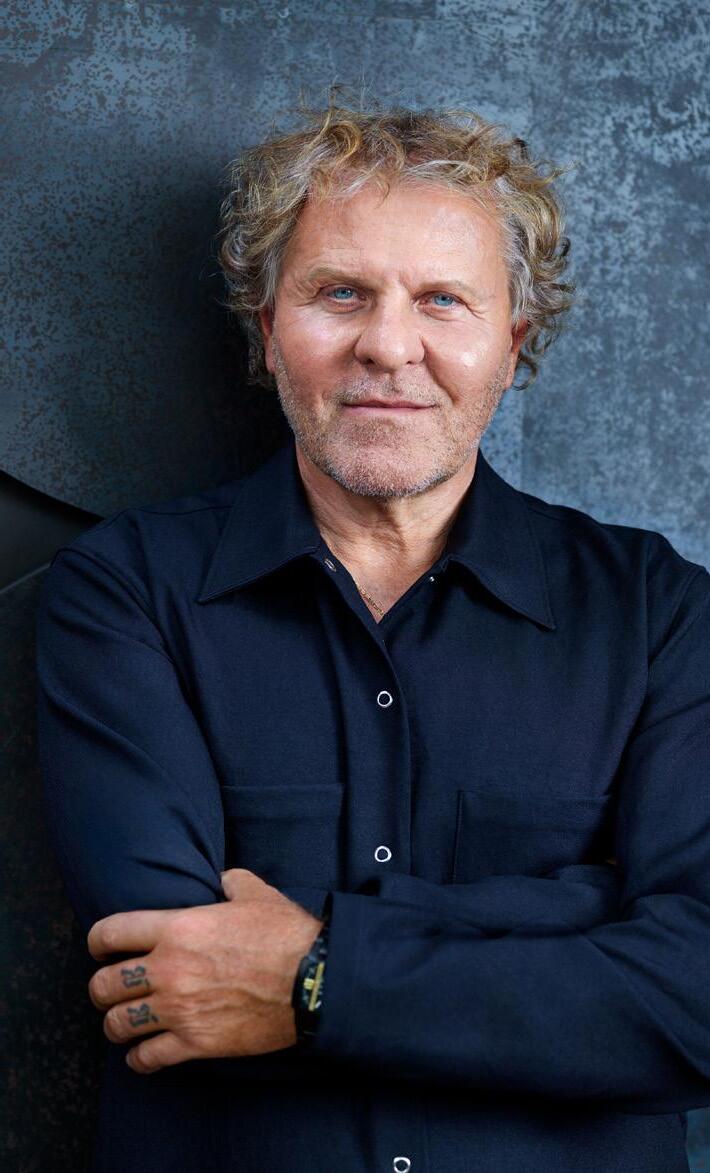
THE OTB GROUP IN 2023
7
Group Brands and Production Hubs
1.9 Billion €
100+ Countries in which the Group sells goods and services
348
Turnover as at 31.12.2023 Million € EBITDA
1.8 Billion €
Revenues from the sale of goods and services (excluding royalties)
610
25 Mono-brand stores directly managed by OTB
140
201 Countries in which the Group is directly present
Million € Net investments
HIGHLIGHTS
ENHANCING LOCAL SUPPLIERS AND MADE IN ITALY
78%
Suppliers based in Italy (+7 percentage points compared to 2022)
65 Suppliers active in the C.A.S.H. Project to support the supply chain
64%
Local suppliers (+7 percentage points compared to 2022)
90%
Percentage of credit assigned by suppliers through the C.A.S.H. project.
1. This number refers to countries where the Group is present with its legal entities or local branches, mono-brand retail stores, outlets or logistics hubs. The countries where the Group's legal entities are under liquidation have not been considered. Including Franchising, the number of countries rises to 138.
2. “Local suppliers” refers to suppliers located near the main OTB Brand sites. Including the Group's luxury segment suppliers based in Italy, the percentage rises to 85%.
6
2 1
Million € EBIT
CONSUMPTION AND EMISSIONS IN 2023
56.3%
Electricity in internal operations from renewable sources, global perimeter (+4 percentage points compared to 2022)
99.4%
Electricity in internal operations from renewable sources, European perimeter, directly operated sites
-2.3%
Reduction in Scope 1, Scope 2 market-based and Scope 3 emissions compared to 2022
-19.2%
Reduction in direct emissions (Scope 1 and Scope 2 market-based) compared to 2019
HIGHLIGHTS
PEOPLE
Gender equality certification
OTB and Diesel obtain certification under Italy’s National Recovery and Resilience Plan.
6,751
54% Employees Women in managerial positions
+350
Social projects supported by the OTB Foundation
350,000
People helped with the support of the OTB Foundation
2023 Sustainability Report 7


THE OTB GROUP
1
1
THE OTB GROUP
OTB, an acronym for “Only The Brave”, is a diversified international fashion group comprising the iconic brands Diesel, Jil Sander, Maison Margiela, Marni and Viktor&Rolf (hereinafter also “the Brands”), a minority shareholding in the American brand Amiri and two important production companies: Staff International and Brave Kid (hereinafter also “the Production Hubs”). The Group also promotes non-profit activities through the OTB Foundation.
OTB believes in pushing beyond the frontiers of fashion and style by fostering the creativity of international talents and expressing the innovative spirit and uncompromising bravery of its founder and Chair Renzo Rosso. With approximately 7,000 employees worldwide, the Group is distinguished by its digital approach centred on the consumer, its concrete long-term commitment to the creation of a responsible business, and its close attention to social issues, which it also follows through the OTB Foundation.
The Group's internationally recognised Brands embrace the expertise of tradition while integrating innovation and responding to the needs of new generations of consumers.
2023 Sustainability Report 10 The OTB Group
The OTB Brands

The OTB Foundation
2023 Sustainability Report 11 The OTB Group
The OTB Production Hubs
OTB’s innovation centre
Since its creation in 1978, DIESEL has positioned itself as a real alternative to traditional luxury. Diesel injects its creative energy into everything it makes: a range of products that includes denim, ready-to-wear clothing, accessories, fragrances, interior design, automotive and beyond. An extremely high level of innovation, especially in denim, is a fundamental value for Diesel, together with its respectful vision of people and the environment. Diesel is the creative engine of new generations, translating the world’s social cultures into unique products and experiences: For Successful Living
Despite its growth, Diesel has retained its original philosophy: a brand standing for passion, individuality and self-expression, incentivising inclusivity and sociality and promoting a lifestyle of optimism, imagination, innovation, provocation and, above all else, fun.

MAISON MARGIELA is a Parisian haute couture house founded in 1988 by Belgian design Martin Margiela on the principles of non-conformity and subversion of norms. Under the creative direction of John Galliano, traditional dress codes are inverted and redefined in an analytical wardrobe for the digital age. Driven by instinct, Maison Margiela is devoted to uncompromising creativity invigorated by values of authenticity, radicality and self-expression. Maison Margiela’s distinguishing elements, notably its blank, white label with four stitches, its numerical code and the use of brush-stroked white paint, continue to represent the Maison’s signature today.

JIL SANDER is the essence of modernity and sophistication. Its unconditional dedication to design combines elegance and purity with innovative materials and exceptional quality. The refinement of the cuts, the play of contrasts and the perfection of the details create an approach to style characterised by the utmost care, precision and craftsmanship. Under the creative direction of Lucie and Luke Meier since 2017, the Milanese brand embraces the modern concept of luxury, integrating essentiality with sensuality and artisanal techniques.

Innovative and multifaceted, Marni celebrates individuality through a rigorous yet disruptive language. Founded in 1994, Marni is recognised for its unique approach to the use of materials and colours, expressed through collections that enhance the authenticity of craftsmanship. The Brand’s aesthetic approach reflects the vision of creative director Francesco Risso: Marni’s eccentric elegance offers a range of possibilities, an exploration of ideals, a forward-looking lifestyle in constant contact with the world of art and a community of talents from many different background, achieving its highest expression in special collaborations and capsule collections.
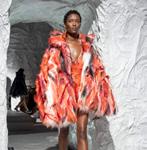
VIKTOR&ROLF is an avant-garde luxury fashion house founded in 1993 by fashion artists Viktor Horsting and Rolf Snoeren. Widely recognised and respected for its provocative haute couture and conceptual glamour, Viktor&Rolf aspires to create spectacular beauty and unexpected elegance through an unconventional approach to fashion.

12
2023 Sustainability Report
BRAVE KID is a company that researches, develops, produces and distributes ready-towear collections and accessories for children. Its portfolio of licensed brands currently includes Diesel, Marni, Dsquared2, N°21, MM6 - Maison Margiela , MYAR and Max&Co. The bravekid.com website is the online reference for luxury clothing with a truly unique style for kids, children and babies.

STAFF INTERNATIONAL specialises in research, product development, production and global distribution of ready-to-wear collections, bags, footwear and accessories. Most of its products bear the Made in Italy logo, the symbol of quality and excellence. Currently, Staff International acts as an industrial platform for some of the OTB Brands, including Maison Margiela and its MM6 contemporary line, and the Marni and Jil Sander ready-to-wear and bags, footwear and accessories collections. At the same time, the company works on an exclusive worldwide basis with Dsquared2 on research, product development, production and omni-channel distribution of its clothing collections. Its footwear, bags and small leather goods division also handles product development for the Diesel Brand.

BVX, Brave Virtual Xperience, is OTB's centre of excellence, led by Stefano Rosso, dedicated to the development of products, projects and experiences for the virtual world or metaverse. BVX's mission is to develop new forms of interaction with end customers to enhance their engagement through digital product offerings, with a particular focus on NFT and gaming.


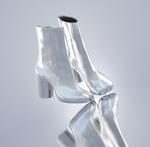
OTB FOUNDATION was established in 2006 as the OTB Group’s non-profit organisation. Its mission is to take swift and constructive action in emergency situations, guaranteeing equal opportunities and inclusion. The Foundation’s projects are selected according to specific criteria: innovation, direct social impact and long-term sustainability.
To date, it has invested in more than 350 social development projects in Italy and around the world, which have had a direct impact on the lives of around 350,000 people. The Foundation guarantees that all the funds it raises go directly to the beneficiaries, without being side-tracked.
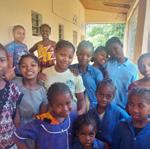
2023 Sustainability Report 13
The OTB Group
THE OTB TIMELINE
1978
Renzo Rosso establishes the Diesel Brand, acquiring full ownership in 1985. He begins working immediately with a team of stylists to turn Diesel into a global fashion icon. In the early 1990s, Diesel begins opening stores around the world.
1984
Renzo Rosso establishes Dieselito, later named Diesel Kid, to produce children’s clothing. Over time, Diesel Kid comes to manage licences of other brands.
2000
Renzo Rosso acquires Staff International, which, under license, creates, produces and distributes the collections of international brands with a predominantly Made in Italy supply chain of excellence.
2002
Renzo Rosso establishes Only The Brave as the holding for all the fashion companies in his portfolio, later changing its name to OTB. That same year Only The Brave acquires Maison Margiela.
2006
Formation of the Only The Brave Foundation
2008
Only The Brave acquires Viktor&Rolf
2012
Diesel Kid becomes Brave Kid and over the following years consolidates its children’s clothing development and distribution business through a series of agreements and licensing contracts with brands including Diesel, MM6, Maison Margiela, Dsquared2, Marni, N 21, Myar and Max&Co.
The Only The Brave Group is renamed OTB.
2013
Staff International launches the C.A.S.H. project (Credito Agevolato - Suppliers’ Help), which guarantees Italian suppliers easier, faster and more favourable access to credit.
OTB acquires a majority stake in Marni and becomes its sole shareholder in 2015.
14
2019
OTB acquires a minority stake in Amiri
2021
OTB acquires Jil Sander
OTB establishes Brave Virtual Xperience (BVX), a company entirely dedicated to the development of projects, content and products for the virtual gaming world.
Together with Prada Group, LVMH and Cartier (Richemont Group), OTB sets up the AURA Blockchain Consortium to develop and consolidate new standards in innovation, transparency and blockchain technology for the luxury industry.
OTB launches the “Be Responsible. Be Brave.” Group Sustainability Strategy.
OTB joins the ZDHC (Zero Discharge of Hazardous Chemicals) programme for the elimination of hazardous chemicals from the fashion industry.
OTB becomes a member of LWG (Leather Working Group), an internationally recognised reference standard for the leather manufacturing industry.
2022
OTB obtains a credit line tied to ESG objectives from Banca Intesa.
OTB promotes the creation of the Re.Crea Consortium with Prada Group, Dolce&Gabbana, MaxMara Fashion Group, Moncler Group and Ermenegildo Zegna Group, and assumes the vice-presidency. The Consortium aims to respond to the European Directive on Extended Producer Responsibility for textile waste and promote research and development into innovative recycling solutions.
OTB joins The Fashion Pact, the global coalition of companies working together to share best practices and find new solutions to reduce the environmental impact of the entire fashion industry.
OTB publishes the first Group Sustainability Report. The report covers financial year 2021 and includes the calculation of the 2019, 2020 and 2021 Carbon Footprints.
2023
The C.A.S.H. project marks its 10th anniversary OTB acquires a majority stake in Frassineti, the historic Florentine leather goods atelier, previously a Group supplier.
OTB launches the M.A.D.E. Made in Italy, Made Perfectly project, presenting a campaign to showcase the Italian fashion and luxury supply chain that involves the OTB Group’s top suppliers.
OTB inaugurates the new Maison Margiela Headquarters in Place des Etats-Unis in the Chaillott district, located in Paris’ 16th arrondissement. The new building hosts the Brand’s offices, atelier and showroom.
OTB and Diesel obtain Gender Equality Certification under Italy’s National Recovery and Resilience Plan.
OTB receives approval for three ambitious emissionreduction targets from the Science Based Targets initiative (SBTi)
OTB publishes its second Group Sustainability Report covering financial year 2022.
OTB approves the Group’s new impact materiality analysis
2023 Sustainability Report
1.1 BE BRAVE: MISSION AND VALUES
“Building not the biggest, but the most alternative fashion Group”3 is the mission that OTB Chair Renzo Rosso has given the Group, whose founding values are courage, respect, excellence and evolution.
The OTB Group promotes the sustainable development of successful businesses for all its member companies and helps its talents turn ideas into distinctive creations for unconventional, forward-thinking individuals.
This vision is put into practice through the pursuit of the following objectives.
BUILDING BRANDS: OTB helps the Group’s Brands and Companies develop successful businesses, enhancing the uniqueness and distinctive features of each one.
BOOSTING GROWTH: OTB provides the Brands and Companies in its portfolio with expertise, tools and services to facilitate growth.
CHALLENGING THE RULES: by encouraging a bold alternative approach to fashion and business, OTB constantly questions established rules to deliver unconventional, forward-thinking projects and strategies.
FOSTERING CREATIVITY: creativity is the driving force and the heart of the Group’s activities. OTB is committed to discovering and supporting brave, one-of-a-kind talents.
3. Quote from OTB Chair Renzo Rosso.
2023 Sustainability Report 16 The OTB Group

1.2 THE OTB GROUP VALUE CHAIN
The fashion industry’s value chain is highly articulated, with a large number of players and stakeholders operating at various levels and in the different processes involved in the creation and development of products and services.
Product design and development
Product design
Trend analysis
Design and development of the sample collection
Testing and improvement
Procurement of raw materials (Industrialised)
DIRECT PHASE
Managed directly by the Production Hubs and OTB Brands
Production of raw materials
Cultivation
Breeding
Production of synthetic fibres
Production of recycled materials
Raw material processing
Fibre processing
Textile treatments
Packaging processing
Including: ginning, spinning, weaving, treatments, dyeing, finishing.
UPSTREAM STAGES
Outsourced by OTB's Production Hubs and Brands
Outsourced by OTB's Production Hubs and Brands
Product design and development. Product design is entrusted to the Creative Directors and Style Offices of the OTB Brands. In cooperation with the Production Departments, the R&D Offices then develop prototypes and samples, which undergo specific quality and durability tests and inspections before work can begin on the development of the collections as a whole.
Production of raw materials. This stage comprises the upstream activities in the OTB value chain: cultivation of natural fibres, animal husbandry, extraction of polymers for the production of synthetic fibres and processes to obtain recycled materials. The Group commits to purchase low climate impact materials and materials that respect animal welfare.
Raw material processing. The raw materials are transformed into fabrics and accessories that make up the products of each collection. This stage involves a range of processes, such as ginning, spinning, weaving, treatments, dyeing and finishing, where the Group cooperates with expert suppliers with excellent know-how.
Production and assembly. The semi-finished materials from the previous stages are transformed during the manufacturing and assembly stages into finished products, with the possible addition of appliqués, details, embroideries and prints. Production and assembly activities are managed by the Production functions of the different Brands of the Group.
2023 Sustainability Report 18 The OTB Group
Production and assembly Commercialised products Industrialised products
In measuring and managing its economic, environmental and social impact, the OTB Group considers all its business relationships along the value chain and the full life cycle of the products it brings to market. The stages of the value chain include: product design and development, production, from fibre processing to the finished garment, distribution and after-sales activities, including end-of-life management of garments and accessories.
Distribution
Main distribution channels:
Direct channels
• Retailers
• Sales outlets
• Online
Indirect channels
• Wholesale
• Distributors
• Travel retail
Use and care of products
End consumer
The Brands interface with end consumers through the CRM system, personal assistance in stores and their social channels
Management of end of life
Recycling Management
Waste disposal
Also through transparent labelling and communication
DIRECT PHASE
Managed directly by OTB's Production Hubs and Brands
DOWNSTREAM STAGES
Partly managed directly by the OTB Brands
Distribution. Distribution is the responsibility of the OTB Logistics Department, which handles the receipt and storage of finished products, the customer order allocation, the picking and transportation from the suppliers to the warehouses (directly or indirectly depending on specific agreements). The Logistics Department also organises distribution to the direct sales channels – retailers, outlets and e-commerce – and the indirect channels – wholesales, distributors and travel retails – as well as product transportation from retailers and outlets to warehouses.
Partly managed directly by the OTB Brands
Use and care of products. This stage includes activities aimed at extending the product life cycle. To encourage people to care for their clothes, the Brands of the OTB Group advise their customers on practices to ensure prolonged products use. Various communication channels are used for this purpose, such as direct assistance at the time of purchase, the Customer Service Department or the website.
End-of-life management. The Brands of the Group are becoming more proactive in identifying initiatives for product end-of-life management, including customers involvement. In this regards, the OTB Group also promotes the reuse and recycling of warehouse inventories through specific projects and discussions with other players in the fashion industry.
2023 Sustainability Report 19 The OTB Group
1.3 MARKET PRESENCE
The OTB Group organisation structure consists of the Parent Company, which acts as the holding and provides intragroup services, the headquarters of the Brands and Production Hubs, and the distribution branches located around the world.
OTB’s Brands are present worldwide through direct and indirect channels. The direct channels consist of mono-brand stores, outlets and e-commerce sites, while indirect distribution is organised through wholesale channels: multi-brand stores, shops-in-shop in department stores, travel retailers and other physical retailers, and multi-brand online distributors. The Group also generates royalties revenues from brand licensing agreements with third parties for specific merchandise categories.
In 2023, the number of OTB Group mono-brand stores rose to 610 directly operated retail stores.
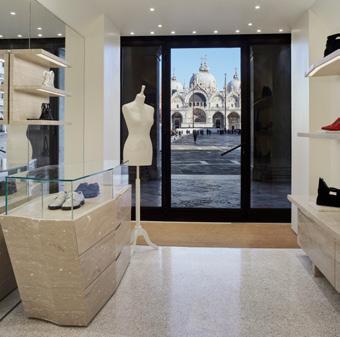
2023 Sustainability Report 20 The OTB Group
Direct mono-brand distribution network (no.) 2021 2022 2023 Italy 49 48 51 EMEA (excluding Italy) 203 182 134 America 54 61 66 APAC (excluding Japan) 76 101 146 Japan 215 215 213 Total 597 607 610
1.4 FINANCIAL INFORMATION
FINANCIAL HIGHLIGHTS (in millions of Euro)
1,867.7 TOTAL REVENUES
349.4*
EBITDA (STATUTORY)
139.9 EBIT
1,777.9
REVENUES FROM SALES OF GOODS AND SERVICES
201.0
NET INVESTMENTS
60.3
NET FINANCIAL POSITION
* (Editor's note; differs from the management figure value due to accounting reclassifications)
During 2023, OTB's net sales reached EUR 1,777.9 million, compared to EUR 1,632.9 million in the previous year. Of the total amount, EUR 923.9 million arose from direct channels (retail, outlets, online), and EUR 854.0 million from indirect channels. The year-on-year increase of 8.9% was driven by increased sales in direct channels, the positive performance of the luxury brands and the turnaround of Diesel.
The geographical breakdown of revenues from sales and services, which include net sales and revenues from royalties, was as follows (amounts in millions of Euro):
2023 Sustainability Report 21 The OTB Group
(in thousands of Euro) 2023 2022 variation Revenues from sales of goods and services 1,765,800 1,624,062 141,738 Revenues from other sales 12,082 8,843 3,239 Revenues from sales 1,777,882 1,632,905 144,977 Royalties 39,820 43,937 (4,117) Revenues from sales and services 1,817,702 1,676,842 140,860
Italy Rest of Europe APAC (excl. India) Japan America Rest of the world (incl. India) Total Revenues 344.1 503.6 251.6 410.7 203.1 104.6 1,817.7 % of revenue 18.9% 27.7% 13.8% 22.6% 11.2% 5.8% 100.0%
All the regions reported steady growth, with particularly strong performance in the APAC (Asia-Pacific) region, which played a significant role in driving the Group's overall growth. The Japanese market maintained its key position, accounting for 22.6% of total business.
Direct channel sales accounted for 52% of total sales, compared to 46.6% the previous year. Retail sales showed significant growth of 25.5 % over 2022, due to increased sales in existing stores and new openings. Online sales consolidated their importance, with a 20.3% improvement from 2022. Revenues from royalties amounted to EUR 39.8 million.
Group EBITDA was EUR 349.4 million, with an EBITDA margin of 18.7%. EBIT was EUR 139.9 million, with an EBIT margin of 7.5%. Profit for the year was EUR 90.4 million.
The Group's total investments amounted to EUR 206.0 million, as follows: (amounts in millions of Euro)
11.3
INTANGIBLE FIXED ASSETS
189.7
TANGIBLE FIXED ASSETS
5.0
ENLARGEMENT OF THE REPORTING SCOPE
In particular, investments in tangible fixed assets included the purchase of the building housing the Maison Margiela headquarters in Paris, for a total of EUR 120.2 million. Investments in the other categories mainly related to the development of the retail network, with the opening of 76 new outlets in key markets such as China, Korea and the United States, as well as in Europe.
The Group’s net financial position was positive, at EUR 60.3 million.

2023 Sustainability Report 22 The OTB Group
The Group’s attention to responsible conduct is also reflected in the management of resources, through the generation and distribution of wealth among its stakeholders. Economic value generated by the OTB Group in 2023 amounted to EUR 1,860 million, an increase of 6.5% over the previous year. In parallel, economic value distributed by OTB rose by 7.9% to more than EUR 1,597 million. Specifically, 85.8% of economic value generated by OTB was distributed to internal and external stakeholders; the remaining 14.2% stayed within the Group.
94.7% of economic value distributed went to employees and suppliers, two stakeholder categories considered essential for the Group's success. Value distributed to the community increased by 51.0% in 2023 compared to the previous year, thanks to the continued commitment of the OTB Foundation and the financial support the Foundation receives from Group companies and external stakeholders.
2023 Sustainability Report 23 The OTB Group
Economic value generated and distributed (in thousands of Euro) 2021 2022 2023 Economic value generated by the Group 1,673,072 1,746,696 1,860,912 Revenues from sales of goods and services 1,449,110 1,621,224 1,765,800 Revenues from other sales 6,871 8,843 12,082 Other revenues 42,155 69,075 50,031 Royalties 31,591 43,937 39,820 Financial income 1,418 626 5,673 Equity investments 9,645 5,054 -1,712 Exchange-rate gains (losses) 2,050 -2,063 -10,782 Business combination 130,232 0 0 Economic value distributed by the Group 1,376,626 1,480,210 1,597,658 Economic value distributed to suppliers 997,856 1,076,024 1,148,986 Economic value distributed to employees 300,300 338,855 363,273 Economic value distributed to shareholders 37,227 34,785 42,721 Economic value distributed to public authorities 41,087 29,760 41,491 Economic value distributed to the community 156 786 1,187 Economic value retained by the Group 296,446 266,486 263,872 Provisions and impairment losses 7,229 6,103 4,848 Total deferred taxes -51 -11,950 -19,474 Depreciation and amortisation 167,810 187,313 209,503 Gains 121,458 85,020 68,995
ECONOMIC VALUE DISTRIBUTED BY STAKEHOLDERS
2.7% Shareholders
22.7% Employees
2.6% Public administration
0.1% Community
71.9% Suppliers
C.A.S.H. Project
During 2023, OTB continued its commitment to the C.A.S.H. (Credit Facilitated Suppliers' Help) project, launched in collaboration with the BNP Paribas Group, which is now in its tenth year. Thanks to this initiative, OTB's Italian suppliers are guaranteed a facilitated access to credit, with faster lead times and more favourable conditions.
Suppliers are selected on the basis of the quality and reliability of the services they offer, with the aim of supporting the entire supply chain and promoting the Made in Italy
The programme is also designed to improve suppliers’ financial position, raise their credit ratings and reduce net invested capital. Essentially, C.A.S.H. provides competitive factoring interest rates without recourse terms. In March 2022, the economic conditions were revised, with a 33% reduction in commission fees for suppliers.
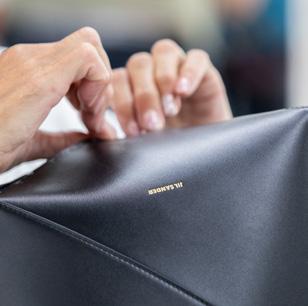
2023 Sustainability Report 24 The OTB Group
Since the first agreement signed by Staff International in 2013, the number of suppliers involved has steadily increased. To further extend support to the entire Group supply chain, the programme was expanded in 2020 to include Diesel and Brave Kid suppliers. In 2023, it was activated for 65 suppliers4, representing 23% of the total cost of sales of Italian strategic suppliers, in line with the previous year. Through the programme, suppliers covered 90% of their invoices. The project involves micro enterprises (41%), small companies (37%) and medium-sized companies (22%)5
Since the C.A.S.H. project was set up, a total of around EUR 550 million has been discounted, highlighting the growing importance of OTB's support for local craftsmanship and for Made in Italy, and helping to consolidate a closer and more robust relationship between the Group and its supply chain.
IMPACT GENERATED BY THE OTB C.A.S.H. PROJECT
65 active suppliers representing
23% of the total cost of sales based in Italy from strategic suppliers.
These suppliers discounted
90% of their credits through theproject.
4. Although the overall number of suppliers was unchanged from the previous year, several companies left the programme due to termination of their agreements with the Group or long-term non-use of the service and a number of new suppliers joined.
5. The companies are classified as micro, small, medium and large, based on the revenue criterion established by the European Union. Supplier turnover refers to 2022.
2023 Sustainability Report 25 The OTB Group
project 1 36
of suppliers taking part in the C.A.S.H. project
Number
1.5 FISCAL RESPONSIBILITY
The Group’s fiscal operations guarantee full conformity to national and international laws and with the top industry compliance standards. Management of taxes and fiscal risk is aligned with the Group’s strategic and commercial objectives and with the principles of honesty, integrity and fairness set out in the Code of Ethics. The Group also works to build transparent collaborative relations with the tax authorities and with third parties.
Transparency in accounting is ensured by the principles of truth, accuracy, completeness and reliability in documents, management operations and the related accounting records. The information in the Group’s accounts must be correctly reflected in its tax returns to create a proactive relationship with the State Administration and the Tax Authorities.
Due to operational requirements and business objectives, the OTB Group has a direct presence with local offices in the main countries in which it operates. In this context, it should be noted that tax regulations may differ from those applied in the country where the Group headquarters are located; to mitigate the risks associated with the interpretation of different tax regulations, OTB has proactive contacts with stakeholders, and the support of qualified tax advisors in each country of operation.
Management of Group tax matters involves a number of entities and functions: the OTB Tax Department, which is responsible for the development of fiscal strategy for the entire Group, the Financial Division and the Tax Departments of the subsidiaries in each country where the Group is present.
Specifically, the Parent Company's Tax Department, headed by the Group Tax Director, deals with the following areas:
• Risk management: in collaboration with the OTB Corporate Governance & Internal Audit Department, the Tax Department defines measures for the implementation of the Tax Control Framework (TCF). The Group is taking steps to strengthen its tax risk control system by providing a consistent and uniform guidance on risk management, and ensuring timely risk identification and effective measurement in different countries.
• Compliance management: in collaboration with the Statutory & Tax Reporting A&F Shared Service Centre Department, the Tax Department is responsible to ensure compliance with Italian direct and indirect tax regulations, including computation of taxation and preparation of tax returns.
• National taxes: the Tax Department manages and coordinates tax benefits and audits by the Tax Authorities.
• International taxes: the Tax Department supports the branch financial managers on fiscal matters and provides central management and coordination of transfer pricing and other tax issues relating to cross-border transactions, extraordinary transactions and related audits by local tax authorities. The Tax Department takes all the necessary measures to monitor and manage compliance with the BEPS (Base Erosion and Profit Shifting) project and the new OECD tax regulations.
2023 Sustainability Report 26 The OTB Group
All intragroup transactions are based on a transfer pricing policy aligned with the Arm’s Length Principle, the international standard set out by the Model Tax Convention and referenced by the OECD Guidelines on transfer pricing for multinationals and tax authorities. For correct assessment of tax risks, if necessary the Group draws up Advance Pricing Agreements (APAs) with local tax authorities to establish the criteria to be used to determine transfer prices.
OTB has direct operations in 256 countries with 67 subsidiaries and 12 permanent organisations (excluding the OTB Foundation and the minority interests in the MIP Graduate School of Business and the Atelier Luxury Group LLC). Each country has its own tax laws and tax assessment procedures. This means that tax rules or tax rates could differ for each company within the Group. Group taxation is subject to amendments as a result of changes in the regulations in the countries where the Group operates and in the earnings of the individual companies in their respective countries.

6. This number refers to countries where the Group is present with its legal entities or local branches, mono-brand retail stores, outlets or logistics hubs. The countries where the Group's legal entities are under liquidation have not been considered.
2023 Sustainability Report 27 The OTB Group
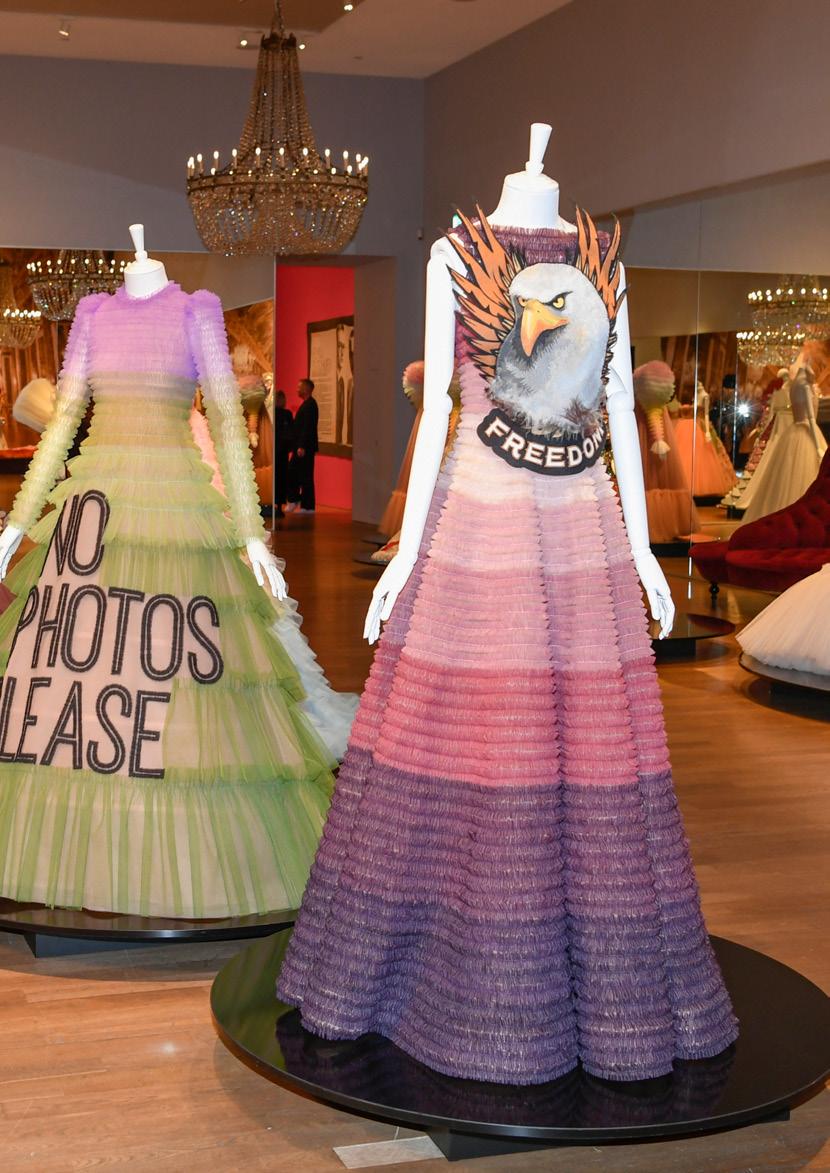

BE RESPONSIBLE BE BRAVE
2
BE RESPONSIBLE. BE BRAVE.
2
2.1 THE OTB SUSTAINABILITY VISION
The “Be Responsible. Be Brave.” Strategy defines the OTB Group’s short, medium and long-term environmental and social sustainability goals, focusing on the impacts generated and experienced along the entire value chain. It also incorporates the United Nations 2030 Agenda's Sustainable Development Goals (SDGs).
Specifically, the Sustainability Strategy is based on three pillars: The New Fashion System, Protecting Our Planet and Brave Together, each of which encompasses specific measurable targets related to the material topics of the OTB Group. 7

THE NEW FASHION SYSTEM
This pillar defines the OTB Group's commitment to the development of an increasingly responsible fashion industry, paying attention to both environmental and social impacts along the entire value chain. Innovative product design, the adoption of circular business models, the search for alternative materials, the use of increasing proportions of recycled and certified fabrics and the improvement of garment durability are just some of the initiatives taken to contribute to a tangible reduction in the impact generated by the Group. OTB is also committed to promoting the respect of human rights, appropriate working conditions and fair wages along the supply chain, and to improving traceability.
The activities in this pillar are related to the following SDGs: 5, 8, 9, 12, 13 and 15.
PROTECTING OUR PLANET
This pillar sets out OTB's commitment to the protection of the environment and ecosystems by reducing the Group’s greenhouse gas emissions, preserving biodiversity, protecting the oceans and developing a responsible water stewardship and chemical management system. As part of its fight against climate change, the Group has set itself ambitious targets, including Net Zero greenhouse gas emissions by 2050, in line with the Paris Agreement. To fulfil this and other commitments, the Group companies are working together to implement an effective decarbonisation strategy.
The activities in this pillar are related to the following SDGs: 13, 14 and 15.
BRAVE TOGETHER
This pillar defines the OTB Group's commitment to building a system of governance and stakeholder relations based on transparency, ethics and respect for people. The Group ensures open and inclusive working environments that promote lifelong learning, respect for diversity, gender equality and employee well-being. Furthermore, through the OTB Foundation activities and partnerships, the Group is active in creating a positive, concrete and long-term social impact in local communities and areas of the world in emergency situations.
The activities in this pillar are related to the following SDGs: 1, 2, 3, 4, 5, 8, 10 and 17.
7. See "The materiality analysis process” section for a list of material topic.
2023 Sustainability Report 31 Be Responsible. Be Brave.

SUPPORTING THE SDGS
The table below shows the Sustainable Development Goals (SDGs) referenced by the pillars of the OTB Strategy.













THE NEW FASHION SYSTEM
Responsible sourcing and traceability
Sustainable design and circularity
Fair wages and welfare in the value chain
Customer experience, brand awareness and reputation
P R O T E C TIN G OU R P L ANE T
Climate strategies
Protection of the oceans
Water stewardship and chemical management
Biodiversity
BRAVE TOGETHER
Responsible governance and ethical business
Social impact
Diversity, equality and inclusion
Employee well-being, health and safety
Talent a raction and retention
2023 Sustainability Report 32 Be Responsible. Be Brave.
Activities in which the OTB Group organises internal initiatives or projects Activity related to the OTB Group Core Business Type of contribution:
FOR RESPONSIBLE LIVING: THE DIESEL SUSTAINABILITY STRATEGY
"Sustainability is not just a department, it is a mindset that needs to be implemented by each one of us. Fortunately, at Diesel we have a natural curiosity and a common approach to finding solutions to environmental and social questions relating to what we do."
A. Rosso, Diesel Sustainability Ambassador
Diesel was born to be the alternative: the alternative to luxury, and the alternative to classic five-pocket jeans. The Brand has always used its marketing campaigns to raise public awareness on environmental and social questions. In 2019, it decided to apply its non-conformist spirit and passion for sweeping change to offer new solutions to the conventional practices of the fashion industry based on innovative tools designed to establish a circular business model and low-impact products. The aim is to present a brand and products made not only For Successful Living, but also For Responsible Living, an invitation that has become the actual name of the Diesel Sustainability Strategy. The goal is to integrate sustainability into Diesel’s strategic decisions and daily activities and draw up a plan of initiatives it intends to carry out in the interest of current and future generations. As part of its For Responsible Living strategy, Diesel has set targets and planned action to improve its sustainability performance and contribute to a positive impact in the fashion industry. The Strategy was officially launched in January 2020 and is structured around four pillars:
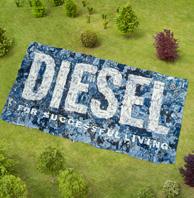
BE THE ALTERNATIVE: Diesel is committed to creating alternative products and packaging, using low-impact materials and investing in innovation and collaboration at every step in the value chain.
STAND FOR THE PLANET: Diesel is committed to protecting the environment and climate by reducing its greenhouse gas emissions and water footprint, and improving re-use and recycling rates in all its operations.
CELEBRATE INDIVIDUALITY: Diesel is committed to developing a sustainability culture inside the company that respects employees’ rights and enhances their diversities, by treating everyone equally and nurturing them to fulfil their potential and by promoting a safe and inclusive work environment.
PROMOTE INTEGRITY: Diesel is committed to maintaining the highest social and environmental standards throughout the value chain by improving product traceability and promoting positive supplier practices, while guaranteeing transparency.
In the first three years since the launch of the Strategy, Diesel achieved important results for each one of its four strategic pillars, as detailed in the OTB 2021 and 2022 Sustainability Reports. During 2023, Diesel continued to work to achieve its sustainability goals in line with the For Responsible Living and Be Responsible. Be Brave. Strategies. Further details are provided later in this Report.
2023 Sustainability Report 33 Be Responsible. Be Brave.
2.2 THE MATERIALITY ANALYSIS PROCESS
In 2023, OTB updated its materiality analysis, in line with the latest 2021 GRI Universal Standards in order to identify the most significant topics for the Group, and the related impact analysis8 focused on the current and potential positive and negative impacts on the economy, society (including human rights aspects) and the environment that the organisation generates, contributes to, or could be directly linked to, along the entire value chain.
The analysis process was coordinated by the Corporate Sustainability Department, involving top management, relevant corporate functions and specific external stakeholders. It consisted of five main stages:
1
Analysis and understanding of the context
2
Identification of the impacts
3
Evaluation of the materiality of the impacts
4
Definition of material topics based on the significance of the impacts
1. Analysis and understanding of the organisation and context.
5
Final approval by the Board of Directors
In order to identify current and potential impacts, an in-depth analysis of the business model and corporate structure was conducted, including relationships with partners along the value chain. In addition to the analysis of internal Group documents, external sources such as research papers, publications, reporting standards (such as SASB, S&P), rating agencies and industry associations, benchmark analyses with reference to peer companies and shared best practices were also analysed, to understand all the possible impacts relating to the fashion system.
2. Identification of the impacts
In the second stage of the process, 97 current and potential, negative and positive impacts that OTB Group operations generate or could generate on the external environment and people were mapped, considering the entire value chain.
3. Evaluation of the materiality of the impacts
For each identified impact, a preliminary assessment was carried out involving multiple corporate functions, each for its area of responsibility. The impact assessment criteria were: scale, scope, irremediability (for negative impacts only) and likelihood. The assessment produced a short list of the most significant impacts. The 30 identified impacts were then grouped into 13 topics, prioritised by the top management and external stakeholders through specific questionnaires. The top management evaluation was carried out after a focus group. A number of significant external stakeholder categories were then involved through an online questionnaire, including suppliers, financial institutions, customers, public authorities, NGOs and various other organisations and bodies.
8. The methodological approach also followed the guidelines defined by the European Sustainability Reporting Standards 2023 published by the European Commission in July 2023.
2023 Sustainability Report 34 Be Responsible. Be Brave.
4. Definition of material topics
Finally, the topics were prioritised after integrating the results of the preliminary assessments, the top management assessments and external stakeholder evaluations, to determine the material topics for the Group.
5. Final approval by the Board of Directors
The matrix obtained in this way was presented to the Board of Directors for final approval.
The table below shows the OTB Group’s 13 material topics approved by the Board of Directors in December 2023, grouped with reference to the pillars of the Sustainability Strategy9:
THE NEW FASHION SYSTEM
Responsible sourcing and traceability
Sustainable product design and circularity
Fair wages and wellbeing along the Value Chain
Customer experience, brand awareness and reputation
PROTECTING OUR PLANET
Climate strategy
Protecting oceans
Water stewardship and chemical management
Biodiversity
9. The topics for each pillar are not shown in order of priority
BRAVE TOGETHER
Responsible governance and ethical business
Social impact
Diversity, equity and inclusion
Well-being, health and safety of employees
Talent attraction and retention

2.3 STAKEHOLDER ENGAGEMENT
Stakeholder relations play a key role in reaching sustainability goals, creating long-term value and achieving adequate economic performance.
Active, open and continuous interaction with stakeholders provides the Group with important feedback on the most critical priorities and questions to be taken into account in the development of OTB's strategy. The Group approach enhances each function, which manages relations with stakeholders individually, both at local and global level. Some stakeholders are engaged by the entire Group, in other cases they are directly involved by individual Brands and Departments.
The table below shows the main stakeholders, communication channels and engagement tools:
Stakeholders Communication tools and channels
Customers Direct relationship with sales staff
• E-mails and newsletters
• Online chat and phone
Social media
• Online questionnaire
Employees Internal channels
• Meetings and events
• Corporate TV
• Newsletters and e-mails
• Continuous feedback
Training sessions and digital courses
• Whistleblowing channels
• Activities of the OTB Foundation
Suppliers
• Supplier Code of Conduct
• One-to-one meetings
Daily activities
• On-site and institutional visits
• Surveys
Local community
• Activities of the OTB Foundation
• Press releases
• Dialogue with local associations and NGOs
• Meetings and round tables with public authorities
• Newsletters and social media
Stakeholder expectations
Product safety
• Product quality and durability
• Product traceability
Diversity, inclusion and respect for all body sizes
• High-level services
Training and career development
• Diversity, equality and inclusion
• Well-being and work-life balance
Benefits and welfare initiatives
• Compliance with policies and codes
Safe working environment
• Reduction of environmental footprint
• Fair wages and working conditions
• Whistleblowing channel
• Quality and safety
• Fair payment terms
Long-term relationship
• Responsible purchasing practices
• Support for local communities
• Diversity, equality and inclusion
• Reduction of environmental impact
• Ethical, social and environmental practices
2023 Sustainability Report 36 Be Responsible. Be Brave.
Stakeholders
NGOs and organisations
Financial institutions and shareholders
Public authorities
Communication tools and channels
• Institutional events
• Activities of the OTB Foundation
Participation in conferences and round tables
Institutional meetings
• Annual general meeting
• Daily dialogue
Institutional events and Institutional visits to Group premises
• Round tables and initiatives with institutions
Meetings with institutions and public authorities
• Interaction with industry associations
Activities of the OTB Foundation
Media
• Press releases and conferences
• Social media and official website
Media requests and interviews
• Interviews with senior management
• Corporate and Brand events, fashion shows
Stakeholder expectations
• Community partnerships
• Climate impact
Biodiversity
• Responsible procurement
• Fair wages and working conditions
Financial performance and longterm profitability
• Ethical business and governance
• Management of risks and opportunities
Full compliance with legislation
• Participation in projects of public utility
• Membership of leading national and international bodies, organisations and associations in the sustainability arena and in innovation in the fashion and luxury industry
• Public debates and contributions to key industry issues
• Italian excellence and promotion of Made in Italy
• Responsible communication
• News about the OTB Group, the Brands and the OTB Foundation
• Sustainability and innovation news relating to the OTB Group strategy
• Senior management’s views on the industry, the economic situation or related topics
• Transparent communication flows: timely and precise information disclosed on a regular basis
2023 Sustainability Report 37 Be Responsible. Be Brave.
2.4 COLLABORATIONS AND MEMBERSHIPS
The OTB Group recognises the importance of multi-sectoral collaboration to develop a more responsible fashion industry, in order to act together to enable the Fashion System to progress and evolve in this direction.
In this context, the OTB Group confirms its adherence to voluntary initiatives and organisations to promote a sustainable and coherent development path within each of its companies and units.
AURA BLOCKCHAIN CONSORTIUM
The OTB Group is a founder member of the Aura Blockchain Consortium together with: LVMH Group, Prada Group, Cartier and Mercedes-Benz, and is represented on the Consortium Board by Stefano Rosso, CEO of BVX and Chair of Maison Margiela.
The Aura Blockchain Consortium is a non-profit association, exclusive to luxury brands, created for the purpose of promoting socially responsible and customer-oriented business practices throughout the entire life cycle of luxury products. The platform promotes a global blockchain-based solution open to luxury Brands in any sector and region. Its aim is to accelerate the transition to circular business models, provide consumers with additional information, and improve transparency and product information.
OTB actively participates in developing projects and defining the strategic initiatives of the Aura Blockchain Consortium, encouraging participation by each Group Brand.
2023 Sustainability Report 38 Be Responsible. Be Brave.

LEATHER WORKING GROUP (LWG)
In 2021 the OTB Group joined the Leather Working Group (LWG), a non-profit organisation which has developed one of the leading environmental certifications in the leather manufacturing industry. The LWG was created to establish a protocol to assess the environmental compliance and performance of leather manufacturers by defining a ratings scale. Since 2005, it identifies environmental best practices in the industry and provides guidelines for continuous improvement. Its activities and tools focus on traceability in the supply chain, auditing, fight against deforestation and social responsibility. Through its companies, the OTB Group promotes cooperation with tanneries that are members of the Leather Working Group.
RE.CREA CONSORTIUM
In August 2022, the Re.Crea Consortium was established by the OTB Group together with Dolce&Gabbana, Max Mara Fashion Group, Moncler Group, Prada Group, Ermenegildo Zegna Group with the coordination of the Italian National Chamber of Fashion (CNMI), in response to the European Directive on “Extended Producer Responsibility for Textile Waste (EPR)” and to related national legislation. The Re.Crea Consortium is active in managing the end-of-life of textile and fashion products and promoting the research and development of innovative recycling solutions. Currently chaired by Carlo Capasa, President of the Italian National Chamber of Fashion, the Consortium is open to new memberships from key players in the fashion and Made in Italy segment, so as to further strengthen its impact.

THE FASHION PACT
Established in 2019 to reduce the industry's environmental impact, The Fashion Pact is a global coalition uniting leading fashion and textile companies, including suppliers, manufacturers, distributors and marketplaces. The companies involved, including Diesel from 2020 and the entire OTB Group since 2022, collaborate to share best practices and jointly identify innovative solutions to meet common goals, among them: mitigating global warming, restoring biodiversity and protecting the oceans
2023 Sustainability Report 40 Be Responsible. Be Brave.

SCIENCE-BASED TARGETS INITIATIVE

The global Science Based Targets initiative (SBTi) was created to address climate change issues and, specifically, to help companies achieve decarbonisation objectives such as: limiting global warming to +1.5 degrees Celsius compared to pre-industrial levels, promoting business innovation for process improvement by adopting low-carbon technologies, reducing business risks by setting sciencebased targets, and improving corporate reputation. In 2023, the OTB Group obtained approval for its reduction targets (see section on “Acting on Climate Change”).
ZERO DISCHARGE OF HAZARDOUS CHEMICALS FOUNDATION
In 2021 the OTB Group and its Brands joined the Zero Discharge of Hazardous Chemicals Foundation, an initiative promoted by the ZDHC organisation to reduce and eliminate the use of hazardous chemicals in the textile, clothing and footwear industries.
FOREST STEWARDSHIP COUNCIL®

The Forest Stewardship Council® is a non-profit international multi-stakeholder organisation set up in 1993 to promote the responsible management of forests globally through timber certification. In 2023, Diesel again confirmed its commitment to using FSC®-certified paper or cellulose materials for almost all of its B2B and B2C packaging.
2023 Sustainability Report 41 Be Responsible. Be Brave.


GOVERNANCE AND RISK MANAGEMENT
GOVERNANCE AND RISK MANAGEMENT
3
3
3.1 OTB GOVERNANCE
Governance is the system of rules, practices and processes that contribute to the proper, transparent and efficient management of the entire organisation. This is why it comprises many key elements, such as good business conduct based on the principles of integrity, integrated risk management, dialogue with Stakeholders, supply-chain management, and the ability to adapt to change.
The OTB Group has adopted a “traditional” corporate governance model, in compliance with Italian regulations, which is explained in more detail below.
Board of Directors
Governing body
The OTB Board of Directors (BoD) consists of the Chair, the Chief Executive Officer and four Directors. The BoD manages the company and oversees strategy, including questions concerning sustainability.
The BoD is responsible for planning Group strategy and for its operational and financial performance. It may delegate its powers to the Chair for ordinary and extraordinary decisions and to the CEO for day-to-day business administration. The Chair and the CEO are both legal representatives of the company. They preside over the activities of the Board of Directors and supervise the proper application of the Group procedures and policies.
The members of the BoD are renewed every three years according to objective and meritocratic criteria. For the independent Directors, a careful assessment is carried out to guarantee independence, as required by the Group regulation and by law. The members of the BoD come from diverse professional backgrounds, presenting a broad range of skills and ensuring a diversified approach to the management and supervision of business and sustainability strategies. To ensure the absence of grounds for incompatibility with appointment to the BoD, an internal procedure is used to manage relations with related parties.
The executive Directors are responsible for planning, directing and controlling the activities of the company. The independent Directors bring their expertise to board meetings, assisting an in-depth examination of the topics under discussion from an outside perspective and contributing to well-considered, informed decisions in line with the company's interests.
The BoD may delegate its powers to one or more of its members for the efficient management of economic, social and environmental questions, with the support of specific Group functions. Empowered directors are monitored on a continuous basis through regular reports.

2023 Sustainability Report 44 Governance and risk management
Rosso
Director Carlo Purassanta ≥50 Approval of 2023 Financial Statements
•
•
•
• Director Cristina Bombassei ≥50 Approval of 2023 Financial Statements
Director Arabella Ferrari ≥50 Approval of 2023 Financial Statements
Board of Statutory Auditors
Audit body
The Board of Statutory Auditors consists of the Chair, two standing statutory auditors and two alternate auditors. The Board’s main task is to monitor compliance with the law and the Statute, the effectiveness of the organisation structure, the administrative-accounting system and any other procedures or programmes set up to implement the rules established by the Group and the auditing of the accounts.
Independent auditing firm
Audit body
The independent auditing firm is an independent organisation that does not represent any majority or minority shareholders; its primary duty is to oversee the statutory audit of the accounts. The firm is proposed by the Board of Statutory Auditors and appointed by the Shareholders’ Meeting.
•
•
The Group organisation chart follows the principles of prudent management and risk reduction. To this end, the company has established a system of delegated powers to ensure the separation of tasks and regulatory compliance with Lgs. Decree 231/ 2001. The system assigns roles, tasks and responsibilities in a clear and precise manner, in order to prevent abuses of power and optimise decision-making procedures and accountability. The separation of tasks is also guaranteed by IT systems that enable only authorised roles to perform specific transactions, where necessary.
2023 Sustainability Report 45 Governance and risk management Office held Name and Surname Age range In office until Executive Independent Chair Renzo Rosso ≥50 Approval of 2023 Financial Statements
Chief Executive Officer Ubaldo
≥50 Approval of 2023 Financial Statements
Minelli
Financial
Director Stefano
30-50 Approval of 2023
Statements
3.2 SUSTAINABILITY GOVERNANCE
In order to integrate sustainability into its business strategies, the OTB Group has established a governance system designed to manage and coordinate specific sustainability initiatives in each business area, both at the Parent Company level and in its subsidiaries. OTB sustainability governance is led by the Chief Sustainability Officer (CSO), who coordinates the Group Corporate Sustainability Department and reports directly to the Chief Executive Officer.
The OTB Group's Corporate Sustainability Department is responsible for the definition, update and implementation of the Group Sustainability Strategy and related development plans. The Department coordinates and supervises procedures and activities relating to ESG issues that may affect the Group both at Parent Company level and its subsidiaries. To this end, the Department works closely with the other corporate functions to pursue the achievement of the Sustainability Strategy targets and improve the management of any social and environmental risks, and ESG performance.
Sustainability Professionals
Sustainability Professionals and Diesel Sustainability Ambassador
Corporate Sustainability Department
Sustainability Champions
2023 Sustainability Report 46 Governance and risk management
icer
icer
OTB Group Chief Sustainability O
OTB Group Chief Executive O

The OTB Group Sustainability function is structured as a “Professional Family10”. In Diesel, Staff International and Brave Kid, Sustainability Professionals are responsible for the implementation of sustainability initiatives in their respective companies. They report hierarchically to the Director of the function in which they are placed, but functionally to the OTB CSO.
In the case of OTB's luxury Brands, namely Jil Sander, Marni, Maison Margiela and Viktor&Rolf, the Group has appointed Sustainability Champions, who hold different roles in other functions and represent the main point of contact on sustainability issues within their respective organisations.
Moreover, at Diesel, in early 2020, together with the launch of the Strategy For Responsible Living, a Diesel Sustainability Ambassador was appointed in the person of Andrea Rosso, as the Brand's internal and external spokesperson. The creation of this professional figure contributed to the spread of a shared sustainability culture in Diesel, which then led to the launch of the For Responsible Living Ambassadors programme in 2022, whose goal is to create a global network of employees who facilitate communication and collaboration between central offices, local offices and stores around the world on sustainability topics.
Since 2021, the members of the OTB Board of Directors include Cristina Bombassei, Executive Director and Chief Corporate Social Responsibility Officer of the Brembo Group, a listed company and world leader in the design and production of braking systems. Cristina Bombassei is considered one of the leading authorities on sustainability in Italy and was appointed as an OTB Independent Director to support the Group on decisions concerning sustainability strategies, in line with market and key stakeholder requirements.
10. A set of specialised roles operating from different locations and organisational levels (Parent Company, Brand, Production Hub, individual legal entity, etc.), who share the same mission, specialist know-how, business processes, rules of conduct and the Group's professional values.
2023 Sustainability Report 47 Governance and risk management
3.3 ETHICAL COMMITMENT AND TRANSPARENCY
The Group is committed to conducting its business operations with integrity, requiring all parties to observe the highest ethical standards and to operate in strict compliance with national and international legislation, regulations and guidelines.
OTB has adopted policies and programmes, in order to equip the Group with guidelines and corporate procedures and ensure the compliance by all its entities. Specifically, it has introduced a Group-wide Code of Ethics, a Suppliers Code of Conduct, a 231 Model, a Related Parties Procedure and a Global Compliance Programme. These regulations and programmes comply with the most stringent standards and take into account of local laws.

CODE OF ETHICS
The OTB Group Code of Ethics sets out the values, principles and rules of conduct adopted by the Group to direct its business operations and manage relations with its internal and external Stakeholders.
The Code is uniformly applied in every country where the Group operates. It consists of three sections:
• general principles, which illustrate the fundamental values and regulations of the OTB Group corporate culture;
• standards of conduct, which highlight the rules of conduct to be followed and the ethics to be applied in business activities;
• rules for implementing and monitoring the Code of Ethics, which describe the control system for compliance with and continuous improvement of the Code.
The Code of Ethics is illustrated to Group employees at the time of recruitment and is available for consultation on the Group website.
2023 Sustainability Report 48 Governance and risk management
SUPPLIERS CODE OF CONDUCT
OTB is committed to improving its social and environmental performance by involving suppliers and subcontractors through the Suppliers Code of Conduct
The Suppliers Code of Conduct is based on internationally recognised social and environmental standards, such as the eight fundamental ILO conventions and the Universal Declaration of Human Rights. It sets out the conditions that each supplier is required to observe and describes the company’s expectations with regard to the main areas of risk in the supply chain.
The Code covers the basic principles monitored by the Group, such as regular employment, child labour, forced labour, coercion and harassment, discrimination, freedom of association, corruption, health and safety, working hours, wages, the environment and animal welfare.
231 MODEL
All the Italian companies in the Group have adopted an Organisational Model pursuant to Legislative Decree 231/01.
In line with the Model, a Supervisory Board consisting of two external members has been formed. The Supervisory Board is responsible for overseeing the proper implementation of the company's Organisational Model through audit activities and by cooperating with the Group Internal Audit Function.
The Supervisory Board submits an annual report to the Board of Directors on its activities and points out any problems encountered. The Supervisory Board meets quarterly and, once a year, also reports to the Board of Statutory Auditors.
RELATED PARTIES PROCEDURE
The Related Parties Procedure governs the management of transactions with related entities by OTB Group companies. The aim is to ensure that all relationships are conducted according to the principles of transparency and fairness, both procedurally and substantively.
The Procedure provides that, depending on its nature, the transaction must be approved locally by the individual companies, who are required to inform the Group governance committee and ensure procedural fairness. If requirements are met, the governance committee approves the transaction or report.
Substantial fairness requires the transaction to be economically appropriate, with the transfer price of goods or services aligned with market prices.
2023 Sustainability Report 49 Governance and risk management
The Global Compliance Programme
OTB has adopted a Global Compliance Programme (GCP) to harmonise Group procedures for the purpose of preventing corporate criminal liability and unlawful behaviour and establishing a consistent and global compliance culture.
The GCP applies to all OTB Group Companies in accordance with the legal and corporate governance adopted. Where local laws or regulations or company policies and procedures adopted by the individual companies are stricter than the GCP, the former shall prevail.
The GCP defines standards of conduct designed to prevent the commission of a number of offences, and general standards of control, including the segregation of roles, the assignment of signatory powers, the traceability and transparency of the processes, and appropriate management of relations with third parties. In addition, the GCP is complemented and integrated with policies relating to Anti-Corruption, Anti-Money Laundering, Prevention of the Financing of Terrorism, and Fair Competition

2023 Sustainability Report 50 Governance and risk management
THE GLOBAL COMPLIANCE PROGRAMME
Corruption o ences
Tax fraud and other o ences against public authorities
Criminal conspiracy, financing of terrorism and money laundering
Crimes against the person and crimes of violence and harassment in general
Health and safety o ences
Environmental o ences
Computer crimes relating to privacy, intellectual property, counterfeiting and consumer fraud
Antitrust violations
AREAS AT RISK AREAS AND STANDARDS OF BEHAVIOUR DESCRIBED ATTACHED POLICIES
Anti-Corruption Policy
Establishes the fundamental principles and ethical guidelines for the activities and decisions of the organisation's members, in order to preserve the organisation's integrity, promote a culture of transparency and accountability, and ensure compliance with anti-corruption laws.
Anti-Money Laundering and Terrorism Financing Policy
Consists of a set of rules and procedures adopted to prevent illegal activities such as money laundering and financing of terrorism. The policy is designed to protect the financial system, prevent the misuse of funds for criminal activities, and ensure compliance with financial laws.
Antitrust Policy
Ratified in 2023, this document sets out guidelines and practices aimed at ensuring compliance with applicable antitrust laws and regulations. Training courses are provided for all Group employees, to ensure a thorough understanding of and compliance with antitrust laws.
2023 Sustainability Report 51 Governance and risk management
Specifically, the Anti-Bribery Policy prescribes compliance with the principle of transparency in the management of financial resources by means of an appropriate information system and a paper trail. The risk of corruption is also managed in relations to third parties through a due diligence based on integrity requirements and proportionality to the actual perceived risk. Where necessary, the Policy also provides for periodic monitoring to guarantee compliance with requirements and apply appropriate corrective measures.
To ensure the dissemination, understanding and compliance with the Code of Ethics, the GCP and the policies described above, the Group organises mandatory training sessions for all employees. The OTB Human Resources Department (HR) is responsible for planning and organising specific training sessions and ensuring regular attendance by all recipients.
WHISTLEBLOWING
The OTB Group is committed to conducting its business activities in an ethical and responsible manner. The Group Code of Ethics is a fundamental guide to guarantee high standards in terms of integrity, conduct and accountability. The Code describes our values – courage, respect, excellence, evolution – and the principles the Group adopts in conducting its business and managing relations with all stakeholders.
The culture of integrity is fundamental to conducting business activities in compliance with the Group Code of Ethics, laws and regulations, the 231/01 model, where applicable, and Group policies and procedures.
The Group has set up a dedicated Whistleblowing channel for potential/suspected breaches pursuant to Directive (EU) 2019/1937 of the European Parliament and the Council of 23 October 2019 on the protection of persons who report breaches of Union law (the "Whistleblowing Directive") and the related implementing laws in the EU countries, as well as breaches of the Group Code of Ethics and/or, more generally, internal procedures and applicable laws.
The Group encourages all its stakeholders to report unlawful conduct, behaviour, acts or omissions that damage the company, violations of the Organisation, Management and Control Models, where applicable, as well as any conduct or situation contrary to the Group Code of Ethics, and unlawful conduct in breach of national or European Union provisions. Reports can be submitted using the digital reporting platform available at the following link https://otb.integrityline. com. The channel is designed to ensure the confidentiality of sources and information coming into its possession, and to guarantee the anonymity of the report.
In 2023, as in the previous three years, there were no cases of unethical conduct, corruption or breaches of anti-trust and fair competition laws nor episodes of discrimination by OTB and its subsidiaries. Should critical situations arise, the Chair and the BoD receive prompt notification from the relevant function and the Supervisory Board (SB), and the events that occurred are then noted in the annual report on the activities carried out.
2023 Sustainability Report 52 Governance and risk management
3.4 RISK MANAGEMENT SYSTEM
OTB constantly monitors risks that could impact the Group's economic performance through the Corporate Governance and Internal Audit functions and regularly updates the Global Compliance Programme accordingly.
Financial and non-financial risks are taken into account, for example, risks relating to regulatory non-compliance, the environment, corporate reputation, crimes of corruption and counterfeiting. The identified risks may derive from internal or external factors mainly related to the industrial and market context or to the dynamics of the countries in which the Group and its companies operate. Once risks have been identified, the Corporate Governance and Internal Audit functions conduct checks and audits based on the level of urgency, starting with intrinsic company risks.
In the presence of possible negative impacts on the environment or people, reports are promptly forwarded to the top management so that mitigation measures and corrective plans can be promptly drawn up and implementation timelines are set.
Given the Group’s dimensions and worldwide presence, OTB is exposed to environmental, social and compliance risks.
Environmental risks
The main areas of environmental risk involving OTB and the fashion industry refer to compliance with environmental regulations along the entire supply chain, impacts from climate change and biodiversity loss, as well as materials sourcing and water and waste management.
COMPLIANCE WITH ENVIRONMENTAL REGULATIONS
As required by environmental laws and regulations, OTB ensures compliance with the industry standards incorporated into the Global Compliance Programme. For what concerns the Group’s exposure to the risk of breaches of international and local environmental laws by contractors and subcontractors, specific clauses are included in the contracts drawn up with them.
PREVENTION OF THE EFFECTS OF CLIMATE CHANGE IN THE SUPPLY CHAIN
Recent years have seen an increase in the significance of both the physical risks associated with climate change (extreme events, rising temperatures, etc.) and the transition risks (taxation of carbon-intensive products, etc.), which can have a direct and indirect influence on OTB operations and negative effects throughout the value chain. Consequently, the Group is committed to conducting environmental assessments, which will be incorporated in its Decarbonisation Strategy, in order to identify possible ways to reduce the emissions it generates.
2023 Sustainability Report 53 Governance and risk management
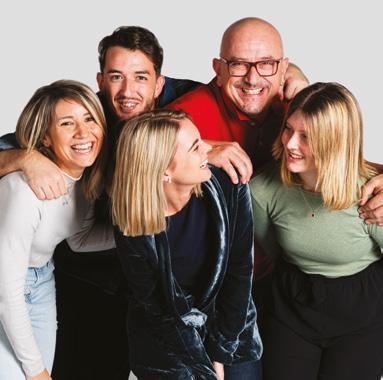
Social risks
The Group is exposed to social risks concerning its human resources, workers in the supply chain and customer management, given its extensive global presence and complex value chain.
OTB WORKERS
OTB manages human resources risks, including but not limited to health and safety, discrimination, employment management and the loss of key resources, through continuous improvement of its organisational model and strategic resource planning. The company also organises regular employer branding activities through technical, professional and managerial training.
WORKERS IN THE SUPPLY CHAIN
Among the potentially most significant social risks are those related to working conditions and respect for workers' rights in the supply chain. The Group mitigates these risks not only by requiring continuous improvement in the traceability and control of suppliers, but also by updating risk assessment procedures in order to better identify critical suppliers that do not comply with the Group's principles and evaluate their ESG performance.
CUSTOMERS
Social risks include customer satisfaction and engagement and brand reputational risks. OTB uses innovative tools to monitor the customer experience on a continuous basis and guarantee a prompt and efficient response. At the heart of its strategy lies close attention to product quality and safety, and management of complaints.
2023 Sustainability Report 54 Governance and risk management
OTB guarantees the respect of human rights of its employees and along the supply chain. In addition to complying with the Code of Ethics and the Code of Conduct, each Group company must adhere to the standards and conventions included in the Global Compliance Programme and comply with applicable laws, such as the Conventions of the International Labour Organisation (ILO). The Group's suppliers and subcontractors are also required to comply.
Privacy risk and data security
OTB priorities the protection of personal data of customers, employees and all Stakeholders who come into contact with the Group. After a period of adjustment to the General Data Protection Regulation (GDPR), the OTB Group established a series of privacy protection procedures covering the various areas and activities, such as protection of employees, partners and customers data stored in each Brand’s sales channels.
Regular data protection impact assessments (DPIA) are performed when new systems or processes with potential impacts on personal data confidentiality are introduced. The Data Protection Officer (DPO) conducts audits to check that regulations and corporate procedures are correctly applied, and works with the Legal Office and the Compliance Office to provide training and information for the corporate functions most closely involved in personal data processing.
The Group applies a stringent privacy assessment protocol for all suppliers processing personal data, who are required to sign a Data Processing Agreement after assessing the suitability of their security measures for safeguarding personal and corporate information. OTB constantly carries out the activity of appointing the managers and conducts the Transfer Impact Assessment (TIA) for companies based outside the EU or which have subsidiaries, sub-processors or parent company outside of the European Union.
Agreements have been signed between Group companies to guarantee application of the same standards among subsidiaries, companies that are not based in the EU and the European parent. Privacy appointments in the Group companies are regularly updated in the event of turnover, with written authorisation of each processing manager at the time of their appointment.
During 2023, the Group also launched an Information Security Management System (ISMS) programme based on ISO 27001 principles, for the purpose of implementing a systematic approach to manage the organisation's information security through the adoption of policies, procedures and controls designed to ensure information confidentiality, integrity and availability.
The Group applies a stringent privacy evaluation protocol for all suppliers processing personal data, who are required to sign a Data Processing Agreement after assessing the suitability of their security measures.
Consistently with the path taken in recent years, the Group has continued to implement security measures to protect its technological infrastructure and prevent cyber attacks, in part with the support of the Security Operating Centre service activated throughout the Group. Security training for OTB employees includes specific training courses and regular anti-phishing prevention campaigns.
2023 Sustainability Report 55 Governance and risk management


THE NEW FASHION SYSTEM
4
THE NEW FASHION SYSTEM 4
The New Fashion System is the pillar of OTB's Sustainability Strategy that defines the Group's commitments with reference to the material topics detailed below:
• Sustainable product design & circularity: the OTB Group is committed to researching, developing and applying innovative solutions to reduce the environmental impact of its products, and to promoting the use of alternative materials and treatments and the application of circular economy principles to its business model.
• Responsible sourcing and traceability: the OTB Group is committed to transparent and traceable sourcing practices.
• Fair wages and well-being along the value chain: the OTB Group is committed to promoting the respect of human rights, and the application of the principles of fair wages, job security and anti-discrimination throughout the value chain.
• Customer Experience, Brand Awareness and Reputation: the OTB Group promotes transparent communication with customers and the development of services able to make the customer experience unique (see chapter 5 for more details).
4.1 SUSTAINABLE PRODUCT DESIGN AND CIRCULARITY
As part of the strategic priority of Sustainable product design & circularity, the Group companies are committed to use materials with a lower environmental impact compared to the ones traditionally used, such as for example organic cotton and recycled materials, and choose production processes such as treatments, dyes and trims that reduce the use of
chemicals and water consumption. The various departments are also focusing on designing finished products that can be more easily recycled and recovered, and developing initiatives to extend product life cycle, such as the adoption of circular business models (examples include use of the second-hand items or special garment repair services).
The diagram below shows the initiatives related to each phase:
STAGE INITIATIVES
DEVELOPMENT AND DESIGN OF PRODUCTS
• Certified alternative materials (e.g., organic and recycled)
• Processes and treatments with a lower environmental impact
• Upcycling
USE AND CARE OF PRODUCTS
• Testing of product quality and increased durability
• Advice to customers on caring for and extending the lifecycle of products
MANAGEMENT OF PRODUCTS END-OF-LIFE
• Second hand
• Partnerships for products end-of-life management
• Recycling and reuse of materials
• Upcycling
2023 Sustainability Report 58 The New Fashion System
RE.CREA CONSORTIUM AND EPR (EXTENDED PRODUCER RESPONSIBILITY) LEGISLATION
The OTB Group, together with other luxury groups and brands and with the coordination of the Italian National Chamber of Fashion (CNMI), was involved in setting up the Re.Crea Consortium. The consortium promotes sustaina bility in the fashion and textile industry and aims to manage the end-of-life stage of textiles and fashion products and to promote research and de velopment of innovative recycling solutions. The Re.Crea Consortium will help the Brands respond promptly to the provisions on Extended Producer Responsibility for Textile Waste (EPR) now being enacted at national and European level.
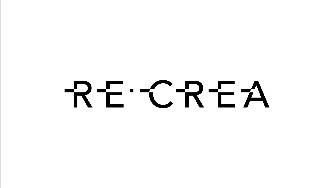
RAW MATERIALS, CERTIFICATIONS AND GUIDELINES
In 2023, the OTB Group purchased a variety of raw materials, as illustrated in the graphic below. Cotton accounted for the largest share of raw materials, at 58.2%, followed by synthetic polymers at 17.7%. Among “Other materials”, leather and wool represented 10.5%, 7.6% and 3.0% respectively, while organochemicals were 3.0% of the total.
RAW MATERIALS PURCHASED IN 2023
11. Other materials includes lesser-used materials such as rubber, resins, metals, waxes, zinc, zircons, etc.
12. Organochemicals are fibers derived from cellulose and chemically processed to obtain fibers. They are also known as manmade cellulosic fibers.
59 The New Fashion System 2023 Sustainability Report
3.0% Organochemicals 12 3.0% Wool 7.6% Leather 10.5% Other materials 11 58.2% Cotton 17.7% Polymers

In 2023, there was a significant rise in the sourcing of certified materials that respect with environmental and animal welfare standards to approximately 17% of total purchases (an increase of 4 percentage points from 2022). Among the various categories, there was a rise in the sourcing of different types of cotton alternatives, such as organic, recycled and cotton from regenerative agriclture, together with other fibres like Lyocell and Modal sourced from responsibly managed forests and recycled synthetic fibres. Organic cotton accounts for about 7.7% of total purchases. In this context, the Group companies work to promote the use of lower-impact materials and processes through specific guidelines shared with the procurement and product development departments.
Specifically, in 2020 Diesel drew up guidelines, updated on an annual basis, that define the criteria for producing items with a lower environmental impact, in accordance with the Brand's For Responsible Living Strategy. The guidelines also consider the objectives of the Group Sustainability Strategy, the demands of the main markets and industry best practices, with the aim of expanding the offer of “responsible” products, while guaranteeing quality standards and respecting the Brand identity. They indicate the preferred alternatives for creating a “responsible” product for Diesel, taking a three-pronged approach that takes into account not only the fabrics used, with the focus on low-impact options, but also treatments, finishing processes and accessories (buttons, rivets, zips, etc.).
2023 Sustainability Report 60 The New Fashion System
Subsequently, Brave Kid introduced the Brave Kid Sustainable Product Guidelines, which are followed by the teams in developing products with a lower environmental impact.
Both Diesel and Brave Kid have also drawn up seasonal roadmaps to guide the transition towards lower-impact collections and integrate ESG considerations into their operational and decision-making processes.
In line with these commitments, during 2023, after a specific audit, Diesel and Brave Kid were certified by Intertek, a globally accredited independent third-party certification body, with regard to the following standards for finished products with reference to organic and recycled raw materials:

Recycled Claim Standard (RCS 100 and RCS Blended), which ensures a minimum content of recycled material in every garment (from 5 to 95% for RCS Blended, more than 95% for RCS 100) and maintenance of traceability throughout the production process.
Global Organic Textile Standard (GOTS), which ensures the content of natural fibres from organic farming (at least 70%), the maintenance of traceability throughout the production process, restrictions on the use of chemicals, and compliance with environmental and social criteria at all stages of the supply chain.
Global Recycled Standard (GRS), which ensures the content of recycled materials (at least 20%), traceability throughout the production process, restrictions on the use of chemicals and compliance with environmental and social criteria at all stages of the supply chain, from the recycling of materials through the subsequent production stages to labelling of the finished product.
Organic Content Standard (OCS 100 and OCS Blended), which ensures the content of natural fibres from organic farming (from 5 to 95% for OCS Blended, more than 95% for OCS 100) and traceability throughout the production process.
61 The New Fashion System
2023 Sustainability Report
Demonstrating its concrete commitment to promoting animal welfare and protecting ecosystems at global level, Diesel also obtained other important certifications, shown below.
Responsible Wool Standard (RWS), which guarantees that wool is sourced from farms managed in accordance with stringent animal welfare and quality of life requirements.
Responsible Mohair Standard (RMS), which guarantees that mohair is sourced from farms that use a responsible approach to the management of their land and livestock.
Responsible Alpaca Standard (RAS), which certifies the use of alpaca fibres from responsibly managed farms with regard to land impacts and animal welfare.
Responsible Down Standard (RDS) which ensures that down and feathers used as filling are obtained from aquatic or land birds that have not been subjected to treatment that causes pain, suffering or stress and that traceability is maintained throughout the production process. regenagri® is an international certification programme for regenerative agriculture, open to all farms and agribusinesses that adopt regenerative agriculture techniques. These techniques are designed to increase organic matter in the soil, promote biodiversity, reduce greenhouse gas emissions and capture CO2. Certification confirms that the cultivation methods comply with regenagri® standards and ensures that the regenagri content is compliant from the field to the finished products. It is issued by the Control Union certification company.

62

Adherence to international standards and certifications is an important factor in consumers’ purchasing decisions in the adult and children's fashion industry. From a communication and commercial viewpoint, the use of the logos associated with globally recognised standards and certifications13 facilitates divulgation of products’ sustainability characteristics, assisting the process of transition and awareness raising of customers.
Also Staff International supports the luxury Brands of the Group for which it operates, in the transition towards a more responsible fashion system and it is working to obtain some of the above-mentioned certifications.
Finally, Viktor&Rolf, which manages the production of its collections independently, takes a similar approach by choosing certified materials and suppliers.
13. Reference should be made to the standards and certifications on pages 61 and 62
2023 Sustainability Report 63 The New Fashion System
ECODESIGN AND CIRCULARITY
During 2023, Diesel continued its internal training activities for the Style and Product offices with a specific course on Ecodesign and the principles of circular design, to ensure their integration from the earliest design stages.
Two full days were organised for training on these topics. The first, in Milan, was intended mainly for the Style team; the second, in Breganze, involved the Product and R&D teams.
The training focused on an analysis of the principles and methods underlying circular design, citing a number of industry case studies and best practices. The theory was translated into practice through workshops during which participants were asked to re-invent some of the Brand's iconic products to make them more “circular”.
Finally, an upcycling contest was organised, with Diesel-branded textiles, accessories and finished products from the defective or destined for disposal stream to be transformed into new garments.
OTB GROUP BRAND INITIATIVES
DIESEL
Just three years after adopting the For Responsible Living Strategy, with the launch of the 2024 Spring/Summer collection, Diesel presented more than half of its combined Ready-To-Wear and Denim collection in line with the internal product sustainability guidelines, demonstrating the significant results of its growing commitment.
During 2023, Diesel expanded the use of low-impact cotton to 23.9% of its total cotton purchases, up from 22% in 2022, further increasing the percentages of certified organic and recycled cotton in its collections.
In addition, starting with the 2024 Spring/Summer season, Diesel has introduced the use of RegenAgri-certified regenerative cotton sourced in Spain for its denim garments. For the 2024 Autumn/Winter season, Diesel confirmed its decision and also expanded its offer by purchasing regenerative cotton from other countries and entering into partnerships with additional suppliers.
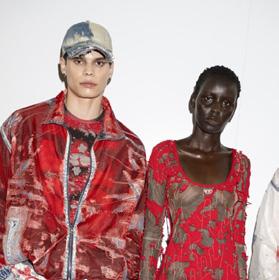
2023 Sustainability Report 64 The New Fashion System
During 2023, Diesel also continued to expand its range of products with a lower environmental impact in both the Ready-To-Wear and Accessories categories. Starting with the 2024 Spring/Summer season, the Brand's entire Beachwear offer has been labelled For Responsible Living, exclusively including garments made with more than 50% recycled materials or other lower impact alternatives. In the bags category, Diesel increased the number of variants produced with recycled materials and leather from tanneries certified by the Leather Working Group (LWG), notably its iconic “1DR” model.
In February 2023, Diesel launched its first line of solar-powered wristwatches produced with low-impact materials such as #tide ocean material® for the strap. This is a recycled material made 100% from plastic recovered from coastal areas. The case is made from a bio-based material obtained from the castor oil plant.
Diesel Living also continued its commitment to research low-impact alternatives, as demonstrated at the recent Salone del Mobile 2023 In cooperation with one of its partners, the Brand presented innovative new textiles, such as Getis, a fabric made entirely from recycled polyester, Hyle (with 20% recycled cotton), Wild Linen (with 60% linen and 30% recycled cotton) and Pepe (with 75% recycled cotton), and also presented more responsible solutions in the furnishings category.

In collaboration with Lodes, Diesel Living presented REGLOBE, a pendant lamp made from a compound incorporating recycled plastic from production off-cuts.
During the manufacturing process, fragments of melted plastic of different colours are deposited on each piece, creating a variable colour effect that makes each lamp unique.
During 2023, Diesel also started an initiative for pre-consumer downcycling of single shoes (without the right or left pair) with rubber soles, from prototypes or sample collections. About 3,000 kg of samples were collected and sent to a partner specialized in shoe disassembly. The material obtained from the soles was then used by third-party companies who produce flooring for athletics tracks or playgrounds and shock-absorbing panels, restoring new value to materials otherwise destined for disposal.
2023 Sustainability Report 65 The New Fashion System
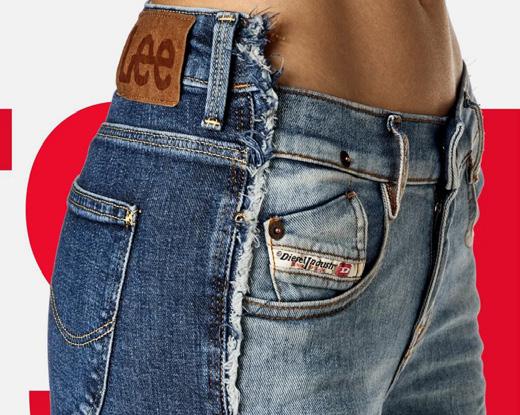
DIESEL AND DENIM INNOVATIONS
Since the launch of For Responsible Living, Diesel has been working to reduce the impact of its key category: Denim.
In addition to applying its guidelines to the entire category in the collection, with a year-on-year increase in garments with alternative and more responsible fabrics, treatments and accessories, the Brand is carrying out numerous pre- and post-consumer sustainability projects, combining the experience gained in over forty years as a pioneer in treated denim, innovation and collaboration with its suppliers.
Specifically, in 2023 Diesel continued its project to reuse production off-cuts launched in 2022 in cooperation with the United Nations Industrial Development Organisation (UNIDO) and a Tunisian supplier. The project envisages the creation of a virtuous circle of fabric-cutting scraps, with the aim of strengthening the management and recycling of denim off-cuts in the mechanical recycling process. Once recycled and re-woven, the new recycled cotton fabrics are reused by Diesel and included in its collection.
Beginning with the 2024 Spring/Summer season, the fabrics have also been included in the “Diesel Library” permanent collection of denim garments characterised by a careful approach to environmental impacts during the various product creation and processing stages.
The Brand also offers an exclusive free after-sales service on the Diesel Library collection for members of House of Diesel, the loyalty programme open to all customers. In the event of damage of Diesel Library garments, loyal customers can access the free repair service to extend the life of the garment.
2023 Sustainability Report 66 The New Fashion System
In 2023, the Brand also expanded the “Diesel Rehab Denim” line for the 2023 Spring/Summer season, created in collaboration with supplier Tejidos Royo and launched with the 2022 Fall/Winter show. The line is Diesel’s most important achievement to date in terms of product sustainability. Each garment is made from fully recycled cotton and elastane, mixed with TENCEL™x REFIBRA™ technology. Fabric dying uses the Dry Indigo® technology, which allows the fabric to be dyed without water, hugely reducing the quantity of chemicals (up to 89%) and energy (up to 65%) used in the denim dyeing process.
In addition, the company continued working on the “Diesel Second Hand” project for the recovery and resale of the Brand's used denim products. Currently, garment collection is available at all Diesel mono-brand stores in Italy, while Diesel second-hand products are available for sale throughout Europe on the diesel.com e-commerce website.
Finally, in December 2023, Diesel launched “Diesel Loves”, an initiative inviting other brands to collaborate with Diesel to share resources and creative ideas in order to foster a responsible transition. In each edition of the “DIESEL♥VES” collection, Diesel proposes and reinvents unsold goods or surplus materials with those of a partner brand, creating a limited series of products made entirely from existing materials. The profit arising from the project, which involves the two brands on an equal footing, go to UNHCR humanitarian projects, with the support of the OTB Foundation. The first collaboration, launched in December 2023, was “DIESEL♥VES LEE”, with the production of some 1,700 unique pieces. The garments were created by reusing unsold Diesel and Lee denim, with the intention of reducing waste through upcycling and celebrating the uniqueness of each piece.
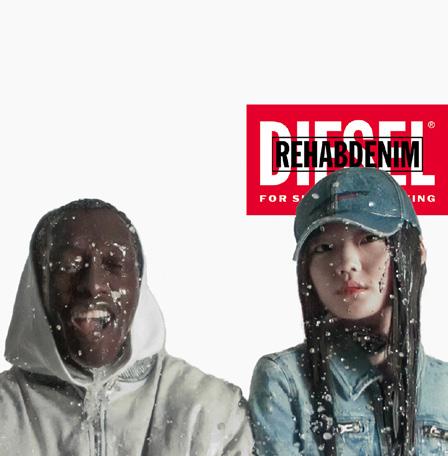
2023 Sustainability Report 67 The New Fashion System
BRAVE KID
Brave Kid is constantly seeking innovation to guarantee the durability and quality of the garments and accessories that make up the children's collections of the brands it works for. Its commitment to using fibres and materials with a lower environmental impact goes hand in hand with careful and responsible design.
After the “Brave Kid Durability Test Package”, in 2023 Brave Kid launched another test package to evaluate the durability of its products even more thoroughly in order to increase their service life; the test packages are part of the “Brave Kid Durability Project”. With the project, the Production Hub is committed to monitoring the durability and safety performance of garments, not only during production, but also during the use phase, by simulating the entire life cycle.
With the help of an internationally recognised laboratory, Brave Kid tested 18 products representing the main categories of its collections. The results demonstrated the quality of the Brave Kid products, both in terms of fabric strength and the durability of prints and dyes, and indicated possible areas for improvement, especially in the baby category (0-36 months). As a result of the tests, the Hub made a series of improvements, such as the use of new types of buttons to ensure high strength and durability, aligning Brave Kid's quality standards to the market’s best benchmarks.
In addition, during 2023, Brave Kid minimised the risk of overproduction and waste through careful production planning based on sales campaign data, moving towards a make-to-order approach and increasingly efficient management of dead stock.
Lastly, Brave Kid is a licensee of the MYAR children's line, the brand owned by Andrea Rosso, who has always been committed to raising public awareness on environmental protection matters. MYAR products are made with materials sourced from dead stock and warehouse remnants of the OTB Group and other external suppliers. The MYAR collections adopt a reduce, re-use and upcycle approach to give fabrics a second life as part of the circular economy.
2023 Sustainability Report 68 The New Fashion System
CIRCULAR
RE_USE RE_DUCE UP_CYCLE
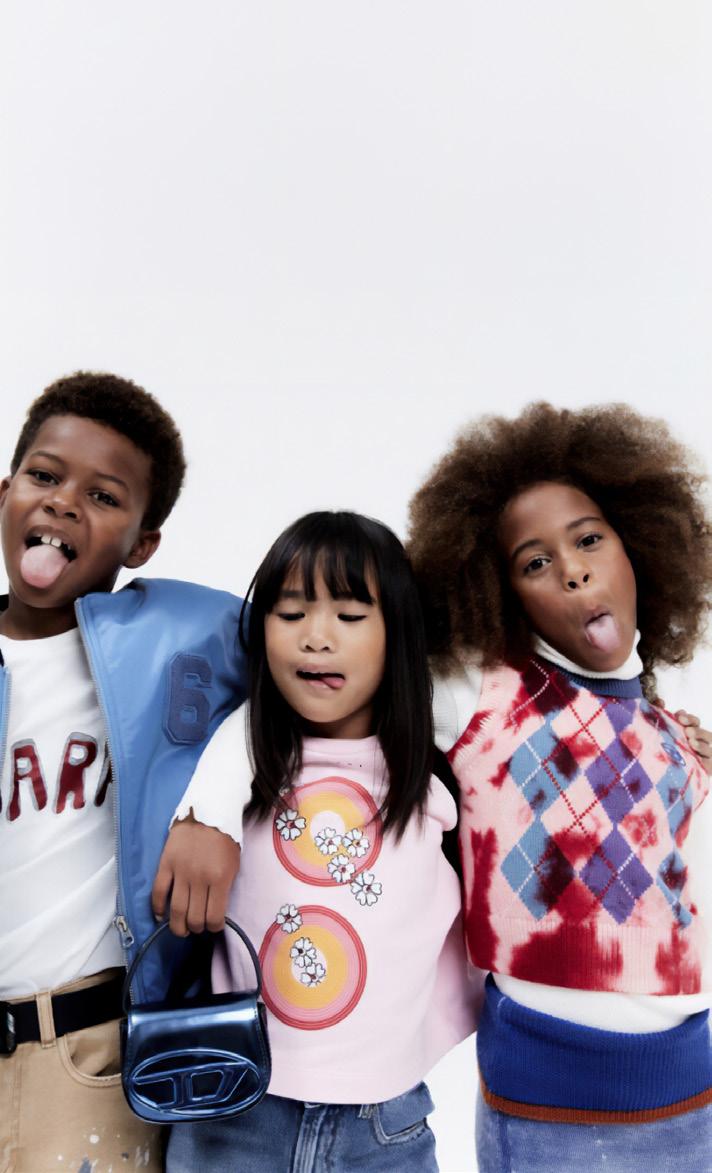

STAFF INTERNATIONAL AND THE LUXURY BRANDS
Staff International, which serves as Production Hub for some of OTB's Brands, implements strategies and partnerships for the development of projects with a focus on environmental and social sustainability.
Collaboration with MAEBA
During 2023, Staff International continued its collaboration with Maeba, a leading company in Italy in the upcycling and marketing of surplus Italian manufacturing. Together with Maeba, Staff International contributes to the recirculation of materials that would otherwise end up as dead stock.
Collaboration with CAUTO
In autumn 2023, Staff International assisted Marni on the launch of a pilot collaboration scheme with the CAUTO social cooperative, which specialises in job placement for fragile individuals.
About 20 pallets of various materials were delivered to the CAUTO cooperative, and manually separated for reuse or recycling in cooperation with partner Berbrand. Where possible, the metals were remelted and organic waste was sent to a waste-to-energy plant. Specifically, 1,800kg of materials were recovered and sent to Berbrand for reuse. The non-recoverable materials, totalling 8,000kg, were sent for recycling.
Staff International intends to propose also to the other companies for which it acts as a Production Hub to join the project, in order to create a protected laboratory that promotes integrated sustainability and environmental education.
2023 Sustainability Report 70 The New Fashion System
MARNI
Marni is increasing the share of low-impact materials in its collections. This is demonstrated in the 2024 High Summer Capsule Collection, with its distinctive choice of materials. Organic cotton is the main raw material of the Capsule, presented in a variety of different forms: super-light cotton muslin, cotton toile, stretch cotton poplin, cotton jersey in different weights, cotton gabardine and stretch denim. The denim items were dyed using a vegetable dyeing process and avoiding synthetic chemicals. Linen sourced from non-irrigated, GMO-free European crops is the main feature of the knitwear offer. The colours are inspired by Earth colours, emphasising the environmental focus of the collection. The collection's accessories and trims also demonstrate Marni's interest in promoting innovative and lower impact materials over traditional ones.
Marni is also committed to using leftover materials in creative ways. During the year under review, part of its stock was used to make uniforms for store employees, and part was donated to the OTB Foundation for the creation of Christmas gifts for employees and sales accessories, the proceeds from which go to support the Foundation's initiatives.
In 2023, Marni's Creative Director, Francesco Risso, was appointed as a member of the jury of the International Woolmark Prize, hosted at the Petit Palais in Paris. The award, an initiative of The Woolmark Company – an organisation founded in 1937 by sheep farmers from Australia, New Zealand, South Africa and Uruguay to promote the use of pure virgin wool – honours international talents who exemplify the beauty and versatility of Australian Merino wool.

2023 Sustainability Report

JIL SANDER
Jil Sander is committed to using materials with a lower environmental impact and extending selection of these alternative materials to all its collections. The “Jil Sander+” collection is based on a philosophy whose goal is to create products combining aesthetics and comfort, refinement and resistance to atmospheric elements. The addition of the + symbol to the Jil Sander logo indicates the Brand's focus on selecting high-performance, organic and/or recycled fibres. For its duvets, the Brand committed to only use recycled down, whenever possible.
MAISON MARGIELA
In 2023, Maison Margiela confirmed the “Recicla” line launched in 2020. A number of items such as accessories, bags and shoes were selected by Creative Director John Galliano and reinterpreted using leftover materials to create a limited edition, identified by the white “Recicla” label.
The Brand has also introduced a new form of creative expression that merges the Maison’s DNA with a strong innovative vision based on fabric upcycling. In 2023, the Maison implemented a project for the transformation of shirting fabrics and silk strips into new garments and the reinterpretation of vintage garments and one-off pieces, modifying their form and function. By using materials intended for different purposes, such as jute sacks or military blankets, to create unique pieces like cabanas and jackets, the Maison takes its creativity beyond the traditional reuse concept.

2023 Sustainability Report 72 The New Fashion System
VIKTOR&ROLF
Viktor&Rolf is committed to seeking innovative partnerships and collaborations with companies or start-ups focused on sustainable development in order to promote the transition to a more responsible fashion industry.
In 2023, the Brand continued to experiment with the limited-edition Lost & Found collection, which transforms vintage pieces into extravagant tulle icons, completed with appliqués and details. Similarly, the “Viktor&Rolf Tulle” collection , featuring a variety of ironic and provocative tulle garments inspired by the Viktor&Rolf Haute Couture shows, is emblematic of the Brand's desire to explore a new creative drive.
For the Everywear collection, fur made with synthetic materials was introduced to achieve a vintage winter look, but in a modern, fur-free version. Specifically, certified polymer fibres produced from maize seeds were used, while the lining was made with Tencel™ fibre and organic cotton.
Also in 2023, Viktor&Rolf confirmed its collaboration with the company that produces Tencel™ Luxe fibre, an innovative Lyocell filament made from wood pulp sourced from sustainably managed forests, for the Mariage collection.

4.2 PRODUCT QUALITY AND SAFETY
Product quality and safety have always been central considerations for the OTB Group, where testing for physical and chemical conformity is a priority. Tests are carried out at different stages in the production process, both on raw materials and on finished products. Diesel and Brave Kid also require at least one chemical and physical conformity test for each style14, to be conducted at an accredited laboratory.
Specifically, in 2023 Diesel conducted product safety tests covering 97.0% of its “styles”, while at Brave Kid the percentage of products covered by at least one successful test reached 99% for the second consecutive year. At Staff International, chemical tests were performed on 70% of products in the Ready-To-Wear and Jewels collections and on 20% of products in the Shoes & Leather Goods collections.
BRAVE KID: SAFE PRODUCTS FOR YOUNG CUSTOMERS
The importance of safety for children’s products combined with the company’s determination to guarantee high quality standards have led Brave Kid to adopt a rigid testing and compliance system to ensure the chemical and physical safety of its products. In particular, it conducts special tests on detachable and/or pointed parts, sharp edges and garment inflammability. The number and types of tests depend on the complexity of the final product and its applications, allowing Brave Kid to maximise coverage and ensure product safety on a broader scale. The Production Hub is committed to covering almost all products with at least one valid test. In order to ensure compliance standards are met, Brave Kid places great emphasis on collaboration with suppliers. Its technical team makes regular visits to suppliers' production sites to monitor production and identify any critical safety-related issues. In the case of products with complex constructions, Brave Kid takes advice from internationally recognised laboratories to assess specific risks. In addition, constant communication between the Quality & Control Department and the Customer Service Department ensures continuous support for customers and follow-up to reports received on product quality. Critical issues are shared with the Style and R&D team, as well as with suppliers, promoting continuous improvement of the Production Hub's product testing process.
14. The term "style" signifies each combination of fabric and wash/treatment.
2023 Sustainability Report 74 The New Fashion System
4.3 THE SUPPLY CHAIN
The OTB Group believes that a supply chain based on cooperation, trust and respect is crucial for the production of quality products. For this reason, the Group companies work to maintain a solid supply chain with a high level of know-how.
OTB's production models can be divided into Cut, Make and Trim (CMT or Industrialised) and Full Production Package (FPP or Commercialised).
For the industrialised production model, the Purchasing Department buys the fabric and most of the components (accessories), which are then sent to suppliers for cutting, assembling, washing and ironing. Group technical personnel monitors and manages production progress for the Production Department, sometimes at the supplier sites. Manufacturers are primarily located in Italy, Eastern Europe and the Mediterranean Basin, and in most cases have long-time partnerships with the OTB Group companies.
For the commercialised production model, the Product and Production Departments provide the finished product supplier with all the necessary information, ensuring constant alignment during the selection of materials and accessories, to guarantee a result in line with the expectations of the Style Offices of the various Brands.
In both cases, service suppliers assist the OTB Group companies with pattern making, prototyping, and quality and safety control processes.
NUMBER OF SUPPLIERS BY TYPE
OTB's suppliers are divided into four categories: raw materials, manufacturing, services and finished products.
2023 Sustainability Report 75 The New Fashion System
1.3% Service providers 20.5% Finished product suppliers 20.8% Manufacturer suppliers 57.4% Raw material suppliers
OTB cooperates with around 1,47015 first-tier suppliers16 located in 35 countries. The Group's sourcing policy is designed to mitigate dependence on a limited number of suppliers, in order to effectively address any risks associated with interruptions in the supply chain. In 2023, more than 80% of orders placed by the Group companies were in EMEA countries, with over 60% in Italy.
VALUE OF ORDERS BY GEOGRAPHICAL AREA
16.7% APAC (excluding Japan)
18.1% EMEA (excluding Italy)
1.2% Japan
0.2% America
63.8% Italy
Many suppliers from whom raw materials are purchased are located close to the headquarters of the Group companies, with 78.2% of suppliers based in Italy17. This is part of a broader strategy to foster the creation of job opportunities and distribute wealth in the territories where the OTB Brands operate.
15. Excluding suppliers with annual sales orders of less than EUR 1,000.
16. Tier 1 suppliers are suppliers with whom the Production Hubs have direct collaboration relationships. They are directly responsible for the supply of materials and components (regardless of the type of industrialised or commercialised product).
17. Percentages calculated on the total number of OTB Group suppliers. For manufacturers and finished product suppliers, the geographical location is the country where the product is made; for service and raw material suppliers, it is the country where the supplier is registered.
2023 Sustainability Report 76 The New Fashion System
7.1%
APAC (excluding Japan)
11.8%
EMEA (excluding Italy)
2.6% Japan
0.3% America
78.2% Italy
4.4 RESPONSIBLE SOURCING AND TRACEABILITY
Responsible sourcing and traceability was classified as a material topic in the Group's 2023 impact analysis, confirming the importance of traceability as an essential factor in managing actual and potential environmental and social impacts along the value chain.
With this in mind, the Group is working on improving the materials sourcing process. The traceability of raw materials and supplier monitoring contribute to this and also strengthen the risk management system.
The OTB Group is implementing a product and process information traceability platform in order to pursue the goal of the Sustainability Strategy and comply with the increasingly stringent regulations with regards to this matter. The initiative aims to manage suppliers information and data for all product categories in a consistent and coordinated manner. The project included a scouting phase for suitable systems and tools, which led to the identification of potential solutions which are now being tested.
2023 Sustainability Report 77 The New Fashion System SUPPLIERS BY GEOGRAPHICAL AREA

All OTB Group companies are in continuous contact with suppliers to constantly review the environmental and social aspects of the supply chain, in addition to business-related questions (such as quality, costs, production time). Suppliers are required to comply with the Group's Code of Ethics, Suppliers Code of Conduct and Restricted Substances List (RSL). Compliance with these documents is a basic requirement for companies wishing to work with the Group. Suppliers are also invited to share any other documentation and certification that could be relevant for their ESG evaluation.
During 2023, the Production and Compliance Departments of the Group Companies responsible for evaluating suppliers also reviewed their ratings taking into account the attainment from suppliers of new certifications. Details about due diligence activities on the supply chain are provided in the next section.
ANIMAL WELFARE
The OTB Group companies have drawn up an Animal Welfare Declaration that suppliers are required to sign with regard to animal sourcing.
The Declaration, adopted years ago by Diesel and Staff International suppliers, will also be adopted in 2024 by Brave Kid, whose production in any case present a low level of animal fibres. The Brand Viktor&Rolf, which directly manages the production of its collections, will also follow the same direction.
Specifically, the Animal Welfare Declaration places the following requirements on suppliers of raw materials and finished products:
• that leather and skins are sourced only from food industry by-products;
• that down and/or feathers are not sourced from force-fed or live animals;
• that raw materials do not come from vulnerable, endangered or protected species as listed in the Convention on International Trade in Endangered Species of Wild Fauna and Flora (CITES) and the International Union for Conservation of Nature's Red List of Threatened Species (IUCN);
• that raw materials do not come from breeders who practice mulesing;
• that compliance with all locally applicable regulations is guaranteed.
2023 Sustainability Report 78 The New Fashion System
For each Brand, the OTB Group guarantees the possibility to adopt more stringent measures, compatibly with its distinctive identity. In line with this principle, Diesel has been Fur Free since 2010, which means that the products and accessories it sells must not contain animal skin or any part thereof with attached pelt or fur fibres, in the raw or processed state, of any animal bred and slaughtered exclusively for the use of its fur. Starting with the FW23 season, Diesel also requires that if mohair fibres are used in its products, they must be certified according to the Responsible Mohair Standard.
4.5 FAIR WAGES AND WELL-BEING ALONG THE VALUE CHAIN
The OTB Group promotes respect of human rights, workers' rights and the well-being of workers along the entire value chain, organising its processes to prevent potential violations, occupational injuries and inadequate working conditions.
In accordance with these principles, Group suppliers are required to comply with the Group Code of Ethics and Suppliers Code of Conduct in order to guarantee high occupational health and safety standards.
In 2023, the Group companies continued to analyse their supply chain, assessing suppliers’ social and environmental performance, either through the evaluation of audit reports that were already available or through the organisation of on-site third-party audits. In the case of easily resolved non-conformities, a follow-up audit is scheduled to ensure that breaches are quickly resolved. For more serious, but not critical, non-conformities, suppliers are required to prepare an action plan for their resolution, to be implemented within a period of time that varies depending on the irregularity in question. Lastly, in the event of critical non-conformities or inaction and/or inability on the part of the supplier to guarantee their resolution as planned, the Group companies contractually reserve the right to terminate the supply agreement.
18. Key suppliers are those with whom the company has a continuous relationship and makes purchases superior or equal to 10,000 Euros per year.
In 2023, Brave Kid expanded its monitoring of sustainability performance to include approximately 92% of significant suppliers18, through audits it commissioned directly or through the collection and analysis of audits already held by suppliers. In order to achieve an increasingly comprehensive overview of the supply chain, it also started to map and collect available audit reports of direct suppliers’ subcontractors. Furthermore, Brave Kid adopted an additional checklist, especially with regard to some of the most critical countries, to verify compliance with wage practices.
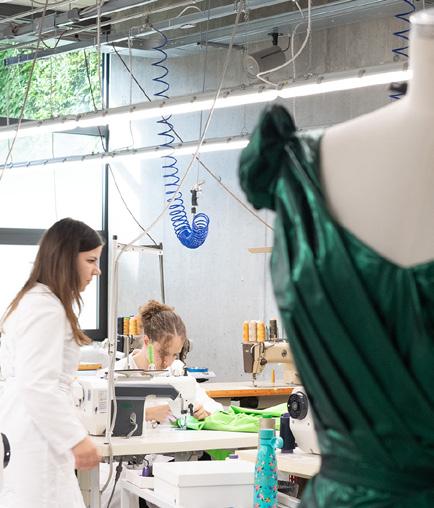
2023 Sustainability Report
During 2023, Staff International commissioned a total of 130 third-party audits mainly aimed at examining labour and tax law compliance as well as workplace safety of suppliers and subcontractors of the Ready-To-Wear, Shoes, Bags & Accessories divisions. Specifically, 75 audits were completed on direct suppliers and 55 on subcontractors.
In 2023, Diesel commissioned more than 72 audits on suppliers and subcontractors from an external company, following recognised international standards (e.g., BSCI and SMETA). The audits also collected information on workers’ minimum wages and average salaries, including details on basic salary, remuneration of overtime, and overtime hours worked in the year preceding the audit. The Brand also evaluated 12 additional audits made available by suppliers and carried out by third party entities to be compared with the Diesel social audit standards.
Furthermore, Diesel commissioned an updated analysis of the social risks potentially present in its supply chain. This survey particularly took into account the main social risk levers, as well as those identified by the ILO (International Labour Organisation) with respect to the risk of forced labour and child labour. The objective of the analysis is to improve management of the social risks potentially linked to the supply chain.
In connection with these issues, on the initiative of a number of Canadian non-profit organisations, the Canadian Ombudsperson for Responsible Enterprise (CORE) launched investigations into several companies in the fashion and mining sectors with regard to the import of products made in the People's Republic of China, for alleged human rights violations related to the Uyghur minority. In this context, the non-profit associations and CORE alleged that since 2019 Diesel Canada had procured materials from a supplier cited in a report published in 2020 by the Australian Strategic Policy Institute (ASPI).
Diesel Canada indicated that Diesel had reviewed its supply chain and denied the allegations. CORE decided nevertheless to proceed with an independent investigation to verify the presumed link between Diesel Canada and the supplier.
In addition, during 2023, two suppliers who also work for Diesel were involved in a Transparentem NGO investigation in Mauritius concerning alleged commissions connected with the recruitment of migrant workers and other forced labour risks, as defined by the ILO.
Diesel promptly responded and, together with some of the 18 brands involved in the investigation, carried out a specific third-party audit on both plants through a company specialised in this field.
The audits confirmed some non-compliances highlighted by Transparentem, for which corrective measures are already underway, while the alleged high commissions relating to the recruitment of migrant workers were not confirmed.
To underline its commitment to promoting the fair treatment of workers in the supply chain, in 2023 Diesel signed the commitment with regard to responsible hiring promoted by the Fair Labour Association (FLA) and the American Apparel & Footwear Association (AAFA).
2023 Sustainability Report 80 The New Fashion System



EXPERIENCE, AUTHENTICITY
COMMUNICATION
CUSTOMER EXPERIENCE, AUTHENTICITY AND TRANSPARENT COMMUNICATION
CUSTOMER
AND TRANSPARENT
5 5
With customers’ needs at the centre of its activities, OTB focuses on product quality, the promotion of services that make the customer experience unique, and the protection of customers from buying counterfeit products.
The Brands also promote a transparent communication with their customers with regards to their sustainability initiatives and the lower impact credentials for their products.
5.1 CUSTOMER EXPERIENCE
For maximum efficiency in the delivery of products to its direct and indirect channels, OTB has set up a series of agreements, most notably with the Neteven “Marketplace Integrator” for the optimisation and management of its online marketplaces. This strategic partnership aims at more effective penetration of international markets, and in parallel at an improvement in the management of existing channels, through process simplification and automation.
STAGE DIRECT CHANNELS (B2C)
INDIRECT CHANNELS (B2B)
PROCUREMENT AND DISTRIBUTION
• Retails
• Outlets
• Online
• Distributors
• Travel retail
USE AND CARE OF PRODUCTS
FINAL CUSTOMER
• Omnichannel services
• Clienteling App
B2B Client Portal
INDIRECT CHANNELS (B2B)
• Anti-counterfeiting
• Customer relations and responsible communication
To offer its Brands new growth opportunities, as well as an improved shopping experience for its customers, in 2023 OTB extended its online presence to new marketplaces, including 24 Sèvres and Yoox.
2023 Sustainability Report 84 Customer experience, authenticity and transparent communication
Specifically, in order to expand its international online presence, in July 2023 Diesel established a collaboration with Global-e to manage international sales. The integration of the Global-e platform into the Moon ecosystem19 has given Diesel access to 24 new countries in the EMEA and APAC regions, including Australia and South Korea, enabling customers to make purchases directly from the diesel.com website.
Services for B2C direct channels
The OTB Group Brands are dedicated to offering customers unique personalised experiences, anticipating and satisfying their needs with a proactive approach. Through a wide range of in-store and online services, the Group places increasing emphasis on omni-channel management, which is essential to adapt to the various sales channels and customer profiles. Its omni-channel services include Buy Online and Pick Up In Store, Click and Reserve, Click From Store, Return In Store, Book an Appointment and Ship from Store.
Diesel was the first OTB Group Brand to adopt an omni-channel CRM strategy for unified management of online and offline customer data and improved customer analysis and segmentation. This was followed in 2020 by the launch of the “Moon” omni-channel operating model, which integrates online and retail sales and inventory management to ensure seamless customer service. Diesel also monitors the customer experience and satisfaction through its “Voice of the Customers” programme (VoC), which collects feedback in stores, online and after purchase. Engagement and dialogue with customers, also on sustainability topics, are of fundamental importance for Diesel with a view to continuous improvement.

19.
2023 Sustainability Report 85 Customer experience, authenticity and transparent communication
Moon is a new omnichannel operating model designed to facilitate and simplify digital retail operations, while offering customers around the world a totally seamless experience.
In this regard, the Brand not only rewards customers with additional points on its “House of Diesel” loyalty programme for more responsible behaviour, such as the use of reusable bags made of recycled material, previously provided by the Brand, or in-store returns, or the purchase of “For Responsible Living” items, it has also decided to raise awareness of ESG issues through dedicated customer newsletters.
Vert Watch and Metaverse Experience by Diesel
In September 2023, on the occasion of the launch of the Vert watch collection, Diesel launched the innovative Metamorph project in collaboration with Fossil Group and Brave Virtual Xperience, which combines the physical and digital worlds by redefining conventional design in the category. The Metamorph experience is developed through an online gaming platform, developed with Artificial Rome, which consolidates the brand's position as a Web3 pioneer. Participants have the opportunity to immerse themselves in a virtual world inspired by the design of the Vert watch, with breathtaking scenarios and challenges to reactivate time. Vert purchasers receive an exclusive NFT in the form of a digital animated image, which undergoes three transformations before assuming the likeness of the avatar that plays an active part in the online game, allowing for personalisation and access to unique gaming abilities. Diesel has made it possible to participate in the online experience with a basic avatar, even for people who have not purchased the watch.
Among the OTB Group’s luxury Brands, Jil Sander and Marni elevate the customer experience with distinctive services such as Try at Home and Private Shopping Experiences These services make it possible to try products at home or enjoy private shopping sessions, offering a higher level of customisation and care.
In addition, Marni offers each customer a unique personalised experience through the “Millions of one-to-one interactions” initiative designed to create a personalised dialogue with each customer by promoting a tailor-made, interactive real-time experience. This omni-channel approach is a pillar of Retail Excellence.
In 2023, Jil Sander devoted significant efforts to training retail staff and implementing the Moon omni-channel project to offer customers an efficient, flexible and convenient shopping experience with delivery options. The focus on the customer experience and CRM also includes performance monitoring, loyalty activities and implementation of the Digital Retail Tool (DRT) in 10 European stores. Special events, such as invitations to fashion shows for VIP customers, were organised to strengthen ties with the Brand.
2023 Sustainability Report 86 Customer experience, authenticity and transparent communication
In 2023, Maison Margiela introduced an innovative initiative called “endless lanes”, with a pilot test in London. This service extends the customer experience from the store to the online channel, providing access to the entire Brand assortment and information on the availability of items in stores, and offering solutions for products that are not physically available.
The importance of the physical store as the primary point of contact to convey Brand values and emotionally engage customers is fundamental to the Group. Through exclusive events in physical stores and regional installations, the Brands promote interaction to strengthen ties with their customers. In 2023, Maison Margiela offered a VIC (Very Important Customer) experience centred on the Maison Margiela Co-Ed fashion show, creating exclusive experiences and consolidating the connection with its customers.
The Group Clienteling App project, launched in 2022 with a pilot project, was a turning point in the digitisation of the client experience in 2023, offering a digital interactive Selling Ceremony. The app facilitates new forms of customer relationship and schedules activities and appointments to improve the performance of the boutiques. During 2023, it moved from the experimental phase in 19 pilot stores to a more extensive development involving every store in Europe. An extension outside Europe is being considered.

2023 Sustainability Report 87 Customer experience, authenticity and transparent communication
Services for indirect B2B channels: B2B Client Portal
In response to the growing need for digitisation, in 2020 OTB launched Hyperoom, a digital sales platform and virtual showroom designed to generate emotional engagement between buyers and sellers. Through Hyperoom, customers embark on a sensory journey in virtual environments, assisted by salespeople on a live connection. Initially adopted by Diesel and Marni for the 2021 Spring/Summer season, the platform was later extended to the other Group companies.
Hyperoom also acts as a Virtual Showrooming platform to support seasonal order taking for all the Group Brands, becoming a de facto B2B Client Portal that enables registered customers to access the services offered by the Brands, including Self Service Replenishment, where they can consult a catalogue of products available for replenishment and place orders independently. Diesel B2B customers can also use the platform to find information about lower impact products during sales campaigns.
Ensuring a consistent and flawless customer experience is crucial for the OTB Group Brands, which strive to strengthen relations with their wholesale customers both through face-to-face meetings and innovative digital platforms. A prime example is Virtual Walkthrough, which uses virtual reality to offer remote immersive experiences, allowing wholesale customers to book virtual appointments, watch fashion shows in live streaming and view digital presentations of new collections.
5.2 CUSTOMER RELATIONSHIP AND TRANSPARENT COMMUNICATION
One of OTB's main strengths is its commitment to inclusive and authentic communication, in line with its core values. The Group communication strategy aims to foster true cultural change, for example by raising stakeholder awareness about the product life cycle. Each Brand, through different tools, shares information on product care and packaging recycling.
OTB transparently publishes its progress on environmental, social and governance (ESG) performance and its achievements in this area. This is facilitated by a dedicated section on the Group official website, which provides an overview of the Sustainability Strategy and related Reports.
Communication channels
The OTB Group Brands optimise interaction with customers through various communication channels, from social media, e-mail, newsletters and websites to dedicated support systems designed to provide an effective and efficient response to every request.
2023 Sustainability Report 88 Customer experience, authenticity and transparent communication

OTB has an active and strategic presence in social media, using platforms like Instagram, Facebook, LinkedIn and Twitter to connect directly with its community. The Group Brands also use specific platforms for the Asian market such as Weibo, WeChat, Kakao, Line and RedM, adapting to their global customer base.

2023 Sustainability Report 89 Customer experience, authenticity and transparent communication
20. The social media data include the OTB Brands and the Production Hubs.
OF
AND
Facebook 5,851K Instagram 11,301K LinkedIn 838K Twitter 524K TikTok 259K Kakao 140K Weibo 821K WeChat 312K RED 213K
SOCIAL MEDIA PRESENCE
OTB
THE BRANDS (number of followers)20
These channels build customer loyalty through regular, frequent and meaningful interactions. The aim is to strengthen customer relations through a broad and intimate form of storytelling that stimulates people's curiosity and emphasises exclusivity. Compared to 2022, the number of followers on the social networks of the OTB Group Brands increased by 8.3%.
In the OTB Group, each Brand deploys a tailor-made digital strategy to interact with its social media communities, reflecting the cultural and behavioural diversity of consumers of all regions and ages.
Diesel, for example, optimises user-generated content on dynamic platforms such as TikTok and Instagram, encouraging active participation through collaboration with influencers and streaming events and fashion shows in real time.
Maison Margiela focuses on Instagram as the main vehicle for its visual storytelling, enhanced with content that blends the informative and the commercial. Under the visionary leadership of John Galliano, the Maison has successfully attracted a young audience, amplifying brand recognition.
Viktor&Rolf uses social media to offer an authentic look at the Brand backstage, from the creation of the collections to insights into the biennial fashion shows and other significant moments. This open dialogue aims to establish close ties with the public, who are invited to immerse themselves in a narrative that celebrates the uniqueness and exclusivity of the Brand.
Marni’s social media strategy transposes the Brand’s creative vision through detailed, intimate and distinctive international projects, reflecting a clear commercial approach to markets in which the Brand operates. Photographers involved in the storytelling of the collections are highly recognized in the Fashion Industry, and encompass an open and dynamic dialogue with creative director Francesco Risso.
2023 Sustainability Report 90 Customer experience, authenticity and transparent communication
THE DIESEL MESSAGE
Diesel is an emblem of inclusiveness and openness, characteristics that reflect its bold and unconvention al communication. Through campaigns that challenge the status quo, Diesel has always stimulated debate on issues of social injustice, diversity and politics. The brand advocates individualism and freedom of expression, celebrating diversity in all its forms and supporting the LGBTQIA+ community, inspired by the underground and avant-garde web3culture.
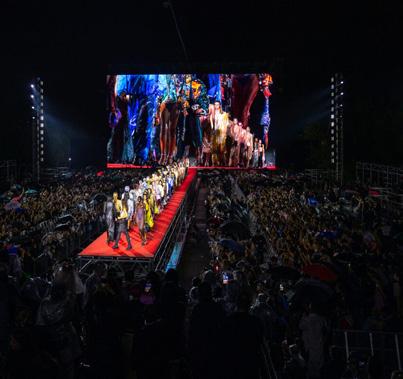
In 2023, Diesel renewed its partnership with NTS x Diesel TRACKS, presenting a series of monthly mixes and playlists highlighting the global rave scene and engaging innovative artists to promote cultural diversity. The project combines the digital and the physical, together with global events and discussions.
For several seasons, Diesel has also transformed its fashion shows into open events, transcending the boundaries of traditional catwalk exclusivity. An example of this was the 2024 Spring Summer fashion show held in Milan in September 2023, which turned into an open-air rave party and then a free film festival, embodying Glenn Martens' vision of the brand as an open and evolving community.
The Diesel x Durex partnership and the XXXMAS Holiday Campaign reflect the Brand's commitment to personal freedom and sexual positivity.
As part of its transparent customer communication, Diesel highlights its sustainability efforts through specific labelling. Its garments come with the “This garment is made For Responsible Living” label, which signals adherence to the Brand's sustainability criteria. To learn more about the responsible features of the products, customers can scan a QR code on the garment's inner label. This redirects them to a digital “ID” platform detailing the preferred materials used, the innovative low-impact treatment techniques, as well as selected accessories.
2023 Sustainability Report 91 Customer experience, authenticity and transparent communication
5.3 ANTI-COUNTERFEITING
The fight against counterfeiting is a key pillar in OTB's strategy to ensure consumer safety and protect the integrity of its Brands. Counterfeit products may not only damage health, but also finance illegal activities, compromising the image and reputation of the Group and its official partners. In response to these challenges, OTB devotes significant resources to the development of advanced methods and tools to combat counterfeiting, thereby protecting the results of the research and development efforts of its creative teams.
The Group’s approach is based on protection of its Intellectual Property (IP), through the registration and management of its trademarks and designs. Meanwhile, it deploys corporate strategies to optimise resources and costs for monitoring activities. Prevention strategies are customised for each brand, through cooperation with national authorities in cases of suspicious goods, plus a monitoring service to identify third-party registration applications and reject them if the filed trademark is identical or similar to that of the brand.
The Group has also introduced product traceability and identification technologies based on microchips and tags, in part using blockchain technology. Many OTB products are also equipped with Near Field Communication technology (NFC), which enables customers to verify authenticity. Starting in 2022, authenticity certificates are registered on the Aura Blockchain Consortium's blockchain platform, allowing consumers to follow the entire product life cycle. In 2023, OTB encrypted more than 580,000 products from Marni, Maison Margiela and Jil Sander on the blockchain platform in a secure, time-immutable and incorruptible manner, an increase of about 200% compared to the number of products encrypted the previous year, for an overall total of over 800,000 products
Authentication is also assisted by coupling serialised UHF labels with QR codes that guarantee product originality. The work of logistics personnel at OTB and third-party logistics sites is facilitated by the use of tunnels, pivoting readers and packaging stations. Handling of samples in the showrooms and HQ offices is tracked too, using RFID technology21. These technologies also offer support to increase the efficiency of operators in stores and improve customer relations.
21. RFID technology facilitates product tracking, movement control and retail operations management, as well as facilitating Brand protection.
2023 Sustainability Report 92 Customer experience, authenticity and transparent communication


Each OTB companies Legal Departments receive updates on how to manage IP protection and work with their Production Departments and Style Offices to implement strategies and forward instructions to external vendors. The legal departments also work with trade associations and take part in national and international projects for deployment of more targeted action in collaboration with public authorities. The OTB Group is actively involved in several initiatives promoted by INDICAM, participating in training activities, round tables and projects for trademark protection both in Italy and abroad. It is also involved in training activities on recognition of counterfeit goods for the Italian customs authority, the Guardia di Finanza law enforcement agency and Municipal Police. Similar activities are regularly organised with the Legal Affairs Commission of Confindustria Moda, the Chamber of Fashion and the Italian Ministry for the Economy, and abroad with the Fédération de la Haute Couture et de la Mode Together, these preventive and reactive initiatives have enabled the Group to establish a zero-tolerance approach to counterfeiting. In 2023, 457 customs seizures were made, for a total of almost 83,700 seized items.
Garments confiscated during seizures are handled in a way that favours recycling and upcycling wherever possible and avoids destruction. At the same time, the re-entry of counterfeit products into sales channels is prevented with the complete removal of branded labels and accessories during product reconditioning.
All the Group companies have invested in online counterfeit monitoring to intercept and block illegal online distribution channels. Each Brand has implemented a programme to check and remove online content and close pirate websites, including cloned websites and social media accounts, and remove advertising from various online platforms and the metaverse. In 2023, approximately 860 sites selling counterfeit goods were monitored and almost 113,000 advertisements were reported on web platforms, of which approximately 90,000 were removed. In addition, 10,280 content items on social media were reported and more than 7,000 were removed. As far as domains are concerned, more than 20 were reported, with approximately 80 removals, and more than 4,500 notifications were sent for the removal of web pages on Google22
The case of Diesel
The Diesel Brand demonstrates the OTB Group's strong commitment to the fight against counterfeiting. Since the beginning of 2023, 27,000 listings of fake products on online platforms have been removed and 500 illegal websites have been shut down.
To protect consumers, all products are equipped with a QR code and a 12-digit numerical code that create a unique digital identity. Customers can scan the QR code with their smartphone or use www.certilogo.com to confirm the authenticity of their purchase.
The result, in the specific case of Diesel, has been a substantial decrease in the number of counterfeit products on the market.
22. The data refer to the results of the “online brand protection”activity. The data from January to June are estimates, as the OTB Group changed providers during the year and it was not possible to reach exact figures.
2023 Sustainability Report 95 Customer experience, authenticity and transparent communication


PROTECTING OUR PLANET 6
PROTECTING OUR PLANET
6
Fashion is one of the world's most polluting industries due to its significant greenhouse gas emissions, consumption of resources such as water and soil, and the potential release of chemicals into groundwater. To help counter and prevent potential negative impacts from its activities, the OTB Group has focused the Protecting our Planet pillar of its Sustainability Strategy on topics related to environmental management. The specific material topics it has identified are:
• Climate Strategies
• Protecting oceans
• Water stewardship and chemical management
• Biodiversity
6.1 ACTING ON CLIMATE CHANGE
As regards strategic activities to be implemented to fight climate change, OTB has drawn up a Climate Plan setting specific targets to reduce greenhouse gas emissions to zero by 2050 (Net Zero) and is working on its own decarbonisation strategy.
The Group also responded to the Science Based Targets Initiative’s (SBTi) call to action: it sent a commitment letter in 2021 to set targets in line with the “1.5°C scenario”23 and in 2023 it obtained validation of its reduction targets, which are outlined below:
2019
Baseline year
2025
Increase in annual renewable electricity supply from 0% in 2019 to 80% by 2025.
2030
51% reduction in absolute Scope 1 and 2 GHG emissions compared to the 2019 baseline.
2050
Net Zero by 2050
55% reduction in Scope 3 GHG emission intensity from purchased goods and services and upstream/ downstream transportation and distribution per tonne of purchased raw material, compared to the 2019 baseline.
98
23. The “1.5°C Scenario” is a commitment to limit the rise in temperature to 1.5°C above pre-industrial levels, in line with the 2015 Paris Agreement. The objective aims to mitigate the negative effects that could occur if the limit is exceeded.
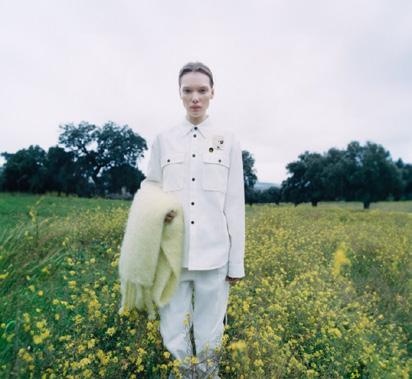
To achieve these targets, the Group has undertaken a coordinated re-organisation in Europe, within which it has strengthened the Energy Management Function in the Safety & Facility Department. As a result, operating guidelines and collaboration with specific local players have been enhanced.
To monitor consumption and emission trends and map supply points in detail, in 2021 OTB developed a monitoring dashboard, which collects technical information on energy usage, including energy from renewable sources, as well as cost and consumption data obtained directly from energy suppliers via an interface with their information systems or, where this is not possible, from energy bills.
The introduction of this Energy Management System enables OTB to conduct targeted analyses and checks and draw up progress reports. The data collected through the system is useful in improving building energy efficiency, with simple practical indications that can be adopted by all Group sites. For example, as indicated in the guidelines, the winter and summer switch-on times and temperature settings of heating/conditioning systems at the sites with highest energy consumption are kept under control. The Group has also planned investments in new LED lighting systems.
During 2023, it introduced the “OPÉRA Energie” platform for continuous improvements in consumption control, in this specific case in its French operations.
2023 Sustainability Report 99 Protecting Our Planet
ENERGY CONSUMPTION
OTB's energy procurement strategy is based on a diversified combination of energy sources. In environments such as stores, offices and warehouses, electrical energy is used mainly to power lighting, air-conditioning and electronic devices. For heating, both natural gas and electricity are used, the latter used with heat pump systems. Two high-efficiency cogeneration plants operate at the Diesel and OTB headquarters in Breganze, to which 17% of the natural gas purchased from the grid is allocated.
* Not including the helicopter
In order to optimize consumption management, the Group has invested in plants powered by renewable sources25 with the aim of increasing the energy self-sufficiency of the sites. Specifically, two new photovoltaic plants were installed in 2023: one at the headquarters of Diesel and OTB in Breganze and the other at the Staff International headquarters in Noventa Vicentina. An additional photovoltaic system was integrated with the acquisition of Pelletteria Frassineti, which resulted in a 24% increase in installed power compared to 2022.
24. The calculations are based on primary mapped consumption data. When precise figures were not available, consumption was estimated considering the type of factory, the floor area, the country and the number of months open/closed. The consumption estimate was calculated using the CURB database.
25. Renewable sources are natural resources such as wind, tides, sunlight and the earth's heat. These inexhaustible and clean resources can be used for the production of electricity and heating.
2023 Sustainability Report 100 Protecting Our Planet
Direct and indirect energy consumption (GJ)24 2021 2022 2023 Direct energy consumption* 135,307 112,512 113,755 Natural gas 113,912 89,669 91,267 Diesel 19,837 20,792 19,637 Gasoline 1,457 1,792 2,610 Methane 101 260 219 LPG - - 22 Indirect energy consumption 101,468 117,248 116,485 Electricity from non-renewable sources 59,530 55,985 50,876 Electricity from certified green energy (GO) 40,323 59,609 63,920 Electricity from own solar panels 1,615 1,654 1,689 % Renewable energy 41% 52% 56% Total 236,774 229,761 230,241
In 2023, the Group's share of energy from renewable sources, which includes self-produced energy from proprietary photovoltaic plants and energy purchased from the grid from renewable sources certified with Guarantees of Origin (GO), reached 56% of total electricity consumed (about 4 percentage points higher than in 2022).
Furthermore, considering the sites directly controlled by the Group in Europe, the percentage of energy from renewable sources reached 99%
To increase energy from renewable sources, OTB's Indirect Procurement Department, in cooperation with the Energy Function, has activated a Due Diligence activity to verify electricity supply contracts and, if necessary, convert them to contracts with energy from renewable sources guaranteed by GO certificates. Wherever possible, the energy supply of sites directly controlled by the Group (offices, stores, warehouses) is covered by framework agreements signed by the parent company or contracts signed by the individual Group company with the local supplier.
In cases where the energy supplier does not directly supply energy from renewable sources, the Group companies purchase GO certificates directly from intermediaries selected by the Indirect Procurement Department.
LEED® ENVIRONMENTAL CERTIFICATIONS
The commitment for a more responsible fashion industry also extends to the OTB Brands’ stores.
The LEED® protocol (Leadership in Energy and Environmental Design) is the world's most widespread voluntary building certification. Its goal is to increase the level of energy and water savings in buildings, while decreasing carbon dioxide equivalent emissions. It also considers the ecological quality of the indoor environment and other factors such as site selection.
Diesel was the first Brand of the Group to obtain certification for compliance with the LEED® Design and Construction Gold standard, for the following sites:
• Diesel London Offices
• Diesel New York Soho Retail
• Diesel Milano Showroom.
Meanwhile, OTB has begun a feasibility analysis to certify its stores to the LEED® standard in order to reduce its own CO2 equivalent emissions and thus the Group’s carbon footprint. A roadmap has been drawn up for stores that will follow the LEED® certification path from 2024.
2023 Sustainability Report 101 Protecting Our Planet
EMISSIONS
The OTB Group's Scope 1 emissions for 2023 are in line with those of the previous year. The minimal increase of 1.1% resulted from the acquisition of a new production site and greater use of company cars for business travels compared to 2022.
As in 2021, the Scope 1 calculation also includes emissions relating to the OTB helicopter powered by aviation kerosene, which fell by 5.0% from 2022.
For Scope 2 emissions, which refer to electricity used by the Group's facilities, the location-based approach found a marginal increase, while the market-based approach showed a decrease of about 4%. The distinction between the two reporting methods is that the market-based approach excludes emissions offset by the use of renewable electricity certified with guarantees of origin (GO). The emissions decrease estimated with the market-based method reflects the increase in purchases of GO-certified green energy, highlighting the Group's efforts to reduce its environmental impact in line with the goals of the Sustainability Strategy. Compared to the 2019 baseline, market-based emissions have decreased by about 40%.
In line with previous years, in 2023 the Group's Scope 3 emissions accounted for 97.1% of total emissions, highlighting the significant impact of emissions generated along the value chain.
OTB GHG EMISSIONS BY SCOPE
2023 Sustainability Report 102 Protecting Our Planet
1.4% Scope 1 1.5% Scope 2 97.1% Scope 3
CAR PARK AND CHARGING POINTS
As part of the transition to low-emission vehicles, in 2023 the Group increased the number of electric and hybrid vehicles in its corporate fleet by 21% compared to 2022. In addition, 10 new charging points were installed at the OTB, Diesel and Staff International sites. With the newly installed stations, the total number of charging points in Italy rose to 28. To facilitate the transition, agreements have also been reached for the corporate electric vehicles to be recharged at public charging stations throughout Europe.
26. The CO2eq calculation (which includes CH4, NO2, HFC, PFC, SF6 and NF3 emissions when present) was executed following the GHG Protocol. CO2eq emissions were calculated using emission factors sourced from: AIB (Association of Issuing Bodies), UK Department for Environment Food & Rural Affairs and Department for Business, Energy & Industrial Strategy, Eurostat database, CURB database, Pcaf database, Ecoinvent database, international Life Cycle Assessment (LCA) studies and documents, environmental product declarations (EPD) and the IEA 2023 database (International Energy Agency). It was not possible to include the emissions generated by the restocking of Refrigerant Gases in the Scope 1 calculation, as no precise data have been made available to date.
2023 Sustainability Report 103 Protecting Our Planet Scope 1 and 2 greenhouse gas emissions (tonnes of CO2eq)26 2021 2022 2023 Scope 1 7,678 6,065 6,131 Natural gas 6,257 4,547 4,638 Diesel 1,305 1,393 1,304 Gasoline 93 113 161 Methane 5 13 11 LPG - - 1 Helicopter 17 17 16 Scope 2 Scope 2 – Market-Based 6,581 6,476 6,247 Scope 2 – Location-Based 9,747 11,092 11,163 Scope 2 emission intensity indicators 2021 2022 2023 Scope 2 g CO2eq/kWh Market 233 199 193 g CO2eq/kWh Location 346 341 345 g CO2eq/sqm Market 30 19 18 g CO2eq/sqm Location 45 32 32
The results of the Scope 3 categories calculated and reported for the OTB Group for the threeyears 2021-2023 are shown below. Categories 8 (Upstream leased assets), 10 (Processing of sold products) and 13 (Downstream leased assets) were not included in the calculations, because they are not significant for the Group.
Scope 3 greenhouse gas emissions27 (tonnes of CO2eq)

27. When data were not available, estimates agreed with the relevant functions were used.
28. Scope 3 emissions were recalculated with respect to 2022, to unify the method used to collect data among the Group Production Hubs. Specifically, the calculation of emissions from the assembly of products (Category 1 - Purchased goods and services), from the use of products issued by the Group (Category 11 - Use of sold products) and from product end-of-life (Category 12 - End-of-life treatment of sold products) was updated. Within Scope 3, the calculation of Franchise emissions (Category 14) included emissions from the use of both natural gas and electricity. Finally, the data of categories 4 and 9 from the previous years (2022, 2021) were aligned with the methodology applied for 2023. For further information, see footnote 29.
29. As in previous years, Category 4 emissions. Upstream transportation and distribution and Category 9. emissions. Downstream transportation and distribution are shown together, given that until 2023 the OTB Group mapped all transportation without immediately distinguishing between upstream and downstream. Furthermore, in 2023 transportation directly managed by OTB was calculated using the TMS and Greenrouter, applying the Glec emission factors. To ensure a basis for comparison, the emissions of the two previous years were recalculated using the Glec emission factors.
2023 Sustainability Report 104 Protecting Our Planet
Scope 3 (tonnes of CO2eq) 2021 2022 2023 1. Purchased Goods and Services28 252,109 273,953 240,696 2. Capital goods 8,789 13,876 44,258 3. Fuel and energy-related activities 2,188 2,242 2,585 4. – 9. Upstream and downstream transportation and distribution29 17,134 23,860 23,783 5. Waste generated in operations 611 1,128 308 6. Business Travel 390 928 1,583 7. Employee Commuting 12,345 16,357 18,081 11. Use of sold products 58,409 62,004 56,351 12. End-of-life treatment of sold products 8,065 9,092 7,046 14. Franchises 2,374 2,285 2,610 15. Investments 10,203 16,326 14,979 Total 372,619 422,052 412,278
Within Scope 3, the categories “Purchased goods and services” and “Use of sold products” are the most significant. “Purchased goods and services” accounted for 56.7% of emissions. Specifically, category 1 groups together emissions from the purchase of raw materials, finished products, packaging and services. The purchase of raw materials had the greatest impact, despite a 17.9% decrease in emissions compared to 2022.
COMPOSITION OF CAT. 1 EMISSIONS PURCHASED GOODS AND SERVICES
2023 Sustainability Report 105 Protecting Our Planet
Focus emissions cat. 1 Raw materials 1.3% Packaging 57.9% Raw materials 14.0% Assembly 26.8% Services 2.2% Organochemicals 3.5% Wool 4.6% Other 11.5% Leather 15.5% Polymers 62.7% Cotton
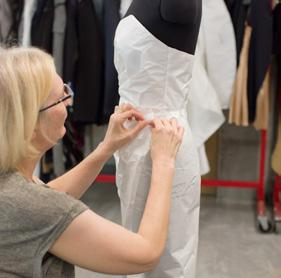
Of purchased materials, cotton accounted for 58.2% of total raw materials, followed by polymers and leather, making cotton the most impactful material in terms of emissions produced (62.7% of total emissions from raw material purchases).
The emission intensity of Category 1, calculated on the basis of raw materials purchased (including packaging), shows a 3.4% decrease in emissions per kg of product compared to 2022.
The second most impactful category is category 11, “Use of sold products sold”, which accounted for 13.3% of the total Carbon Footprint, reflecting the carbon footprint associated with the use of products by consumers throughout their life cycle.
Specific attention was given to calculating the impact arising from the regular care of products (washing, ironing, drying), considering various use scenarios. Other significant categories include “Capital goods” and “Upstream and downstream transportation and distribution”, which accounted respectively for 10.4% and 5.6% of total Scope 3 emissions. The data highlight the impact of the Group's business infrastructure and logistics on the overall emissions profile. Specifically, emissions in category 2 “Capital goods” more than doubled as a result of extraordinary investments such as those made for the Maison Margiela's new headquarters in Paris.
Finally, in 2023 there was an increase in business travels and employee commuting due to the normal resumption of representation activities and the reduction of smart working.
2023 also saw a decrease in Category 5 emissions, due to an increase in waste sent for recycling and recovery and greater detail in the information collected.
During 2023, total emissions, including Scope 1, Scope 2 and Scope 3, decreased by 2.3%, marking a reversal of the upward trend in emissions generated by the OTB Group in previous years.
2023 Sustainability Report 106 Protecting Our Planet
Scope 3 emission intensity (SBTi target) u.m. 2019 2020 2021 2022 2023 Scope 1, 4&9 emissions on tonnes of purchased raw materials and packaging tCO2e/ton 20.6 22.2 21.3 23.5 23.9
6.2 OTB LOGISTICS SYSTEM
Logistics flows, managed by OTB's Logistics Department, are closely linked to the activities of the Brands for which they operate.
The main functions of the Department include:
• collecting finished products from suppliers and transferring them to the finished product warehouses;
• managing finished products handling at warehouses, during receipt, storage, allocation to customer orders, picking, packing and preparation of shipments;
• organising distribution to direct channels (Retail, Outlets, E-commerce);
• organising distribution to indirect channels (Wholesale, Off price);
• managing reverse logistics flows from Retail and Outlets to the finished product warehouses.
Depending on the sourcing model used by the individual Brand, the Logistics Department handles a variety of inbound flows and a variety of transfers between the primary hubs and the regional distribution centres.
For Brands whose sourcing is concentrated in Italy/Europe, finished products are transferred from suppliers to the primary hub. After allocation to customer orders, the shipments are prepared to transfer the finished products to the regional distribution centres. From each regional distribution centre, distribution is then organised to the customers in the region.
For finished products allocated to a final customer order, the process involves pre-packaging at the primary hub and a cross-docking transit, i.e., keeping the packaging made in the primary hub at the regional distribution centre.
For finished products ordered by branches and intended for reassortment, the process involves a bulk transfer from the primary hub to the regional distribution centre. At the regional distribution centre, these finished products are shelved ready for subsequent re-orders by direct stores or indirect customers.
For Brands with sourcing distributed in various regions around the world, OTB's Logistics Department manages transfer flows from the suppliers to the primary hub or directly to the regional distribution centres, depending on the final destination of the products.
All the hubs and regional distribution centres are set up for distribution of finished products for both the business-to-business and the business-to-consumer channels.
To optimise and reduce the impact of the transportation system, OTB employs an AI system that presents operators with the most cost-effective and consumption-efficient solutions. The AI assessments are supported by the Transportation Management System (TMS), a software system for the planning, execution, monitoring and optimisation of the movement of goods from suppliers to customers through the different warehouses.
2023 Sustainability Report 107 Protecting Our Planet
In the last few years, the Logistics Department has also expanded the role of automation in its warehouses. Brave Kid's new warehouse, operational from July 2022 and extended in 2023, and Staff International's warehouse on the Isola Vicentina Campus, operational from July 2023, are the first success stories. Thanks to the innovative automation system, conditions for picking operators have been improved through the introduction of standardised ergonomic workstations, the reduction of use of moving equipment such as forklift trucks, and the elimination of most of the risks associated with man-machine interaction. The system has not only improved occupational safety, it has also optimised the storage areas given equal volumes of garments, with a reduction of about 75% in occupied surfaces, and produced a 14% reduction in the energy requirement for lighting in the warehouse.
Furthermore, a pilot project was launched in 2023 to reduce the use of disposable cardboard boxes for transporting garments from suppliers, and introduce reusable polypropylene boxes that are recycled by the supplier at the end of their life. The initiative was implemented for the transportation of denim from suppliers in Tunisia to the Isola Vicentina warehouse. Also with a view to reducing impact, the Logistics Department is considering other solutions to minimise waste and the consumption of materials through the gradual introduction of packaging and certified materials from forests managed in accordance with strict environmental standards.
In line with the Climate Strategy, OTB's Logistics Department is committed to reducing emissions through continuous improvement in warehouse, transportation and packaging management processes. This includes the introduction of the first full electric truck, to eliminate CO2 emissions from raw materials transfers between the OTB Group’s facilities in the Veneto region.
THE DIESEL LOGISTICS PROJECT “LOCAL HUBS”
The Diesel Local Hubs project, a strategic initiative designed to improve transportation speed and efficiency for Diesel products and cut transportation costs and emissions on product returns, continued in 2023. Launched in August 2021 with a pilot trial in the United Kingdom, its purpose was to channel all returned orders to a local hub in the region, so avoiding a return journey to the central warehouse in Italy and making it possible to organise a second delivery for the same item within the UK on receipt of a new order. By remaining in the local hub, returns were managed more efficiently in terms of time, costs and footprint. A preliminary stage of the pilot project was also launched in Germany and Switzerland, where returns are stored in a local hub for about seven days, so that they can be collected and returned together in a single shipment to the central warehouse in Italy.
2023 Sustainability Report 108 Protecting Our Planet
6.3 PROTECTION OF THE OCEANS AND WASTE MANAGEMENT
The health of the planet is closely linked to the protection of the oceans and marine species. These ecosystems play a crucial role: they absorb CO2, generate oxygen and provide food for the global population. It is therefore essential to consider issues such as acidification of the oceans and the decline of marine biodiversity, both of which are influenced by plastic and microplastic pollution.
To this end, the Group has identified specific targets as part of its Sustainability Strategy and in line with “The Fashion Pact”, such as, but not limited to, elimination of superfluous virgin plastic in B2C packaging by 2025 and B2B packaging by 2030, and use of recycled plastic where virgin plastic cannot be eliminated.
As part of the transition to a more responsible fashion system and in line with the objectives mentioned above, the Group has taken important steps to improve the environmental performance of packaging. For example, virgin plastic polybags have been replaced in B2B by polybags made of recycled plastic and recyclable materials. In addition, all the Group Brands have pledged to use certified materials from responsibly managed forests for paper and cardboard packaging. With this in mind, in 2023 Diesel and Marni adopted hangers made from recycled materials for garment shipments in order to limit the use of virgin resources and contribute to an overall reduction in environmental impact.
In the OTB Group, 44.7% of packaging purchases relates to product packaging, which includes labels and shopping bags, 39.1% is logistics packaging, while 12.6% is for purchases for the retail channels, such as clothes hangers. The remaining 3.6% relates to the e-commerce channel.
2023 Sustainability Report 109 Protecting Our Planet
1.1% Metal 2.2% Textile fibres 21.1% Plastic 75.5% Paper and cardboard 0.1% Other
PACKAGING PURCHASES BY TYPE OF MATERIAL
The purchase of paper and cardboard packaging accounts for 75.5% of the total. Of this percentage, 43.4% comes from recycled materials, while 9.2% is certified as coming from responsibly managed forests. Plastics account for 21.1%, a decrease of 3 percentage points compared to 2022. The remaining 2.2% consists of textile fibres, metals and other materials.
Waste management
Reducing the generation of waste, from both packaging and processed textile fibres, is a challenge that the OTB Group is committed to addressing.
The objective is to promote a cultural change that extends beyond the organisation and encourages customers to take a responsible approach to products and the product life cycle. In line with the Global Compliance Programme, OTB closely monitors the risk of environmental crime, working with authorised transporters to ensure proper recovery of waste. It pays particular attention to hazardous waste, where disposal procedures comply with current legislation. Data monitoring and collection processes comply with regulations on manufacturer traceability and waste segregation.
The Group Safety & Facility Department, which oversees waste management, coordinates and integrates environmental legislation. It keeps track of solid waste management and disposal, as well as water discharges and emissions into the atmosphere. In this regard, in 2023 the Department launched a program to ensure selection of waste handlers in line with the objectives of the Group Sustainability Strategy and the related commitment to limit waste sent to landfill.
30. The rise in purchased packaging volumes is due in part to improved mapping of packaging typologies and volumes by the Group Brands and Production Hubs.
2023 Sustainability Report 110 Protecting Our Planet
Packaging by type of material (tonnes)30 2021 2022 2023 Textile fibres 27.2 18.4 61.2 Metals 72.5 27.1 30.8 Paper and cardboard 2,488.1 2246.4 2,188.2 of which recycled paper - 936 901.3 of which certified recycled paper 305.9 Plastic 148.6 728.2 463.9 of which recycled plastics 0.3 526 272.9 Other (paints and rubber materials) 0 9.2 3.5 Total 2,736.4 3,029.3 2,747.6
Most of the waste produced by the OTB Group cannot be classified as hazardous (hazardous waste accounts for 0.3% of the total). The waste it generates consists 40.6% of paper and cardboard and 25.3% of mixed packaging. Wood accounts for 13.6%, followed by textiles at 4.9%, while a minimal amount is attributable to construction and demolition (bulky waste), organic liquid waste, mixed municipal waste and plastics.
BREAKDOWN OF WASTE GENERATED IN 2023
1.4% Other waste 31
2.6% Plastic
3.4% Mixed municipal waste
4.0% Liquid organic waste
4.2% Construction and demolition
40.6 % Paper and cardboard
4.9% Textile fibres
13.6% Wood
25.3% Mixed packaging
In 2023, the volume of waste generated by the Group increased by 37.1% from the previous year (from 1,670 tonnes in 2022 to 2,290 tonnes in 2023). The increase was largely due to the enlargement of the reporting scope and greater data granularity. The figure also includes estimates32 for sites where detailed data collection was not possible. The increase in waste was also attributable to the inclusion of Pelletteria Frassineti, which was acquired in 2023
31. Other waste includes paint and varnishes containing organic solvents or other hazardous substances, printer toner, batteries and accumulators, organic waste containing hazardous substances, adhesives, bulky waste, fluorescent tubes and other mercurycontaining waste.
32. The office estimates were made starting from the actual data for the offices in Italy, and then computing proportionate estimates based on the number of employees at each site. For the stores, actual data was collected for some Italian sites; for stores for which actual data were not available, waste was estimated on the basis of the sites’ floor area.
2023 Sustainability Report 111 Protecting Our Planet
6.4 WATER STEWARDSHIP AND CHEMICAL MANAGEMENT
Water stewardship
The textiles and tanning industries use considerable volumes of water in their operations, e.g., to grow cotton, dye materials, wash and process leather and skins, reaching an annual consumption of approximately 79 billion cubic metres of water. The sector is also believed to be responsible for around 20% of water pollution worldwide, in particular from dyeing and finishing operations.
Therefore, responsible water stewardship and the careful use of chemicals are two of the key topics of the OTB “Be Responsible. Be Brave.” strategy, and the Group Brands are actively engaged in selecting suppliers who adopt production methods that reduce water consumption and pollution.
Specifically, Diesel is moving ahead with measures to cut water consumption and use of chemicals in production, particularly for its denim collections. The Brand continues to implement innovative techniques for garment treatment and finishing, which deliver sharp reductions in the overall use not only of water, but also of chemicals. These innovative processes include the use of synthetic pumice stones, laser finishing technology, nebulisation, ozone treatment and low-impact substitutes for conventional potassium permanganate.
Following a similar strategy, Staff International works with suppliers who use innovative nebulised saturated steam washing systems instead of the traditional methods that require hot water and conditioner. This technology eliminates the need to add chemicals and helps prevent the production of wastewater contaminated with impurities or sludge.
Responsible management of chemicals
OTB is committed to phasing out hazardous chemicals from the entire product life cycle to protect the environment, factory workers and end consumers, in line with international regulations and the Group's environmental guidelines. In 2021, the Group joined the ZDHC (Zero Discharge of Hazardous Chemicals) Foundation's Roadmap to Zero Programme to develop a water and chemical management strategy based on the leading industry standards for all suppliers that employ wet processes. As a ZDHC Contributor, the OTB Group has also undertaken to engage its supply chain by 2030. Suppliers are required to register with the ZDHC Gateway, the largest global database of “safer” chemical alternatives for the textile, clothing and footwear value chain. In addition, suppliers are also encouraged to follow the Supplier To Zero path, aiming to reach the “Foundational” and then the “Progressive” level. In this process, the Group companies support suppliers by monitoring their progress and ensuring compliance with the established protocols.
2023 Sustainability Report 112 Protecting Our Planet
Since 2022, OTB has adopted a Restricted Substances List (RSL) & Product Safety Requirements (PSR) to regulate management of chemicals for all the companies in the Group. The document, which is reviewed annually, supplements the regulatory restrictions for global markets on chemicals used in manufacturing with more stringent requirements and standards, such as the latest guidelines of the ZDHC Manufacturing RSL. All the companies have integrated the RSL into their contracts with finished product and raw material suppliers, together with the Code of Conduct and the raw material procurement standards.
In 2023, the latest version of the document was released, with important regulatory updates focusing on packaging products and their requirements and new targets for reducing potentially hazardous chemicals. The latest update of OTB's Restricted Substances List (RSL) was circulated within the Group and to external suppliers, together with guidelines for achieving the ZDHC targets, with a special emphasis on the Supplier to Zero process and its progress. Suppliers are required to subscribe to and sign the RSL as part of their onboarding process.
In general, besides complying with the limits and prohibitions imposed by the Group RSL, the OTB Brands are focused on selecting certified raw materials, which include additional restrictions and guidelines for chemical management.

2023 Sustainability Report 113 Protecting Our Planet

6.5 PROTECTING BIODIVERSITY
Fashion has a significant impact on biodiversity due to its production practices and intensive use of resources. Protection of biodiversity is an important challenge.
OTB is drawing up an analysis of its biodiversity impacts so that they can be quantified, monitored and reduced throughout the supply chain. The document will serve as a basis for the formulation of an internal biodiversity policy that will guide all Group brands and partners in the selection of appropriate measures.
Diesel and the focus on biodiversity
Diesel has long been committed to cutting its impact on biodiversity, opting to purchase organic, recycled and regenerative cotton (which requires less water and fewer chemicals than conventional cotton) and to use alternative fibres such as certified viscose, which ensure more responsible sourcing, as well as paper and cellulose materials with FSC® certification.
As an active member of The Fashion Pact, Diesel participates in the coalition's initiatives, such as training and analyses conducted by their platform and other member bodies. Diesel has also joined The Fashion Pact's “Unlock Platform” project to set up a collective sourcing platform that helps farmers make the transition to lower-impact cotton.
During the last quarter of 2023, Diesel began an environmental risk analysis focusing on three key issues: climate, biodiversity and water. The investigation involves two stages: identification of hotspots in the Brand's supply chain and analysis of the related environmental risks. The objective of the analysis is to identify the Brand's sourcing areas subject to the greatest environmental risk related to one of the three key issues. The results obtained will enable the Brand to develop a sourcing strategy that also takes these impacts into account and works to mitigate the associated risks.
2023 Sustainability Report 114 Protecting Our Planet



BRAVE TOGETHER
BRAVE TOGETHER
7
7
People are at the heart of the OTB Group Strategy and Brave Together is the pillar that defines the Group's commitments to the material topics detailed below:
• Responsible governance and ethical business
• Social impact Diversity, equity and inclusion
• Employee well-being, health and safety
• Attraction and loyalty
Every employee is valued as a unique individual and integral part of the “Only The Brave” family. In 2023, the OTB Group drew up a new strategy for the management of its human resources – the Braves – whose goal is to create an environment that fosters professional growth by empowering people’s unique and distinctive capabilities and encouraging talent through inclusion and diversity policies and recognition of merit.
The new “2023-2025 People Strategy” is based on three macro-areas:
MACRO AREAS POLICIES AND PROGRAMMES
Brave Engagement & Development
The improvement of the employee experience towards a model of excellence that supports people at all stages of their professional life, enhancing their uniqueness and stimulating their growth and psychophysical well-being.
• Support for diversity, equity and inclusion
• Employee engagement and internal communication programmes
• Performance management system
• Competitive total reward policies
Brave Leaders & Talents
The development of leaders and talents to guide the Group in achieving its growth ambitions and guarantee the organisation’s long-term sustainability.
• Leadership and managerial upskilling
• Talent management, international mobility and job rotation
• Employee branding and talent attraction strategy
Daring Organisation
The construction of an increasingly agile and efficient organisational model to facilitate decision-making and guarantee excellent, competitive operation.
• Resource sharing, best practices, processes, tools, initiatives and services, at global level
• Processes and testing of new working models
• Change management programmes
These objectives are set out in a detailed action plan drawn up and launched during 2023. Effectiveness and progress will be regularly monitored through specific KPIs and measurement criteria.
The OTB Group leads and supervises the People Strategy, preserving the distinctive features of each Brand and providing ample room for independent decision-making at local level.
Consistently with its philosophy of flexibility and innovation, the Group continually tests new working methods by taking advantage of the possibilities opened up by technology, while ensuring its people’s well-being.
118
7.1 BRAVE ENGAGEMENT & RESOURCE DEVELOPMENT
Diversity, equity and inclusion
The promotion of inclusivity, diversity and talent in the broadest sense within the organisation continues to be one of the cornerstones of the OTB Group.
Since 2020, as part of the Diversity, Equity and Inclusion Strategy (DE&I), several projects have been launched, both at Corporate level and in the individual Group Companies, to spread a corporate culture that values diversity, fosters equity and inclusion and provides concrete support for the business, implementing the policies necessary to achieve these goals.
In 2023, the OTB S.p.A. and Diesel S.p.A. companies obtained Gender Equality Certification (UNI/PdR 125:2022) under Italy's National Recovery and Resilience Plan (PNRR), after passing a six-indicator assessment process conducted by a world-leading company in inspection, compliance verification and certification services. Specifically, the assessment focused on corporate culture and strategy, governance, human resources processes, growth and inclusion opportunities for women, wage equality, and support for parenthood and the work-life balance. Mention should be made of the crèche and kindergarten services that have been in operation for several years, the smart working policies supporting employees’ work-life balance, as well as numerous training courses and meetings for parents, unconscious bias, inclusive language and prevention of gender harassment in the workplace.
In conjunction with gender equality certification, a DE&I Committee was created at Group level to evaluate and approve initiatives in the Diversity, Equity and Inclusion macro areas. The Committee members are the Group Chair, the Chief People & Organisation Officer (CP&OO), the Group Chief Sustainability Officer (CSO) and the CEOs of the companies that head the Brands at central and regional level in the different areas of the world where the Group operates.
In addition, in 2023 the Group adopted a DE&I Policy, which specifies the principles, objectives and guidelines underpinning the Group's commitment to Diversity, Equity and Inclusion, and a Gender Equality Policy designed to ensure a fair, safe and stimulating working environment for all employees, collaborators and partners. The Gender Equality Policy sets out the Group's principles and guidelines concerning working life in OTB, such as the selection and hiring procedure, the performance and talent management systems, training and development, pay and work-life balance, as well as parenting issues and the prevention and reporting of harassment in the workplace.
Also during 2023, a 2023-2025 Strategic Plan focused on Gender Equality was drawn up. Besides establishing objectives for the Group, the Plan sets specific targets for the companies that already have UNI/PdR125:2022 certification and for those that are starting the certification process. The objectives and actions contained in the 2023-2025 Strategic Plan cover seven strategic areas: governance, selection and hiring, professional growth management, wage equality, parenting and care, work-life balance and abuse prevention activities.
2023 Sustainability Report 119 Brave Together

Even at the level of the individual Brands, there is no shortage of initiatives promoting diversity and inclusion. One example is Diesel's collaboration with “The Community”, a multidisciplinary art institution, and the “Tom of Finland Foundation”, a non-profit organisation that promotes inclusiveness and acceptance of diversity. The Tom of Finland Foundation was established to conserve and promote the work of Tom of Finland and many other queer artists in the LGBTQIA+ community who have been victims of discrimination and often forced to work anonymously. Continuing on from the two exhibitions held in 2022, one in Venice and one in Paris, and the special capsule collection, in 2023 Diesel supported “The All Together Clubhouse” exhibition held in New York in March.
Also in 2023, the New York head offices of the Brands in the OTB North America Region jointly celebrated Pride with various events, and for International Women's Day organised a range of activities with the Women for Women International association and invited guest speakers.
Gender parity in OTB
In 2023, the OTB Group recorded an overall 9.5% increase in its workforce, to 6,751 employees.33 The growth of the workforce was evenly distributed between men and women, maintaining a 64.4% female presence in the various professional categories.
33. The number of employees does not include Diesel Fashion India Reliance Pvt. Ltd. as the precise figure was not available at the reporting date. This limitation also applies to the other HR data indicators in Chapter 7 and the annexes. See the GRI Content Index for more details.
2023 Sustainability Report 120 Brave Together
In line with 2022, women in managerial positions34 remained at 53.9%, while women in the Professionals category accounted for 66.6%.
EMPLOYEES BY GENDER AND CATEGORY GENDER
The employee breakdown reflects the company's strategy of proximity to the customer: 56.7% work in the Retail sector, as sales personnel, 42.4% handle administrative and strategic functions in the head offices, while the remaining 0.9% are in charge of showroom management. This distribution ensures effective coordination between communication and business operations, while maintaining direct contact with customers.
EMPLOYEES BY GENDER AND DIVISION
In this crucial phase of the Group's development, OTB has confirmed its commitment to social responsibility by entering into open-ended employment contracts with 83.7% of its staff. Only about 0.4% of employees work on an on-call or hourly basis. Of the total, 85% of employees have full-time contracts.
Compared to 2022, the number of non-employed workers decreased to 205 in 2023. They include 8 directors of companies based outside Italy and 109 temporary agency workers.
34. OTB’s employees are classified according to the internal job grading system, which adopts the “International Position Evaluation” system (IPE) developed by Mercer. Employees are divided into three categories: “Executives & Directors”, “Managers” and “Professionals”. “Executives & Directors” includes all the Executive and Senior employees. “Managers” comprise all Master and Expert collaborators. “Professionals” are tasked with specific operational responsibilities and/or duties assigned by Managers.
2023 Sustainability Report 121 Brave Together
68.2% 31.8% 53.9% 66.6% 46.1% 33.4% Manager Executive & Director Professional Men Women 64.4%
64.0% 64.5% 36.0% 35.5% Store Head O ice 83.1% 16.9% Showroom Men Women
35.6%
Men
Women
Diversity and uniqueness in OTB
Confirming the close relationship with local communities, Group and Brand employees worldwide are evenly distributed, even though the head offices of the Group Brands and Hubs are located in Italy (35.3%).
After Italy, Japan is the second-largest area with 24.4% of total employees, followed by the rest of Europe with 17.9%. The remaining employees are in the APAC region, America and India.
EMPLOYEES BY GEOGRAPHICAL AREA
In addition, OTB guarantees ensures equal access to employment by providing opportunities for workers with disabilities. In 2023, the Group employed 125 people from vulnerable groups, an increase of 23.8% compared to 2022.
Another important dataset refers to the generation-based distribution of personnel. To maintain an optimal balance between innovation and experience, again in 2023, 34.6% of the workforce were employees under 30, 53.3% belonged to the 31-49 age group, and the remaining 12.1% classified as over 50.
2023 Sustainability Report 122 Brave Together
24.4% 17.9% 14.9% 7.5 % 35.3% Italy Japan Europe (excluding Italy) America APAC (excluding Japan) 2.0% 32.3% 34.2% 30-39 18-29 ≥60 10.3% 50-59 21.2% 40-49
EMPLOYEES BY AGE GROUP
The presence of an appropriate mix of experience and innovation is ensured by a balanced distribution of employees by length of service/employment, an indicator that also applies to internal retention. On one hand, 66.4% of employees joined the Group in the last 5 years, on the other hand 20.6% have been with OTB for more than 10 years.
EMPLOYEES BY LENGTH OF SERVICE
5.2% 21 to 30 years
14.7% 11 to 20 years
13.0% 6 to 10 years
Employee engagement and communication
0.7% More than 31 years
66.4% Up to 5 years
Employee engagement is a fundamental aspect of human resources management, a catalyst for innovation, courage and effectiveness, contributing positively to the social impact of the company. In the fourth quarter of 2023, the Group conducted its first engagement survey to assess employee satisfaction and well-being by identifying strengths and areas that require improvement. The results, which will be shared in the first quarter of 2024, will drive actions to improve employees’ experience and promote a positive work environment. During 2023, Diesel introduced a podcast of interviews with top management, allowing employees to learn about the activities and commitment of each function in contributing to the success of the Brand. Communication, listening and continuous engagement of the employees (the Braves) are equally important factors in achieving high levels of commitment and satisfaction, together with a detailed understanding of the organisation’s objectives as they relate to each individual’s role. To this end, OTB has developed an internal communication plan of events, initiatives and digital tools such as the “People Hub” intranet to create opportunities for global sharing and participation.
Performance management: the importance of developing a feedback culture
The OTB Group attaches great importance to sharing feedback as a way of boosting the value of human capital and increasing transparency in everyday relations and activities. In 2021, it rolled out a new tool, People Development, which has introduced a Continuous Feedback approach in all Group companies at global level.
2023 Sustainability Report 123 Brave Together
The Continuous Feedback process takes a holistic approach based on four vital principles – simplification, engagement, observation and caring – to achieve on-going dynamic alignment on current activities, so providing a flexible means of interaction for people to share and plan their professional growth.
The system uses a platform to organise structured sessions for employees and managers to exchange feedback and opinions on a quarterly basis.
In the second half of 2023, the Group began a review of the performance management system, with the launch scheduled for early 2024. The new system will incorporate advanced monitoring and analysis procedures to mitigate possible gender bias and will introduce an ESG indicator in the performance scorecards, impacting the annual MBO incentives for all Group beneficiaries.
The remuneration system
OTB adopts a transparent remuneration system, which is designed to provide a competitive pay structure and incentivise employees to achieve excellent results, and is free of gender distinctions or any other potentially discriminatory factor.
Pay consists of a fixed salary, and a variable component based on various types of bonus.
The Group's managerial population at global level benefits from a Management By Objectives (MBO) system, i.e., an incentive linked to company results and specific indicators, identified according to the position and organisational scope of reference. The incentive structure is the same for all Group beneficiaries. The corporate population that is not covered by an MBO system benefits from other types of bonus according to local market practices, while store personnel are involved in commission schemes depending on their role in the store.
OTB also provides a variable Long-Term Incentive (LTI) for top management. The LTI arrangements were reviewed in 2022 to realign the model criteria and structure with best market and peer practices.

2023 Sustainability Report 124
In line with the principles of merit and equity, the Group conducts an annual pay review.
Employee pay reviews follow the guidelines of the People & Organisation Department, taking account of performance, results achieved, proven leadership capabilities and market benchmarks.
The annual pay review process includes gender pay gap analysis and measures to check for gender bias or discrimination in the planning of pay increases. The ratio between men and women’s pay has made positive progress,
BASIC SALARY RATIO WOMEN/MEN IN 2023
reflecting the Group’s work on gender equity, with the goal of achieving further improvements in the indicators in the coming years.
Confirming the virtuous practices introduced by the Group, the gender pay gap has narrowed along the entire organisational chain, with a particular improvement in the Professionals category (+3 p.p. on both total remuneration compared to 2022 and basic salary compared to 2022).
REMUNERATION RATIO WOMEN/MEN IN 2023
For reasons of confidentiality, the above metrics are not disclosed. Since the Group or its subsidiaries are not publicly traded companies and therefore not required to disclose their remuneration and fee policy for directors and senior managers, no information is published that could indicate the remuneration of specific individuals.
In any case, the Group continues internal monitoring of the indicators in question, for information purposes, to analyse internal equity and conduct peer comparisons.
2023 Sustainability Report 125 Brave Together
Executive & Directors Managers Professionals 95,0% 93,0% 95,7% Executive & Directors Managers Professionals 81,9% 91,1% 94,9%
Executive & Directors Managers Professionals 95,0% 93,0% 95,7% Executive & Directors Managers Professionals 81,9% 91,1% 94,9%
7.2 BRAVE LEADERS & TALENTS
The training system
The OTB Group recognises the crucial importance of training for the professional development of employees. These elements are regarded as fundamental pillars to ensure the organisation's longterm growth and success, as well as to foster the achievement of the Group's strategic objectives and promote a dynamic working environment, capable of adapting to the evolving fashion industry.
The OTB Group's commitment to training is reflected in the rise in investments over the past two years (with an increase of 21,321 training hours provided compared to 2021), in order to create a more effective and efficient learning system. The system includes a wide range of innovative courses and communication and leadership tools for all employees, designed to foster flexible and stimulating learning.
The Group's training offer consists of online courses, accessible both on-site and remotely, thanks to the Group's digital Learning Management System, as well as live, in-person or webinar learning and discussion initiatives, to promote a culture of continuous learning and flexible, inclusive and diversified forms of training.
During 2023, in addition to the investment in managerial, technical-professional and language training programmes , the Group paid special attention to raising awareness of Diversity, Equity and Inclusion (DE&I) issues, providing more than 2,000 hours of training on these topics. Among the most innovative initiatives were courses for parents and new parents, as well as modules on “Inclusive Language” , “Unconscious Bias” and the prevention of gender harassment in the workplace to foster a working environment based on respect, a sense of belonging, freedom of expression and psychological safety.
Another highlight was the organisation of training and social awareness events for employees in cooperation with the OTB Foundation. Significant events included the “Never Again” initiative, for the prevention of gender-based violence , and the “Disability and Work: New Perspectives” event, which highlighted the importance and positive impact of disability inclusion in the workplace.
The graph shows training hours by category, for a total of approximately 49,000 hours. Professional and technical training accounted for 67.7% of total hours, followed by management training (16.0%) and health and safety training (7.5%). Language training (5.7%) more than doubled compared to the previous year.
2023 Sustainability Report 126 Brave Together
PERCENTAGE OF TRAINING HOURS BY TOPIC
Privacy and security
1.9%
Language training
5.7%
7.5% Health and safety training
16.0% Management training
1.2%
Code of Ethics and compliance with Lgs.Decree. 231/2001
67.7% Professional and technical training
Vertical Training: Diesel For Responsible Living & Celebrate Individuality
In 2023, Diesel continued activities associated with the Celebrate Individuality pillar of its Sustainability Strategy, by organising specific training to inform employees about the sustainability content of its collections and explain how to communicate this content through the different channels. Training sessions were held during the presentations of the new collections, and meetings were organised for all store managers in Europe. Work is underway to extend the initiative to the other areas of the world where Diesel operates during 2024. The ultimate goal is to raise the awareness of the sales force and provide them with the necessary skills to handle sustainability issues effectively, turning them into important product features that they can discuss with confidence. To this end, Diesel's sustainability department, in collaboration with the HR team, is also working to develop interactive tools and modules for educational and refresher purposes. These will be made accessible to all store employees via D-velop, the new internal communication platform.
Marni, Sustainability time
As part of a wider “Sustainable time” initiative, Marni has introduced an innovative work time management model to enable people to compress or expand their working day. Sustainable time, in its various forms, helps workers integrate work time into their daily lives, giving Marni a competitive positioning on the jobs market and also helping to reduce gender differences. Personalised time management tailored to specific routines helps people combine their personal and organisational needs, and also simplifies completion of administrative tasks.
Staff International sustainability
Awareness of the impact of the fashion business supply chain on the environment and workers’ conditions can be an important starting point for the transition to sustainable models.
2023 Sustainability Report 127 Brave Together
Based on this idea, monthly newsletters on the topic of sustainability were distributed to Staff International employees from March to December 2023. The project, developed by Staff Academy in cooperation with the sustainability team, covered topics such as the transition from conventional products to items with a lower environmental impact, ESG aspects relating to the supply chain and the environmental and social impacts of the fashion industry.
The purpose was to highlight the impacts behind day-by-day decisions and offer insights for new development strategies, consistently with the OTB Group's objectives and values.
Talent attraction and retention
The Group’s ability to attract and retain new talents plays a crucial role in its 2023-2025 People Strategy. Because it constantly strives for excellence, OTB is always looking for individuals with distinctive qualities and robust technical skills such as critical thinking, customer centricity, experimentation, collaboration, entrepreneurial approach and execution ability.
To ensure effective management of the hiring process at global level, the Group deploys an internal policy that outlines the key stages of the recruitment process and is supported by a global digital recruiting platform
The process consists of six steps, from advertising of job vacancies to onboarding of new talents. Hiring for professional positions is managed at local level, while specific managerial and executive profiles are selected and discussed with the central team to ensure alignment with OTB’s values and corporate identity. Given the Group's growth in the last few years, potential candidates are monitored and assessed according to the needs of the individual professional areas. During the onboarding stage, the values, approach and mission of the Group, as well as policies, processes and other information useful in daily business life are conveyed to the new employee.
Turnover 35
Given the competitiveness and dynamism of the fashion luxury sector, voluntary negative turnover36 in 2023 was 26.3%, with store employees (36.9%) accounting for a larger proportion than Head Office employees (12.4%).
The Group hired 2,456 employees, reflecting significant growth mainly due to acquisitions, new branches and store openings. The total figure consists of 926 men and 1,530 women, who represented 62.1% of the new hires. As a result of this growth, positive turnover37 stood at around 46.8%.
Job vacancies are also publicised internally through a centralised job posting system, as a means of promoting internal growth, investing in the potential of OTB employees and raising the retention rate.
35. Total contract movement considers all incoming and outgoing contracts for each legal entity, excluding intercompany transfers (which are neutral at Group level) and on-call contracts. The number of incoming contracts includes employees of the Frassineti company, which was acquired in 2023.
36. Negative turnover is calculated as the ratio of total voluntary resignations (1,413 in stores and 362 in head offices) to the number of employees at the end of the year (6,751).
37. Positive turnover is calculated as the proportion of employees who joined during 2023 to the total number of employees at 31 December 2023.
2023 Sustainability Report 128 Brave Together

Relations with the academic world and support for young talent
The OTB Group maintains relations with academic and educational institutions, such as universities and professional institutes, and is involved in the organisation of numerous Career Days and job fairs to make contact with the new generations and new talent.
During 2023, OTB opened the doors of its head office to visits by classes of students, to give them the opportunity to see for themselves what life is like in the company and its departments. OTB also took part in Digital Diversity Week: an innovative and entirely digital event created through the partnership between Jobmetoo by Seltis Hub and Start Hub Consulting to facilitate meetings between companies and candidates with disabilities or from protected categories.
OTB also collaborates with universities and vocational institutes in providing courses dedicated to the fashion textile industry, for the purpose of attracting specialised stylists and technicians. During 2023, the Group offered 39 internships at its headquarters, bringing the total to 88.
The first edition of the IT Academy was held, to train and attract technology experts to manage the main application components of the fashion industry's ICT architecture. The training consisted of face-to-face and on-site sessions over a period of six months.
OTB also supports international competitions such as the ANDAM Award, which provides financial support and mentoring to young designers from emerging Brands and start-ups, and the Yu Prize. The Yu Prize is an award for the most promising and pioneering talents in the Chinese fashion industry, founded by Wendy Yu in 2020 in cooperation with Shanghai Fashion Week and the Fédération de la Haute Couture et de la Mode (FHCM). In the latest editions, OTB offered mentoring and coaching programmes to selected talents. The Group Chair, Renzo Rosso, and the Diesel Sustainability Ambassador, Andrea Rosso, were members of the jury.
2023 Sustainability Report 129 Brave Together
In 2023, for the twentieth consecutive year, OTB was one of the main sponsors of the International Talent Support (ITS) competition in Trieste, where it presented the OTB Award. The winner received a cash prize and the opportunity to make contact with the Group Brands to assess possible career opportunities.
The Group is also a jury member of Milano Moda Graduate, a fashion show organised by the Italian National Chamber of Fashion, where young designers fresh out of Italian schools are given the opportunity to present the collections designed during their school years and become acquainted with the industry. Other events include participation in Fashion Graduate Italia, organised annually to present the best candidates from fashion schools.
The individual Group companies also cultivate relations with the academic and educational world.
As in previous years, Staff International continued its active collaboration with the ITS Cosmo institute, specifically with the Fashion Sustainability course, to promote the placement of young trainees for skills development, professional growth and cooperation with local training institutions.
Meanwhile, Diesel continued collaboration with Italian and foreign universities, including an important training project with the Luigi Bocconi University as part of the “Innovation and Design Thinking” course, on which, with Diesel's support, students developed project work relating to sustainability and Web3 & Metaverse issues.
There were also further opportunities to meet and illustrate Diesel's For Responsible Living strategy, at the Vicenza campus of the University of Verona, the Bocconi University and the IULM. The Brand Sustainability Ambassador, Andrea Rosso, described the creation and evolution of the Brand's Sustainability Strategy and discussed the challenges and opportunities that ESG issues pose to the fashion industry on a daily basis.
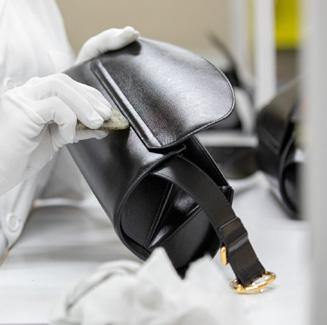
Preserving craftsmanship
The fashion industry embodies the excellence of Made in Italy, representing quality, innovation and, above all, craftsmanship. The OTB Group supports the Italian fashion industry supply chain and its artisans, and promotes the creativity of new talents and designers, creating new growth opportunities through support for training, innovation and technological transformation.
2023 Sustainability Report 130 Brave Together
Project M.A.D.E.: Made in Italy, Made Perfectly
In 2023, the Group presented its M.A.D.E.: Made in Italy, Made Perfectly campaign at the Ministry of Enterprise and Made in Italy (MIMIT) in Rome.
Rooted in the Group's core values, the M.A.D.E. campaign, an acronym for Manual Dexterity, Artisanal Skill, Dedication and Excellence, is an initiative dedicated to promoting and giving visibility to those who create “Made in Italy” and make it unique globally. It is a tribute to the skills and stories of people who, often working behind the scenes, play a fundamental role in the creation of Italian excellence and quality, and deserve the spotlight. The campaign was launched to amplify the voice of the Group's suppliers and honour the strong ties that have been built up with them over the years.
Scuola dei Mestieri - Staff Academy
The Staff Academy “Scuola dei Mestieri”, which held its third edition in 2023, is a Staff International project to preserve and pass down more than 40 years of savoir-faire culture and tradition, with an innovative approach that takes account of the new industry 4.0 skills and agile organisational models.
The programme is intended for recent graduates from technical institutes, specialised training courses and university courses in the fashion industry from all over Italy. The most talented students are selected as participants on a practical internship programme, where they can become “Fashion Makers 4.0” under the guidance of Staff International experts. The training course is designed for young talents who wish to develop specific skills for the roles of Junior Prototypist, Prototypist Ironer and Prototypist Cutter.
It includes training sessions conducted by lecturers selected from among the key Staff International business functions. Since 2022, the programme has included a lecturer in Sustainability, who deals with circular economy principles and teaches product design using unsold goods or left-over clothes, presenting projects by Staff International and the OTB Group.
Since the project began in 2021, almost 80% of the students have gone on to work with the tailoring and prototyping workshops of the OTB Group and Staff International.
In 2023, the School was one of the finalists in the “Craftsmanship” category of the “Fashion Sustainable Awards” for its mission, commitment and achievements. The Fashion Sustainable Awards are a prestigious annual event established by the Italian National Chamber of Fashion (CNMI) to highlight the achievements and efforts of Italian and international designers and brands in promoting the growth of a more ethical and circular fashion industry.
Staff International x ApritiModa
In 2023, Staff International took part in Apritimoda, the annual national event that introduces the public to the places where Made in Italy comes to life. On this occasion, the company opened the doors of its Noventa Vicentina site to offer a unique opportunity to explore at first hand some of the product creation stages of the Group's main Brands, including Maison Margiela, Marni and Jil Sander. The visit included a guided tour of the premises for a closeup look at the different stages of production, including modelling and prototyping, the product offices, tailoring and a stop at the garment sustainability showroom.
2023 Sustainability Report 131 Brave Together
7.3 PEOPLE CARE
In the OTB Group, employee welfare is a key asset to improve the quality of work and have a positive impact on the lives of OTB's employees, who have access to a wide and expanding range of services.
OTB has a Hospitality function that, in addition to providing organisational support, manages a number of internal key services that contribute to a positive workplace atmosphere, including the coordination of reception units and all hospitality services for internal and external stakeholders. The purpose of the Hospitality function is to guarantee a high level of user satisfaction with services such as corporate catering, the gym and wellness centre, the nursery and kindergarten, and other ancillary services such as management of common areas like meeting rooms, break areas and workplaces in general.
The following services are provided for OTB employees in the main Italian locations:
Company Canteens
In Breganze, where Diesel and OTB are based, and the two Staff International sites in Colceresa and Noventa Vicentina, OTB offers a canteen service with a broad selection of food, as well as the possibility to book a lunch box or takeaway.
Food Recovery Program
Since 2016 , OTB has run a programme to collect and donate food surpluses from the company canteens in order to reduce food waste. Thanks to the OTB Foundation’s close collaboration with local associations, excess food is collected from the canteens on a weekly basis and donated to people in need.
Brave Gym and Brave Beauty
Since 2011, employees have been able to use the Brave Gym at OTB headquarters, which is run in cooperation with a leading company in the sector. The gym offers a workout room with fitness equipment and a weekly group exercise programme with specialist trainers, for activities including tone, balance, yoga and spin biking. Users also access to indoor basketball, volleyball and squash courts and outdoor tennis courts and five-a-side football pitches.
These spaces are frequently used to organise company tournaments throughout the year, promoting team-building activities. There is also an osteopathy service and a beauty area (Brave Beauty) offering treatments at favourable prices.
Brave Garden
In 2010, the Breganze headquarters opened the Brave Garden nursery and kindergarten for employees’ children, to help with the worklife balance. The facility is run by an accredited specialist cooperative approved by the Regional Authority. It was designed and built following an innovative architectural project to meet children’s growth and social needs. The centre welcomes up to 50 children from 0 to 6 years old. Amenities include a park and a small vegetable garden where the kids immerse themselves in natural surroundings. In the kindergarten, new technologies are widely used to improve the children's knowledge through digital and multimedia tools. The Brave Garden also offers various meeting opportunities for to families to support parenting.
2023 Sustainability Report 132 Brave Together
Wash My Car
The Breganze and Noventa Vicentina sites assist employees by providing a pay-for car valeting service, with pick-up and return during the day.
SpesaBio
In 2022, the Staff International location in Noventa Vicentina launched the SpesaBio service, for online purchases of organic seasonal products grown by a local social farm that uses responsible methods and respects biodiversity.
Laundry Service
Through an agreement with a local laundry, the Staff International location in Noventa Vicentina and the Brave Kid location in Marostica offer employees a subsidised washing and ironing service.
Tax Assistance
Since 2013, a low-cost Tax Assistance service has been available at OTB Group offices, where tax returns can be completed.
Assistance fund and pension fund
The Group's Italian companies are members of Sanimoda, the supplementary healthcare fund for workers in the fashion industry. The fund provides healthcare services complementing those of the National Health System, thus guaranteeing greater protection for its employees. In addition, the Group's Italian companies belong to the Previmoda fashion sector pension fund, to strengthen the pension position of its employees.
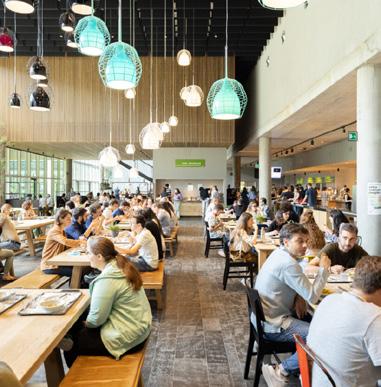
Breast screening
The OTB Group promotes prevention and support for its employees by offering, since 2022 (although currently not on an annual basis), free access to check-ups for the early diagnosis of breast cancer, with ultrasound and mammography as required.
The examinations take place in a mobile clinic equipped with specialised instruments, which travels to the Group's Italian sites. The service is run in collaboration with companies that specialise in providing integrated home healthcare services.
Check-ups
In 2023, the OTB Group continued its agreement with the Centro Diagnostico Italiano (CDI) in Milan, a prevention-oriented outpatient healthcare facility that has been in operation for over 35 years. The agreement entitles employees and their families to have comprehensive check-ups at favourable conditions. The Group has set up a procedure on the People Hub corporate portal to help people start up a prevention plan.
2023 Sustainability Report 133 Brave Together
7.4 EMPLOYEES HEALTH AND SAFETY
OTB is committed to providing a safe and healthy working environment conducive to the well-being of employees, and extends this to everyone who interacts with the Group.
Its commitment takes the form of a detailed HSE risk identification and assessment process in order to formulate a risk management action plan, based on continuous monitoring and improvement of employee and stakeholder health and safety. OTB actively promotes constructive workplace dialogue and risk reporting by providing all employees with a dedicated network for the proactive handling of reports and non-conformities, managed by the HSE Function.
The HSE Function oversees and manages health and safety activities and constantly monitors compliance with standards, also defining policies and procedures within the Group. Starting in 2022, OTB has set up several activities with key management functions to promote a health and safety culture. Through organised workshops, the managers worked together to create a vision in this direction, promoting the importance of prevention and actively involving the functions in the definition of clear and structured policies.
OTB implements a Group Health and Safety Policy which establishes principles to protect employees from workplace hazards and personal injuries. These standards are set out in the Global Compliance Programme. All the Group legal entities are required to consider worker safety at every stage of their business activities and to take the necessary measures to protect their physical and moral integrity, including a plan for auditing external contractors.
To ensure high health and safety standards, OTB refers to the UNI ISO 45001:2018 standard, adapting the management system to meet local requirements. In 2023, as part of the Group restructuring, OTB continued work to obtain third-party certification for its management system.
During 2023, 100%38 of Group employees in Europe benefited from a centralised occupational health and safety management system. Of the total, 65.6% of workers, including all employees in the Italian area, are covered by an internally audited health and safety management system. In addition, depending on local and country regulations, each company designates employee representatives, who are usually internal figures.
In order to monitor the state of health and safety, the HSE Function submits a semi-annual report to the Board of Directors and the Supervisory Board. This transparent approach highlights shortcomings, enabling corrective or preventive action to be taken.
38. Coordination and cooperation between the Employer and the Contractor, considering the health and safety costs envisaged by current legislation. The following worker categories are considered: Group employees, interns and workers with on-call contracts. The figure refers to all companies in the European perimeter, except for the new acquisitions in 2023, whose data were not available at the reporting date.
2023 Sustainability Report 134 Brave Together
Since 2022, the HSE Function has employed an HSE Compliance Index, which monitors and quantifies the compliance and effectiveness of the actions taken, guiding future activities and serving as an internal communication tool.
A range of activities are carried out regularly at Group level, including:
• risk assessments and regular audits for every site in Europe covering various issues, from understanding of requirements to implementation of improvement and monitoring plans;
• mandatory checks on safety training (e.g., training plan and activities, status of employee HSE training);
• workplace conformity mapping, reviews of emergency plans, sharing of action plans, procedures, best practices, and cross-functional support to improve health and safety performance;
• regular medical check-ups in line with healthcare protocols and monitoring of deadlines;
• support for new openings, site projects, emergencies (e.g., the Covid-19 pandemic), site audits and implementation of the ISO 45001 management system.
The Group promotes a strong occupational safety culture, raising employee awareness of risks and individual responsibilities.
To ensure adequate training, the Group is enhancing the existing courses in the Group training plan, including those on managing job-related risks and emergencies. In addition, the Group is promoting activities for workers’ physical and mental well-being, including information on work-life balance, stress management, sport, healthy eating and mindfulness courses.
Finally, the Group offers employees life insurance and facilitates access to health services, including medical conventions, check-ups and life and accident policies.
On the occasion of the 2023 World Day for Safety and Health at Work, the Group organised the first Safety Day promoting a positive and preventive occupational health and safety culture through courses, workshops and emergency simulations. The initiative addressed more than 2,100 employees in Italy at the headquarters of OTB, Diesel and Staff International (and remotely for the rest of Italy) and promoted first-aid courses, workshops on tension management and occupational well-being, and virtual-reality simulations of emergency situations where employees could develop their ability to react.
2023 Sustainability Report 135 Brave Together
During 2023, 43 accidents occurred during working hours out of the entire population39, of which 51.2% were commuting accidents. Accidents at work, 48.8%, were mainly due to accidental falls.
In 2023, the global occupational accident rate was 3.040. No accidents were classified as injuries and no fatal accidents were reported. Furthermore, no work-related occupational diseases were diagnosed among employees during the year.
Industrial relations and trade unions
The Group recognises the importance of workers’ right to representation by trade unions and guarantees full support to enable workers to freely and responsibly exercise this right.
The Group's industrial relations policy is based on a constructive and collaborative approach with employees and their representatives; regular meetings are held with company and territorial trade unions to discuss issues delegated by national collective bargaining and explore consensual solutions and opportunities. In recent years, OTB has taken an active part in regular meetings and debates with union representatives to examine health and safety issues and training. Specifically, during 2023 the OTB Group organised a meeting with the national secretaries of the main workers' associations that are signatories to the national collective bargaining agreements adopted by the Group, to discuss policies and initiatives in the areas of Sustainability and Diversity Equity & Inclusion.
Confirming the climate of cooperation, there have been no company strikes or trade union protests in the last three years, and no cases of violation of freedom of association or impairment of collective bargaining.
In Italy, labour relations concerning OTB Group company employees are governed by national collective bargaining agreements41, second-level bargaining and company policies. In the other countries, employees are governed by local regulations, collective bargaining (where applicable) and company policies. Regulations cover contracts, remuneration, welfare and pension contributions.
39. The companies in the North American Region were not included since their data were not available.
40. The index is obtained by comparing the number of accidents (which includes accidents in Italy, France, the companies in the APAC Region, North America and Japan) to hours worked/1,000,000. Hours worked were calculated by estimating that employees work an average of 260 days per year and 8 hours per day. At the moment, data on the number of accidents and hours worked are not available for the other European companies and companies acquired in 2023.
41. Of the total number of employees, 43.4% are covered by national collective bargaining agreements, an increase of 20.3 percentage points compared to 2022.
2023 Sustainability Report 136 Brave Together
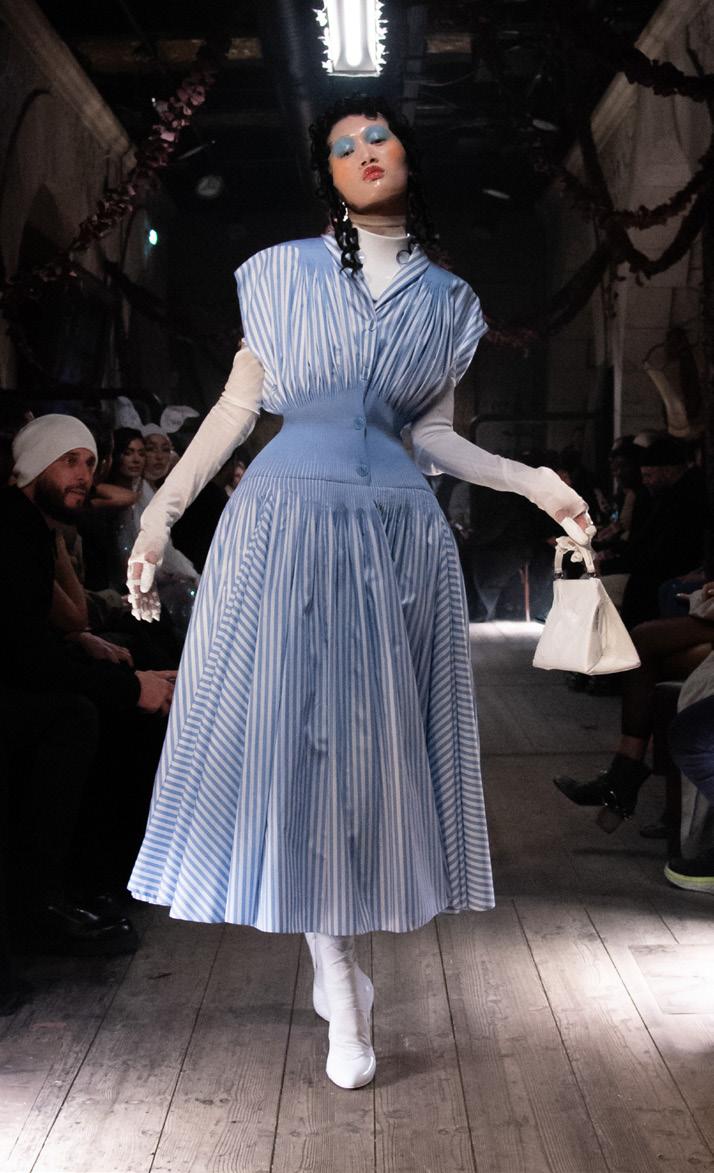
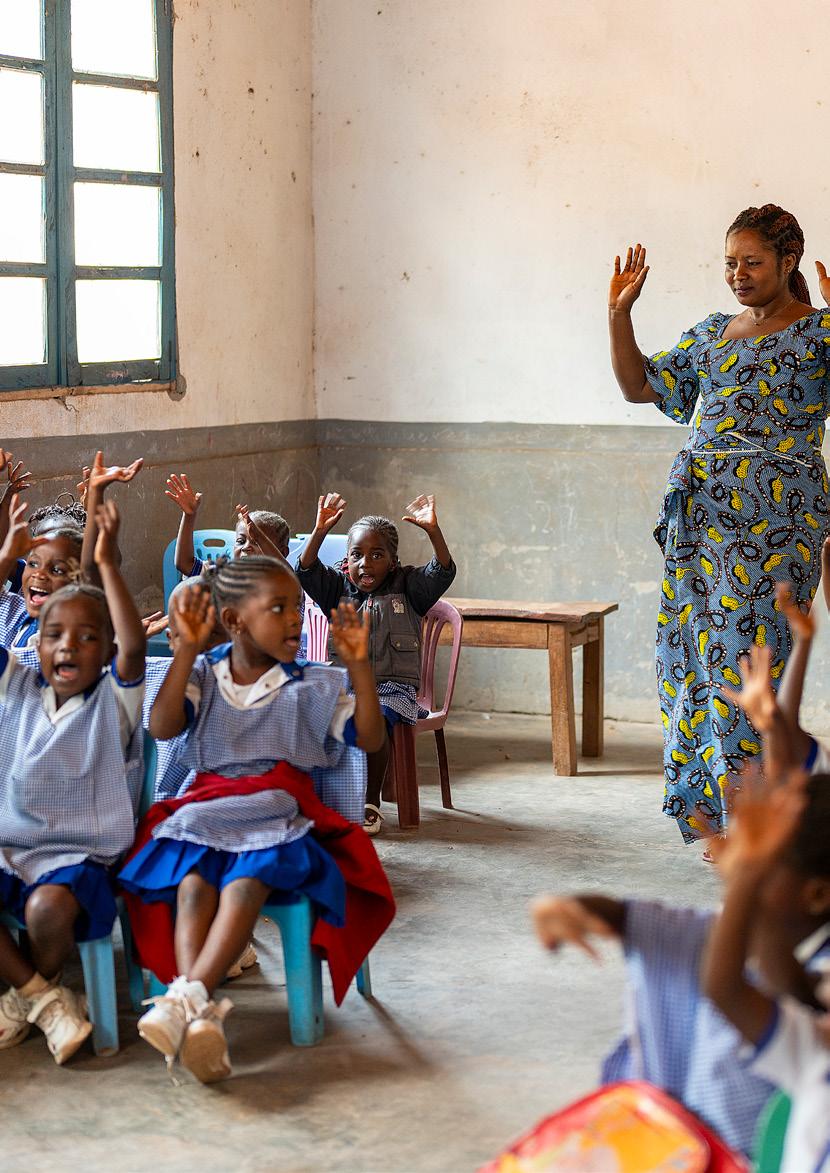

8 OTB FOUNDATION 8
OTB FOUNDATION
The OTB Foundation was set up in 2006 to fight social injustice and contribute to the sustainable development of disadvantaged people and regions.
In line with the values of his family of origin and in the belief that it is the duty of every entrepreneur to generate a positive impact for people, the environment and the territory, Renzo Rosso created the OTB Foundation for the purpose of giving value back to the community. The Foundation ensures that the funds raised go directly to the final beneficiaries of the projects it supports, keeping administrative costs to a minimum thanks to a very lean structure that makes use of in-house expertise when needed.
Another distinguishing feature of the OTB Foundation, which has emerged especially since the arrival of vice-president Arianna Alessi, is the “profit” approach, not often adopted in the “non-profit” world. Besides making funds available to the operating partners on its projects, the organisation often assists them in drawing up business plans and in implementing projects so that they can become self-financing over time, requiring timely and periodic reporting of the sums received before proceeding with new funding tranches.
In addition to sustainability over time, two other key criteria considered by the OTB Foundation when selecting initiatives are their direct social impact and the application of innovative solutions to respond to the needs of people requiring assistance.
The four main areas of intervention are:
• initiatives to support children and young people

• projects that promote female empowerment and protect women who are victims of violence, with a focus on prevention and the promotion of an inclusive culture among young people
• associations that work for the integration and protection of people whose fundamental rights have been abused
• rapid intervention in emergency situations to respond to urgent needs generated by crisis situations
The common thread linking all OTB Foundation activities is the will to take prompt and concrete action in emergency situations and to improve people's lives in a sustainable manner by guaranteeing equal opportunities: this sentence represents OTB Foundation’s mission.
2023 Sustainability Report 140 OTB Foundation
Since it began its operations, the OTB Foundation has invested in more than 350 social development projects around the world and made a significant contribution to improving the quality of life of more than 350,000 people.
The OTB Foundation operates all over the world with the support of small non-profit organisations that are highly specialised in specific areas, large organisations like the UNHCR and Cesvi, and international and institutional bodies, building ties that are often consolidated over time. In 2023, to support the local community, the Foundation increased interventions and projects in Italy, which accounted for 81.3% of total investments.
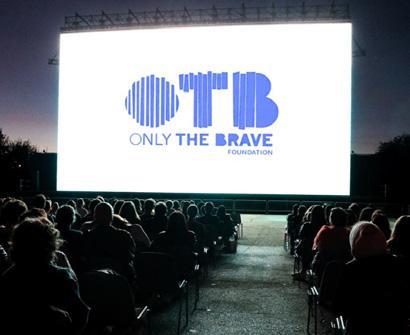
THE MAIN BENEFICIARIES OF OTB FOUNDATION ACTIVITIES
34% Women
3% Other
15% Emergencies
10% Integration
38% Children and Young People
2023 Sustainability Report 141 OTB Foundation
The graphic below shows the main stakeholder categories covered by the work of the OTB Foundation.
ACTION AREAS
3.6% Healthcare
13.6% Emergency aid
1.8% Art and culture
23.2% Social welfare
57.8% Education and young people
The action areas42 addressed by the projects supported during the year were education and young people, which accounted for 57.8% of projects, social welfare for 23.2% and emergency aid for about 13.6%. The remaining 5.4% was devoted to healthcare projects and initiatives to promote art and culture.
The OTB Foundation operates mainly through donations. During the year, 67.0% of its contributions were disbursed in fundings, while the remaining 33.0% was used for the purchase of goods and the coordination and payment of services, such as the purchase of kitchens for families in Forlì in the wake of the Emilia Romagna’s regional emergency, and the payment of bills for work carried out at the Gabelli School. In 2023, the Foundation increased spending on project funding by 12.1% compared to previous year.
42. The action areas in the graphic were processed in line with the London Benchmarking Group (LBG) reporting model, which measures the value and impact of investments in the community. The LBG is internationally recognised and supported by the main sustainability indices, such as the Dow Jones Sustainability Index, and it highlights the OTB Foundation's Corporate Social Investments (CSI) in each area of intervention.
2023 Sustainability Report 142 OTB Foundation
8.1 CHILDREN AND YOUNG PEOPLE
For the OTB Foundation, taking care of tomorrow's adults means investing in the future of the whole community: this is why in 2023 there were many new initiatives for children and young people, in Italy and abroad.
The first new collaboration project involved the Agostiniani del Mondo Foundation, which, thanks to the support of the OTB Foundation, was able to expand the services provided by the Juvenat Centre in Dungu, in the Democratic Republic of Congo: this is a residential centre for the social and economic reintegration of vulnerable children, especially former child soldiers, most of whom are girls. In addition to hospitality, the centre offers the opportunity to take part in training courses in carpentry and IT, to help run a farm by rearing cattle, pigs and fish, and, through its collaboration with local schools, reintegrating children to education. The programme was extended to 200 young people thanks to the contribution of the OTB Foundation, giving priority to former child soldiers and girls who are often excluded from this type of activity.
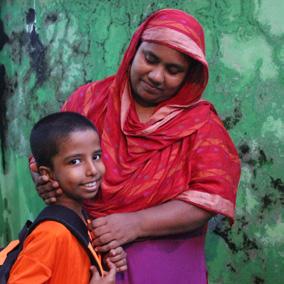
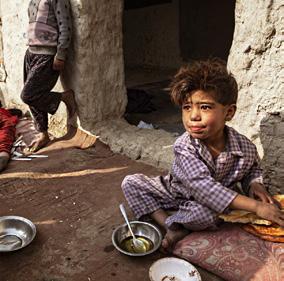
In synergy with the Group strategy, the Foundation launched another important project called Children Are Reading. This is a threeyear educational programme promoted by the Foundation in Bangladesh, together with local organisations, involving the children of the employees of a Diesel supplier. Thanks to this initiative, an after-school service is guaranteed for 100 children to support their education in a country where literacy levels are very low. The service was activated in proximity to the production sites to facilitate families' access to the support centres.
The OTB Foundation also continued to support the orphanage in Kapisa, Afghanistan, run by Nove Onlus, where more than 50 children receive food, shelter, education and protection from abuse in a country where 97% of the population lives below the poverty line.
2023 Sustainability Report 143 OTB Foundation
In Italy, projects for young people and children included the renewal of the contribution to the Bambino Gesù Hospital in Rome, thanks to which a daily recreational service is provided for 77 patients directly in the ward as well access to various workshops using cutting-edge technology.
The Only The Brave Calls Alice service continued, where, thanks to the contribution of the OTB Foundation, more than 1,000 hours of free counselling have been provided to young people between the ages of 12 and 25 since the project began. This project will be repeated during 2024 to provide a concrete response to mental health issues among the very young, a topic to which no proper attention has been paid so far.
Prevention remains one of the cornerstones of the Foundation's activities for young people: the prevention campaigns against gender-based violence, bullying, cyberbullying and addiction, carried out in secondary schools nationwide and supported by the OTB Foundation continued this year. In 2023 alone, more than 8,000 young people took part in meetings organised with Fare x Bene ETS and the San Patrignano community.

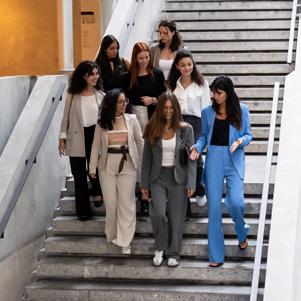
8.2 WOMEN
Female empowerment is the second major pillar of OTB Foundation activities, which in 2023 included the expansion of the Brave Women Awards, a scholarship programme designed to facilitate access to faculties with a low female intake for girls with a good academic record who qualify for financial assistance. After an initial year involving 8 female students at the Bocconi University, starting with the 2023/2024 academic year the target audience addressed by Foundation has been expanded to cover students from all over the country: thanks to collaborations with the LUISS, the University of Bologna, the University of Padua and the University of Venice, the project now provides support for 56 girls.
Support for women who are victims of violence in the Veneto region also continued with the Mai Più hotline, a 24/7 emergency service offering legal and psychological counselling and, in some cases, job placement. More than 178 women have received help since the start of the project.
2023 Sustainability Report 144 OTB Foundation
Alongside this service, the campaign on prevention of gender violence that the Foundation finances in schools all over Italy continued; the aim is to make the new generations aware of the issue and create a culture of respect, with meetings attended by experts and testimonials, such as Valentina Pitzalis, who bring their experiences to youngsters. Mai Più is the name of the awareness-raising campaign , which the Foundation finances in schools throughout Italy.
In 2023, the OTB Foundation began a collaboration with Children of Madagascar Tonga Soa, to support two family homes, in Maromandia and Ankaramibè, which host girls with limited financial resources and without a stable family. The two facilities provide safe accommodation for 40 girls between the ages of 9 and 19, who have the opportunity to attend school, including secondary school, or to learn crafts, and receive healthcare that would normally be precluded to them.
The girls’ lack of family, financial and social security would expose them to enormous risks, including poverty and prostitution. The ultimate goal of the project is to make women independent, by providing them with suitable tools and skills. Madagascar is one of the world’s poorest countries, with more than 80% of the population living in extreme poverty and more than 40% suffering from malnutrition.

2023 Sustainability Report 145 OTB Foundation

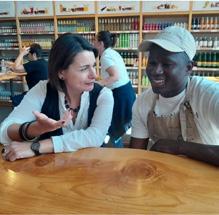
8.3 INTEGRATION
Another focus for the OTB Foundation are integration projects, where the Foundation promotes activities designed to foster social inclusion and job opportunities.
Job Clinic Online, a platform set up in February 2022 to match job supply and demand for immigrants, has now become fully operational, thanks to the continued support of the OTB Foundation: currently, it manages more than one thousand active profiles. The service was improved by a new hiring who is dedicated to developing contacts with companies and training candidates.
The solidarity emporium project was also strengthened in 2023. The network supported by the OTB Foundation has expanded to cover five centres throughout Italy: the Solidarietà emporium in Venice with Corte Del Forner, the Il Cedro emporium in Schio and the L'Olmo emporium in Thiene (both in Vicenza) with the Da Spreco a Risorsa voluntary organisation, the I Care emporium in Viterbo with the Viterbo con Amore voluntary organisation, and the Il Sole emporium of the Reno Lavino and Samoggia municipal union. More than 1,600 families are currently supported thanks to these centres, which, besides distributing free food, also run ad hoc help desks to support families in all critical issues that contributed to their economic difficulty or social harship. Job placement, counselling services, distribution of second-hand clothes, after-school care for children and financial counselling are just some of the activities managed by the emporiums supported by the Foundation.
2023 Sustainability Report 146 OTB Foundation
8.4 EMERGENCIES
True to its mission to provide a prompt and concrete response in emergency situations, the OTB Foundation took immediate action to help the Turkish and Syrian populations affected by the earthquake in February 2023, through the UN High Commissioner of Refugees, consolidating their long-lasting collaboration on a diverse number of initiatives. The earthquake caused more than 50,000 confirmed victims. The UNHCR immediately mobilised its field operations to take humanitarian aid to the refugees and refugee camps in the two countries. In Syria, kits with emergency goods including thermal blankets, mattresses, kitchen utensils, plastic tarpaulins, water canisters, winter clothing and other basic necessities were distributed in Aleppo, Homs and Tartous, some of the worst hit areas.
The Foundation also provided aid for the emergency in Emilia-Romagna, Italy, in May 2023: in line with its philosophy of intervening in a targeted manner without intermediaries, it organised direct support for the local residents. The aid focused specifically on the reconstruction of the homes damaged by the floods, providing families with support to replace their kitchens.
People Care
The OTB Foundation also continues to promote and implement social sustainability initiatives linked with the OTB Group strategy and in cooperation with the Group companies.
Every month, used clothing is collected at the Group locations and distributed by the Foundation to the organisations it supports. In the past two years, more than 6,000 kg of clothes have been donated to homes, solidarity emporiums and refugee centres all over Italy.
Another key sustainability initiative is the Food Recovery Programme, which donates surplus food produced in the company canteens to organisations that support people and families in need in the Veneto region, while combating food waste. Since the initiative began, some 36,000 meals have been recovered and almost 4 tonnes of food have been donated.
Computer equipment considered obsolete is recovered and donated to schools or associations involved in the education of minors, while cutting waste is donated to tailoring companies that employ migrants or people who are socially vulnerable.
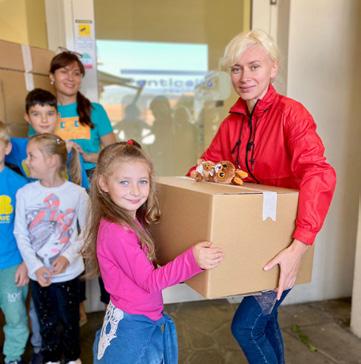
2023 Sustainability Report 147 OTB Foundation
Awards
In 2023, the OTB Foundation received awards from a number of national and international organisations and associations in recognition of its work over the years to help people in difficulties, respond to emergencies and organise philanthropic activities. The awards are an additional confirmation of the importance of the Foundation’s work and a reflection of its public recognition.

We Welcome Award
The “ Welcome Award” given annually by the UNHCR was given in 2023 to the Foundation and the companies involved in recruitment, Staff International, Diesel, OTB Spa and Diesel Farm, recognising their commitment and success in integrating refugees into the workplace.
In addition, the OTB Foundation, which coordinates the job placements, was presented as the promoting body, together with the companies involved in hiring personnel.

Fashion Dresses Peace
OTB Chair Renzo Rosso and OTB Foundation Vice President Arianna Alessi were honoured by the African Fashion Gate for their outstanding commitment to the Foundation and the value of its projects, notably for the support of the Ukrainian population. In giving the award, the association wanted to recognise two specific projects supported by the OTB Foundation: the assistance for Ukrainian refugees since the beginning of the Russian-Ukrainian conflict, which has helped 7,000 people and provided shelter in Italy for 440 refugees; and the Brave Women Awards initiative, which has disbursed EUR 550,000 to fund the university fees of 55 young women enrolled at Italian universities.
2023 Sustainability Report 148 OTB Foundation



9 APPENDIX 9
APPENDIX
9.1 METHODOLOGICAL NOTE
Reporting standards and reporting scope
This document is the third Sustainability Report published by the OTB Group (also referred to as “OTB”, “Group”). It details the initiatives and projects organised to address challenges relating to the environment, society, personnel management, human rights, governance and anti-corruption, in order to provide stakeholders with a transparent and comprehensive view of OTB’s strategies, operations, performance and results with regard to its economic growth and business development.
The Sustainability Report has been drafted in accordance with the “In Accordance” option of the Sustainability Reporting Standards published by the Global Reporting InitiativeGRI 2021, the most widely used international standards for reporting non-financial information. To help the reader, an index of the GRI contents, indicating the location of the information in the Report, has been included with the page references.
The issues covered by the Sustainability Report reflect the results of the materiality analysis conducted in 2023 and approved by the OTB Board of Directors in December 2023. In particular, the “Impact Materiality” analysis, described in chapter 2.5 “The Materiality Analysis Process”, was conducted following the guidelines set out in “GRI 3: Material Topics” and the indications of the European Sustainability Reporting Standards (ESRS).
The reporting scope includes OTB S.p.A. and its subsidiaries consolidated on a line-by-line basis in the annual financial statements. It does not include the companies consolidated using the equity method. For the list of Legal Entities included in the reporting scope, see the Consolidated Financial Statements, see the OTB Group website (www.otb.net). The Report also includes a chapter on the OTB Foundation, to provide an accurate overview of the Group's philanthropic activities. Any scope limitations are clearly indicated, often with a footnote and/or in the GRI Content Index.
The Sustainability Report refers to the 2023 financial year and covers the same time period as the Annual Report, from 1 January 2023 to 31 December 2023. For comparative purposes, data for the financial years 2021 and 2022 have been included where available. Where prior-year data are restated, this is explicitly indicated in the Report and also highlighted in the GRI Content Index. Specifically, the 2022 data on Scope 3 emissions generated differ from the data published in the previous Sustainability Report. The full implementation of the reporting system for all the legal entities has made it possible to fine-tune and optimise data collection.
The principles used to define the contents in this Report reflect those indicated by the GRI Standards and are set out below:
2023 Sustainability Report 152 Appendix
• significance;
• inclusivity;
• sustainability context;
• completeness;
• balance between positive and negative aspects;
• comparability;
• accuracy;
• timeliness;
• reliability;
• clarity.
The designated party approved to conduct the limited assurance of this Sustainability Report is PricewaterhouseCoopers Business Services Srl, which, in a specific separate report, has provided an attestation on the conformity of the information provided in accordance with the ISAE 3000 Revised principle. The limited assurance was conducted using the procedures indicated in the “Report of the Independent Auditor”, which is included in this document.
Reporting process
The preparation of the Sustainability Report involved all the corporate functions responsible for the topics covered, coordinated by the Corporate Sustainability Department. As with the previous Sustainability Reports, once the areas and topics to be covered are been established, the data owners and the data approvers were designated for each corporate function. Each Group company is responsible for the data and information published in the Group Sustainability Report. The data and information were collected through quantitative and qualitative forms, taking account of the requirements of the GRI Standards.
The OTB Group 2023 Sustainability Report has been approved by the Board of Directors and published on the Group corporate website.
2023 Sustainability Report 153 Appendix
9.2 PERFORMANCE DATA AND INDICATORS
2023 Sustainability Report 154 Appendix
Retail and head office employees (no.) u.m. 2021 2022 2023 men women Total men women Total men women Total Retail no. 1,184 2,129 3,313 1,193 2,231 3,424 1,360 2,469 3,829 Head Office no. 965 1,664 2,629 997 1,743 2,740 1,032 1,831 2,863 Showroom no.- -- - 10 49 59 Total no. 2,149 3,793 5,942 2,190 3,974 6,164 2,402 4,349 6,751 of which in creative roles no. - - - 89 319 408 103 329 432 Employees by area and gender (no.) u.m. 2021 2022 2023 men women Total men women Total men women Total Italy no. 761 1,444 2,205 747 1,425 2,172 816 1,565 2,381 Japan no. 609 995 1,604 543 1,017 1,560 606 1,042 1,648 Europe (excl. Italy) no. 470 740 1,210 470 726 1,196 455 755 1,210 APAC no. 130 430 560 238 592 830 276 710 986 America no. 179 184 363 192 214 406 230 275 505 India no.- - 19 2 21 Total no. 2,149 3,793 5,942 2,190 3,974 6,164 2,402 4,349 6,751 Employees by contract and gender (no.) u.m. 2021 2022 2023 men women Total men women Total men women Total Open-ended contract no. 2,010 3,488 5,498 1,933 3,379 5,312 2,048 3,605 5,653 Fixed-term contract no. 139 305 444 255 570 825 353 717 1,070 On-call employees no. - 2 25 27 1 27 28 Total no. 2,149 3,793 5,942 2,190 3,974 6,164 2,402 4,349 6,751
2023 Sustainability Report 155 Appendix Employees by contract, gender and geographical area (no.) u.m. 2021 2022 2023 men women Total men women Total men women Total Italy no. 761 1,444 2,205 747 1,425 2,172 816 1,565 2,381 Fixed-term contract no. 725 1,311 2,036 693 1,319 2,012 736 1,402 2,138 Fixed-term contract no. 36 133 169 52 81 133 79 136 215 On-call employees no. - - - 2 25 27 1 27 28 Europe (excluding Italy) no. 470 740 1,210 470 726 1,196 455 755 1,210 Fixed-term contract no. 391 622 1,013 417 617 1,034 386 635 1,021 Fixed-term contract no. 79 118 197 53 109 162 69 120 189 On-call employees no. - - - - - - - -America no. 179 184 363 192 214 406 230 275 505 Fixed-term contract no. 179 184 363 191 214 405 224 264 488 Fixed-term contract no. - - - 1 - 1 6 11 17 On-call employees no. - - - - - - - -APAC no. 130 430 560 238 592 830 276 710 986 Fixed-term contract no. 119 397 516 90 216 306 77 264 341 Fixed-term contract no. 11 33 44 148 376 524 199 446 645 On-call employees no. - - - - - - - -Japan no. 609 995 1,604 543 1,017 1,560 606 1,042 1,648 Fixed-term contract no. 596 974 1,570 542 1,013 1,555 606 1,038 1,644 Fixed-term contract no. 13 21 34 1 4 5 - 4 4 On-call employees no. - - - - - - - -India no. - - - - - - 19 2 21 Fixed-term contract no. - - - - 19 2 21 Fixed-term contract no. - - - - - -On-call employees no. - - - - - -Total no. 2,149 3,793 5,942 2,190 3,974 6,164 2,402 4,349 6,751
2023 Sustainability Report 156 Appendix
by employment type and gender (no.) u.m. 2021 2022 2023 men women Total men women Total men women Total Full-time no. 1,889 3,200 5,089 1,932 3,332 5,264 2,103 3,634 5,737 Part-time no. 267 586 853 258 642 900 299 715 1,014 Total no. 2,156 3,786 5,942 2,190 3,974 6,164 2,402 4,349 6,751 u.m. 2021 2022 2023 men women Total men women Total men women Total Executives & Directors no. 54 26 80 54 25 79 58 27 85 18-29 - - - 0 0 0 0 0 0 30-39 22 14 36 22 9 31 3 2 5 40-49 19 9 28 50-59 32 12 44 32 16 48 26 12 38 >=60 10 4 14 Managers 431 462 893 422 475 897 416 486 902 18-29 4 17 21 15 23 38 9 18 27 30-39 291 329 620 272 355 627 107 197 304 40-49 166 173 339 50-59 136 116 252 135 97 232 114 88 202 >=60 20 10 30 Professionals 1,664 3,305 4,969 1,714 3,474 5,188 1,928 3,836 5,764 18-29 640 1,139 1,779 741 1,357 2,098 839 1,468 2,307 30-39 865 1,854 2,719 807 1,780 2,587 596 1,272 1,868 40-49 325 731 1,056 50-59 159 312 471 166 337 503 139 312 451 >=60 29 53 82 Total 2,149 3,793 5,942 2,190 3,974 6,164 2,402 4,349 6,751 18-29 644 1,156 1,800 756 1,380 2,136 848 1,486 2,334 30-39 1,178 2,197 3,375 1,101 2,144 3,245 706 1,471 2,177 40-49 510 913 1,423 50-59 327 440 767 333 450 783 279 412 691 >=60 59 67 126
Employees
The data do not include intercompany movements and job on-call contracts
*The total number of hires also includes employees of the Frassineti company acquired in 2023, who are considered as new entries. Average
2023 Sustainability Report 157 Appendix Workers who are not employees (no.) u.m. 2021 2022 2023 men women Total men women Total men women Total Non-employee directors no. 4 4 9 - 9 7 1 8 Temporary agency workers no. 59 153 212 77 146 223 39 70 109 Interns and trainees no. 10 54 64 37 102 139 35 53 88 Total no. 69 207 276 114 248 362 81 124 205
and hirings by gender (no.) u.m. 2021 2022 2023 men women Total men women Total men women Total Terminated no. - 1,440 966 2,406 926 1,530 2,456 Hired no. - 1,698 1,028 2,726 1,170 1,915 3,085
Terminations
hours of training by gender and category u.m. 2022 2023 men women Total men women Total Executive & Directors h 9.96 14.22 11.31 2.91 3.37 3.06 Managers h 5.44 7.07 6.30 7.52 8.16 7.86 Professionals h 9.48 8.69 8.95 7.35 7.07 7.16 Total 8.71 8.53 8.60 7.27 7.17 7.21
Waste generated by type in 2023 (in tonnes)
43. The amounts shown include net revenues, total other revenues, other interest income, other financial income, bank current account interest income.
44. Tax provisions do not include deferred corporate income tax and reserves for uncertain tax positions.
45. The figures shown refer to the total number of employees with a full-time contract (FTE).
2023 Sustainability Report 158 Appendix Thousands of Euro Countries in the scope Total Revenues43 Pre-tax profits/losses Tangible assets and cash equivalents Taxes paid Tax provisions44 Employees (FTE)45 Europe Austria Belgium Denmark Finland France Germany Ireland Italy Monaco Netherlands Norway Spain Sweden Switzerland United Kingdom 2,089,514 187,177 123,154 6,913 37,963 3,057 Americas Canada USA 168,369 18,741 11,825 5,532 4,540 346 APAC China Macao Hong Kong India Singapore South Korea Japan 560,718 -4,339 32,943 5,713 8,295 2,326 Total 2,818,601 201,579 167,922 18,158 50,798 5,729
Type Recovered waste (tonnes) Waste disposed of (tonnes) Total waste (tonnes) Non-hazardous waste 2,007.33 276.77 2,284.09 Bulky waste 96.13 - 96.13 Glass 2.82 - 2.82 Iron and steel 7.71 - 7.71 Other waste 16.97 - 16.97 Paper and cardboard 931.50 - 931.50 Plastic 48.17 11.00 59.17 Wood 310.52 - 310.52 Textile fibres 111.66 - 111.66 Mixed packaging 422.57 156.68 579.25 Liquid organic waste - 91.30 91.30 Mixed municipal waste 59.28 17.78 77.06 Hazardous waste 6.14 - 6.14 Other waste 5.54 - 5.54 Mixed packaging 0.60 - 0.60 Total 2,013.47 276.77 2,290.23
Main materials purchased in 2023 showing materials from renewable sources (in tonnes)
Relations with organisations, institutions and associations
To strengthen the competitive position of the Group and its Brands, OTB promotes strategic relations with key stakeholders and institutions. The Group is an active member of various local and international organisations and working groups. It takes a leading role in industrial coalitions that promote sustainability in the fashion industry and defend Italy's manufacturing legacy. Specifically, OTB is a key member of the following associations and entities:
ITALY
ASCOM Vicenza– Confcommercio
Camera Nazionale della Moda
Confindustria Vicenza
Federazione Moda Italia Confcommercio
Montenapoleone District
Nuova Associazione Babuino
Sistema Moda Italia Confindustria
Consorzio Re.Crea
Altagamma
JAPAN
ITA Chamber of Commerce ICCJ
FRANCE
Comité Montaigne
Fédération de la Haute Couture
SPAIN
Asociación Distrito 41
INTERNATIONAL BODIES
Business for Social Responsibility – BSR
ReLI – Responsible Luxury Initiative
ZDHC Foundation’s Roadmap to Zero Programme
Science Based Targets initiative (SBTi)
AURA Blockchain Consortium
The Fashion Pact
2023 Sustainability Report 159 Appendix
Type Tonnes purchased % materials Total purchases raw materials 8,334.11 Raw materials from renewable sources (cotton, leather and skins, organochemicals, wool, vegetable fibres and other materials accounting for less than 1% of purchases) 5,815.36 70% Raw materials from non-renewable sources (polymers, metal fibres, other materials accounting for less than 1% of purchases) 2,518.75 30% Total purchases packaging 2,747.58 Packaging from materials of renewable origin (paper and cardboard, wood, cotton) 2,238.91 81% Packaging from materials of non-renewable origin (plastic, varnishes, other textile fibres, rubber) 508.67 19%
9.3 LETTER FROM THE AUDITORS

Independent auditor’s report in accordance with article 14 of Legislative Decree No. 39 of 27 January 2010
2023 Sustainability Report 160 Appendix

Independent auditor’s report in accordance with article 14 of Legislative Decree No. 39 of 27 January 2010
To the shareholders of OTB SpA
Report on the Audit of the Consolidated Financial Statements
Opinion
We have audited the consolidated financial statements of OTB Group (the “Group”), which comprise the consolidated statement of financial position as of 31 December 2023, the consolidated income statement, the consolidated statement of other comprehensive income, the consolidated statement of changes in equity, the consolidated cash flow statement for the year then ended and the notes to the consolidated financial statements, including material accounting policy information.
In our opinion, the consolidated financial statements give a true and fair view of the financial position of the Group as of 31 December 2023, and of the result of its operations and cash flows for the year then ended in accordance with International Financial Reporting Standards as adopted by the European Union.
Basis for opinion
We conducted our audit in accordance with International Standards on Auditing (ISA Italia). Our responsibilities under those standards are further described in the Auditor’s Responsibilities for the Audit of the Consolidated Financial Statements section of this report. We are independent of OTB SpA pursuant to the regulations and standards on ethics and independence applicable to audits of financial statements under Italian law. We believe that the audit evidence we have obtained is sufficient and appropriate to provide a basis for our opinion.
Responsibilities of the Directors and the Board of Statutory Auditors for the Consolidated Financial Statements
The directors are responsible for the preparation of consolidated financial statements that give a true and fair view in accordance with International Financial Reporting Standards as adopted by the European Union and, in the terms prescribed by law, for such internal control as they determine is necessary to enable the preparation of consolidated financial statements that are free from material misstatement, whether due to fraud or error.
2023 Sustainability Report 161 Appendix

The directors are responsible for assessing the Group’s ability to continue as a going concern and, in preparing the consolidated financial statements, for the appropriate application of the going concern basis of accounting, and for disclosing matters related to going concern. In preparing the consolidated financial statements, the directors use the going concern basis of accounting unless they either intend to liquidate OTB SpA or to cease operations, or have no realistic alternative but to do so.
The board of statutory auditors is responsible for overseeing, in the terms prescribed by law, the Group’s financial reporting process.
Auditor’s Responsibilities for the Audit of the Consolidated Financial Statements
Our objectives are to obtain reasonable assurance about whether the consolidated financial statements as a whole are free from material misstatement, whether due to fraud or error, and to issue an auditor’s report that includes our opinion. Reasonable assurance is a high level of assurance but is not a guarantee that an audit conducted in accordance with International Standards on Auditing (ISA Italia) will always detect a material misstatement when it exists. Misstatements can arise from fraud or error and are considered material if, individually or in the aggregate, they could reasonably be expected to influence the economic decisions of users taken on the basis of the consolidated financial statements.
As part of our audit conducted in accordance with International Standards on Auditing (ISA Italia), we exercised professional judgement and maintained professional scepticism throughout the audit.
Furthermore:
● We identified and assessed the risks of material misstatement of the consolidated financial statements, whether due to fraud or error; we designed and performed audit procedures responsive to those risks; we obtained audit evidence that is sufficient and appropriate to provide a basis for our opinion. The risk of not detecting a material misstatement resulting from fraud is higher than for one resulting from error, as fraud may involve collusion, forgery, intentional omissions, misrepresentations, or the override of internal control;
● We obtained an understanding of internal control relevant to the audit in order to design audit procedures that are appropriate in the circumstances, but not for the purpose of expressing an opinion on the effectiveness of the Group’s internal control;
● We evaluated the appropriateness of accounting policies used and the reasonableness of accounting estimates and related disclosures made by the directors;
● We concluded on the appropriateness of the directors’ use of the going concern basis of accounting and, based on the audit evidence obtained, whether a material uncertainty exists related to events or conditions that may cast significant doubt on the Group’s ability to continue as a going concern. If we conclude that a material uncertainty exists, we are required to draw attention in our auditor’s report to the related disclosures in the consolidated financial statements or, if such disclosures are inadequate, to modify our opinion. Our conclusions are based on the audit evidence obtained up to the date of our auditor’s report. However, future events or conditions may cause the Group to cease to continue as a going concern;
● We evaluated the overall presentation, structure and content of the consolidated financial statements, including the disclosures, and whether the consolidated financial statements represent the underlying transactions and events in a manner that achieves fair presentation;
● We obtained sufficient appropriate audit evidence regarding the financial information of the entities or business activities within the Group to express an opinion on the consolidated financial statements. We are responsible for the direction, supervision and performance of
2023 Sustainability Report 162 Appendix 3 of 4

the group audit. We remain solely responsible for our audit opinion on the consolidated financial statements.
We communicated with those charged with governance, identified at an appropriate level as required by ISA Italia regarding, among other matters, the planned scope and timing of the audit and significant audit findings, including any significant deficiencies in internal control that we identified during our audit.
Report on Compliance with other Laws and Regulations
Opinion in accordance with article 14, paragraph 2, letter e), of Legislative Decree No. 39 of 27 January 2010
The directors of OTB SpA are responsible for preparing a report on operations of the Group as of 31 December 2023, including its consistency with the relevant consolidated financial statements and its compliance with the law.
We have performed the procedures required under auditing standard (SA Italia) No. 720B in order to express an opinion on the consistency of the report on operations with the consolidated financial statements of the OTB Group as of 31 December 2023 and on its compliance with the law, as well as to issue a statement on material misstatements, if any.
In our opinion, the report on operations is consistent with the consolidated financial statements of OTB Group as of 31 December 2023 and is prepared in compliance with the law.
With reference to the statement referred to in article 14, paragraph 2, letter e), of Legislative Decree No. 39/10, issued on the basis of our knowledge and understanding of the Company and its environment obtained in the course of the audit, we have nothing to report.
Bologna, 3 April 2024
PricewaterhouseCoopers SpA
Signed by Roberto Sollevanti (Partner)
This report has been translated into English from the Italian original solely for the convenience of international readers
2023 Sustainability Report 163 Appendix 4 of 4
9.4 GRI CONTENT INDEX
This index is provided as a guide to the OTB Group 2023 Sustainability Report and to help the reader find content relating to the GRI Standards. For this year no published Sector Standard is applicable to the OTB Group.
Statement of use
OTB Spa has reported the information cited in this index with reference to the GRI Standards for the period 1 January 2023 to 31 December 2023
2023 Sustainability Report 164 Appendix
GRI 1 used GRI 1 – Foundation 2021 GRI STANDARD DISCLOSURE LOCATION OR DISCLOSURE
GRI 2 – General Disclosures 2021 2-1 Organisational details pp. 154 - 155 2-2 Entities included in the organisation’s sustainability reporting pp. 154 - 155 2-3 Reporting period, frequency and contact point pp. 154 - 155 2-4 Restatements of information pp. 154 - 155, 106 2-5 External assurance pp. 155 2-6 Activities, value chain and other business relationships pp. 20 - 21, 77 - 79 2-7 Employees pp. 123 - 124, 156 - 157 2-8 Workers who are not employees pp. 156 - 159 2-9 Governance structure and composition pp. 46 - 49 2-10 Nomination and selection of the highest governance body pp. 46 - 47 2-11 Chair of the highest governance body pp. 46 - 47 2-12 Role of the highest governance body in overseeing the management of impacts pp. 46 - 47 2-13 Delegation of responsibility for managing impacts pp. 46 - 49 2-14 Role of the highest governance body in sustainability reporting pp. 46 - 49 2-15 Conflicts of interest pp. 46 2-16 Communication of critical concerns pp. 54 2-17 Collective knowledge of the highest governance body pp. 46 - 49 2-18 Evaluation of the performance of the highest governance body pp. 46 - 49
General disclosures
OMISSION
OMITTED REQUIREMENTS REASON EXPLANATION
The Diesel Fashion India Reliance Pvt. Ltd. company is not present.
Data not available at the report date.
2023 Sustainability Report 165 Appendix
Material topics
Responsible governance and ethical business
2023 Sustainability Report 166 Appendix GRI STANDARD DISCLOSURE LOCATION OR DISCLOSURE 2-19 Remuneration policies pp. 126 2-20 Process to determine remuneration pp. 126 2-21 Annual total remuneration ratio 2-22 Statement on sustainable development strategy pp. 6, 32 - 35 2-23 Policy commitments pp. 32 - 36, 50 - 54 2-24 Embedding policy commitments pp. 32 - 36, 50 - 54 2-25 Processes to remediate negative impacts pp. 36 - 37, 60, 100, 111, 120 2-26 Mechanisms for seeking advice and raising concerns pp. 54 2-27 Compliance with laws and regulations In 2023 there were no significant cases of noncompliance with laws and regulations nor were significant penalties or fines imposed on the Group. 2-28 Membership of associations pp. 40 - 43, 161 2-29 Approach to stakeholder engagement pp. 38 - 39 2-30 Collective bargaining agreements pp. 138
GRI 3 – Material Topics 2021 3-1 Process to determine material topics pp. 36 - 37 3-2 List of material topics pp. 37
GRI 3 – Material Topics 2021 3-3 Management of material topics pp. 36 - 37, 50 - 54 GRI 205 – Anti-Corruption 2016 205-3 Confirmed incidents of corruption and actions taken No allegations of corruption in the Group were reported in 2023
OMISSION
OMITTED REQUIREMENTS REASON
The ratio between the annual total remuneration of the person who receives the highest remuneration and the average annual total remuneration of all the employees
The ratio between the percentage increase in the annual total remuneration of the person who receives the highest remuneration and the average percentage increase in the annual total remuneration of all the employees
For reasons of confidentiality, the metrics involved are not disclosed
EXPLANATION
The Diesel Fashion India Reliance Pvt. Ltd. company is not present.
Data not available at the report date.
Since the Group and its subsidiaries are not publicly traded companies and therefore not required to disclose their remuneration and fee policy for directors and senior managers, no information is published that could indicate the remuneration of specific individuals. The Group continues internal monitoring of the indicators in question, for information purposes, to analyse internal equity and to conduct peer comparisons.
2023 Sustainability Report 167 Appendix
Climate Strategies
No legal actions relating to anti-competitive behaviour, anti-trust and monopoly practices were reported in 2023
2023 Sustainability Report 168 Appendix GRI STANDARD DISCLOSURE LOCATION OR DISCLOSURE GRI 206 – Anti-Competitive Behaviour 2016 206-1 Legal actions for anti-competitive behaviour, anti-trust and monopoly practices
GRI 418 – Customer Privacy 2016 418-1 Substantiated complaints concerning breaches of customer privacy and losses of customer data pp. 57 GRI 201 – Economic Performance 2016 201-1 Direct economic value generated and distributed pp. 25 - 26 GRI 207 – Tax 2019 207-1 Approach to tax pp. 28 - 29 207-2 Tax governance, control and risk management pp. 28 - 29 207-3 Stakeholder engagement and management of concerns related to tax pp. 28 - 29, 38 - 39 207-4 Country-by-country reporting pp. 160
GRI 3 – Material Topics 2021 3-3 Management of material topics pp. 36 - 37, 116 GRI 304 – Biodiversity 2016 304-1 Operational sites owned, leased, managed in, or adjacent to, protected areas and areas of high biodiversity value outside protected areas
Biodiversity
GRI 3 – Material Topics 2021 3-3 Management of material topics pp. 36 - 37, 100 - 101 GRI 302 – Energy 2016 302-1 Energy consumption within the organisation pp. 102 - 103 GRI 305 – Emissions 2016 305-1 Direct (Scope 1) GHG emissions pp. 104 - 105 305-2 Energy indirect (Scope 2) GHG emissions pp. 104 - 105 305-3 Other indirect (Scope 3) GHG emissions pp. 104 - 108 305-4 GHG emissions intensity pp. 108
OMISSION
OMITTED REQUIREMENTS REASON
EXPLANATION
Indicators 304-2, 304-3, 304-4 and 306-5 are not applicable.
Not pertinent
The OTB Group does not own or manage structures or operational sites in or adjacent to protected areas or areas of high biodiversity value outside protected areas.
2023 Sustainability Report 169 Appendix
Protection of the oceans
Water stewardship and management of chemicals
Sustainable product design and circularity
Responsible sourcing and traceability
Employee well-being, health and safety
2023 Sustainability Report 170 Appendix GRI STANDARD DISCLOSURE LOCATION OR DISCLOSURE
GRI 3 – Material Topics 2021 3-3 Management of material topics pp. 36 - 37, 111 - 112 GRI 301 – Materials 2016 301-1 Materials used by weight or volume pp. 111 - 112, 160 - 161 301-2 Recycled input materials used pp. 112
GRI 3 – Material Topics 2021 3-3 Management of material topics pp. 36 - 37, 76, 114 - 115 GRI 416 – Customer Health and Safety 2016 416-1 Assessment of the health and safety impacts of product and service categories pp. 76 416-2 Incidents of non-compliance concerning the health and safety impacts of products and services In 2023, there were no incidents of noncompliance concerning the health and safety impacts of products
GRI 3 – Material Topics 2021 3-3 Management of material topics pp. 36 - 37 GRI 301 – Materials 2016 301-1 Materials used by weight or volume pp. 60 - 63, 160 - 161 GRI 306 – Waste 2020 306-1 Waste generation and significant waste-related impacts pp. 112 - 113 306-2 Management of significant wasterelated impacts pp. 112 - 113 306-3 Waste generated pp. 112 - 113, 160 - 161
GRI 3 – Material Topics 2021 3-3 Management of material topics pp. 36 - 37, 77 - 79 GRI 204 – Procurement Practices 2016 204-1 Proportion of spending on local suppliers pp. 78
GRI 3 – Material Topics 2021 3-3 Management of material topics pp. 36 - 37, 126, 134 - 135, 136 - 138
OMISSION
OMITTED REQUIREMENTS REASON EXPLANATION
The data provided refer to purchased packaging.
The data provided refer to purchased packaging.
All the reported data refer only to purchased raw materials
2023 Sustainability Report 171 Appendix
Diversity, equity and inclusion
Attraction and loyalty
2023 Sustainability Report 172 Appendix GRI STANDARD DISCLOSURE LOCATION OR DISCLOSURE GRI 403 – Occupational Health and Safety 2018 403-1 Occupational health and safety management system pp. 136 403-2 Hazard identification, risk assessment and incident investigation pp. 136 - 137 403-3 Occupational health services pp. 137 403-4 Worker participation, consultation and communication on occupational health and safety pp. 138 403-5 Worker training on occupational health and safety pp. 128, 137 403-6 Promotion of worker health pp. 137 403-7 Prevention and mitigation of occupational health and safety impacts directly linked by business relationships pp. 136 - 137 403-8 Workers covered by an occupational health and safety management system pp. 136 403-9 Work-related injuries pp. 138 403-10 Work-related ill health pp. 138
GRI 3 – Material Topics 2021 3-3 Management of material topics pp. 36 - 37, 120 - 122 GRI 405 – Diversity and Equal Opportunity 2016 405-1 Diversity of governance bodies and employees pp. 47, 123 - 125, 156 - 159 GRI 406 – Non-Discrimination 2016 406-1 Incidents of discrimination and corrective actions taken No incidents of discrimination occurred during 2023.
GRI 3 – Material Topics 2021 3-3 Management of material topics pp. 36 - 37, 128 - 133 GRI 401 – Employment 2016 401-1 New employee hires and turnover pp. 130, 159 401-2 Benefits provided to full-time employees that are not provided to temporary or part-time employees pp. 134 - 135 GRI 404 – Education and Training 2016 404-1 Average hours of training per year per employee pp. 159 404-2 Programs for upgrading employee skills and transition assistance programs pp. 120, 128
OMISSION
OMITTED REQUIREMENTS REASON EXPLANATION
The employees of the Japan, North America and APAC regions are not considered.
The Diesel Fashion India Reliance Pvt. Ltd. company is not present.
The Diesel Fashion India Reliance Pvt. Ltd. company is not present.
Data not available at the report date.
Data not available at the report date.
The Diesel Fashion India Reliance Pvt. Ltd. company is not present.
Data not available at the report date.
The Diesel Fashion India Reliance Pvt. Ltd. company is not present.
Data not available at the report date.
Data not available at the report date.
2023 Sustainability Report 173 Appendix
Customer experience, brand awareness and reputation
GRI
417-2 Incidents of non-compliance concerning product and service information and labelling
Social impact
No episodes of non-compliance with regulations and voluntary codes relating to product and service information and labelling occurred in 2023
MATERIAL TOPICS NOT COVERED BY GRI INDICATORS
Fair wages and well-being along the value chain
2023 Sustainability Report 174 Appendix GRI STANDARD DISCLOSURE LOCATION OR DISCLOSURE
3
3-3
pp. 36
94
– Material Topics 2021
Management of material topics
- 37, 86 - 93 GRI 417 – Marketing and Labelling 2016 417-1 Requirements for product and service information and labelling pp.
GRI 3 – Material Topics 2021 3-3 Management of material topics pp. 36 - 37, 142 - 150 GRI 413 – Local Communities 2016 413-1 Operations with local community engagement, impact assessments and development programs pp. 131 - 133, 143 - 150
GRI 3 – Material Topics 2021 3-3 Management of material topics pp. 36 - 37, 81 - 83
OMISSION
OMITTED REQUIREMENTS REASON EXPLANATION
Share Capital: EUR 25,000,000 fully paid up
Vicenza Companies Register no. 01242510269
Vicenza Economic Administrative Repertory no. 170.761
Tax Code 01242510269
VAT Number 01571110244
Design and layout
frame by frame spa
www.frame.it
For further information or comments on this Sustainability Report, please write to: sustainability@otb.net


































































































